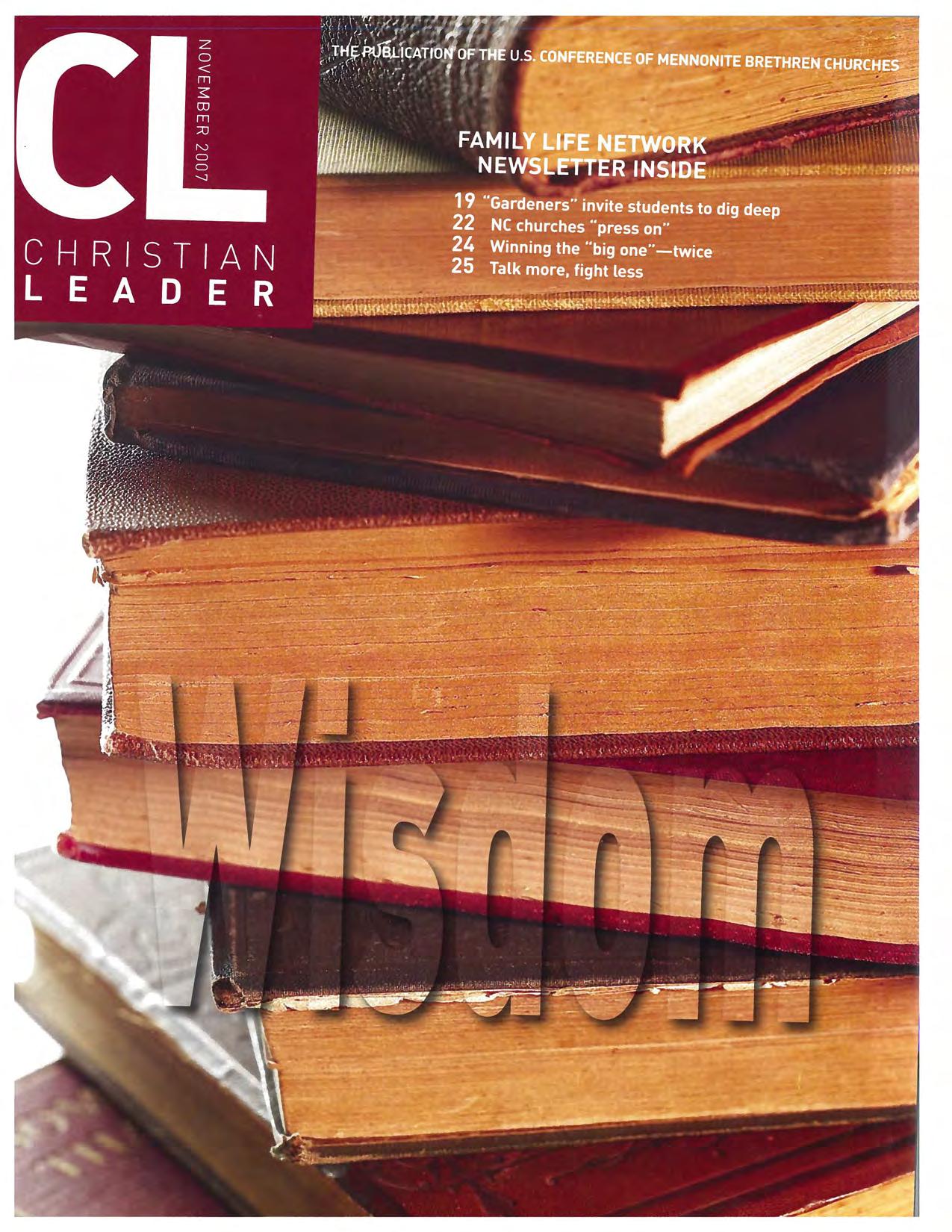




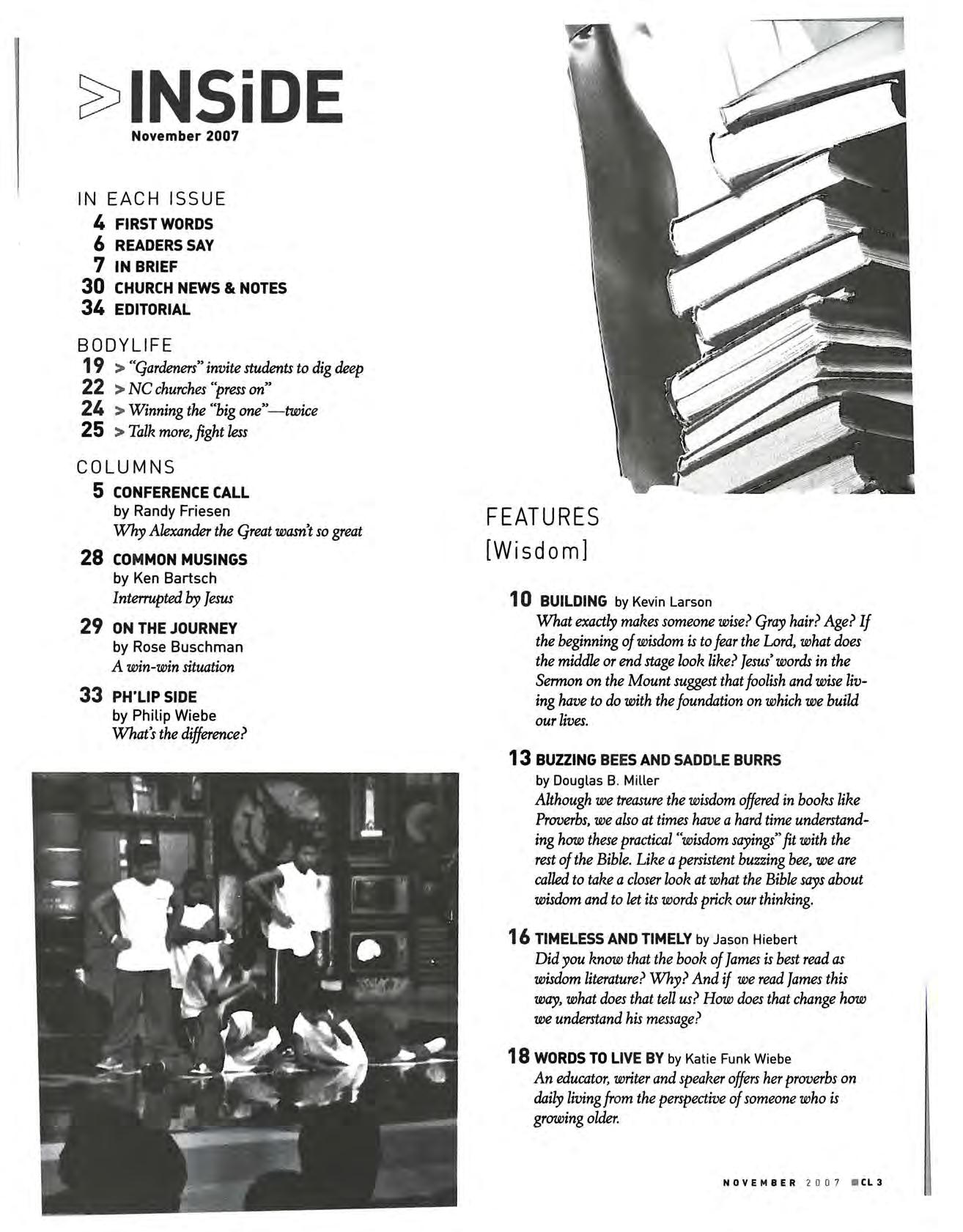
10 BUILDING by Kevin Larson
What exactly makes someone wise? Gray hair? Age? If the beginning of wisdom is to fear the Lord. what does the middle or end stage look like? Jesus' words in the Sermon on the Mount suggest that foolish and wise living have to do with the foundation on which we build our lives.
13 BUZZING BEES AND SADDLE BURRS by Douglas B Miller
Although we treasure the wisdom offered in books like Proverbs. we also at times have a hard time understanding how these practical "wisdom sayings" fit with the rest of the Bible. Like a persistent buzzing bee. we are called to take a closer look at what the Bible says about wisdom and to let its words prick our thinking.
16 TIMELESS AND TIMELY by Ja?on Hiebert
Did you know that the book of James is best read as wisdom literature? Why? And if we read James this way. what does that tell us? How does that change how we understand his message?
18 WORDS TO LIVE BY by Katie Funk Wiebe
An educator, writer and speaker offers her proverbs on daily living from the perspective of someone who is growing older.
LAsT MONTH THE U.S. CONFERENCE LEADERSHIP BOARD and USC staff members traveled to Abbotsford, BC, for the fall board meeting. While it's unusual to hold a national conference meeting in another country, there was a good reason for the trip. In 2000, the U.S. and Canadian Mennonite Brethren dissolved their joint conference, called the General Conference, and agreed to remain joint owners of three ministries: MB Biblical Seminary, MBMS International and the Historical Commission. Since that decision, the moderators and senior staff members of the two national conferences have met annually to hear reports from the three agencies.
At their 2006 meeting, national conference moderators Joe Johns ofthe U.S. and Jascha Boge of Canada agreed that it would be good for everyone who serves on the two governing boards to meet together. And that explains why the U.S group traveled to Canada. The timing of the Can/Am board meeting did not allow either the Leader or the MB Herald, the English-language publication of the Canadian Conference, to report on the event in our November issues. Both magazines will publish reports in December.
One of the Can/Am agenda items that generated considerable discussion was celebrating the 150th anniversary of the Mennonite Brethren Church in 2010. The International Community of Mennonite Brethren is overseeing the celebration events. One part of the celebration that is already underway is a written history of the global MB church family coordinated by the North American Historical Commission. During the discussion, Can/Am participants heard from ICOMB executive secretary Victor Wall about possible celebration options and did some brainstorming of their own.
One question that Can/Am participants debated was holding an actual birthday party. Specifically, should there be one big party or multiple parties? Advantages and disadvantages to both options were given and my initial reaction has been to favor multiple birthday parties. No conclusions were reached, other than suggesting to Wall that he explore with the other 16 national conferences which option is most appealing.
Regardless of the number of parties planned, our celebration will no doubt recognize the people and the theology and ideas that have shaped who Mennonite Brethren are today and that will guide our future. Within the worldwide Mennonite and Brethren in Christ fellowship, we Mennonite Brethren are unique because we are truly a global denomination, and that's worth celebrating. So for now, draw a big red circle on your calendar around the year 2010 and watch for more information.-CF
<There will be things we can affirm in culture, there will be things well have to reject in culture. But to the extent that culture is the product of human beings who bear God's image, there is the possibility that we11 see something of God's image reflected in culture."-Kevin Vanhoozer, chief editor of Everyday Theology in a Christianity Today interview.
• Nov. 2-3-Pacific District Conference Convention, Shafter, Calif.
• Feb. 1-3, 2008- Latin America District Conference convention
• July 23-25 , 2008-u s. Conference Pastors' Conference, Wichita, Kan
• July 25-2 7 , 2 008- u .s . Conferen ce convention, Hillsboro, Kan.
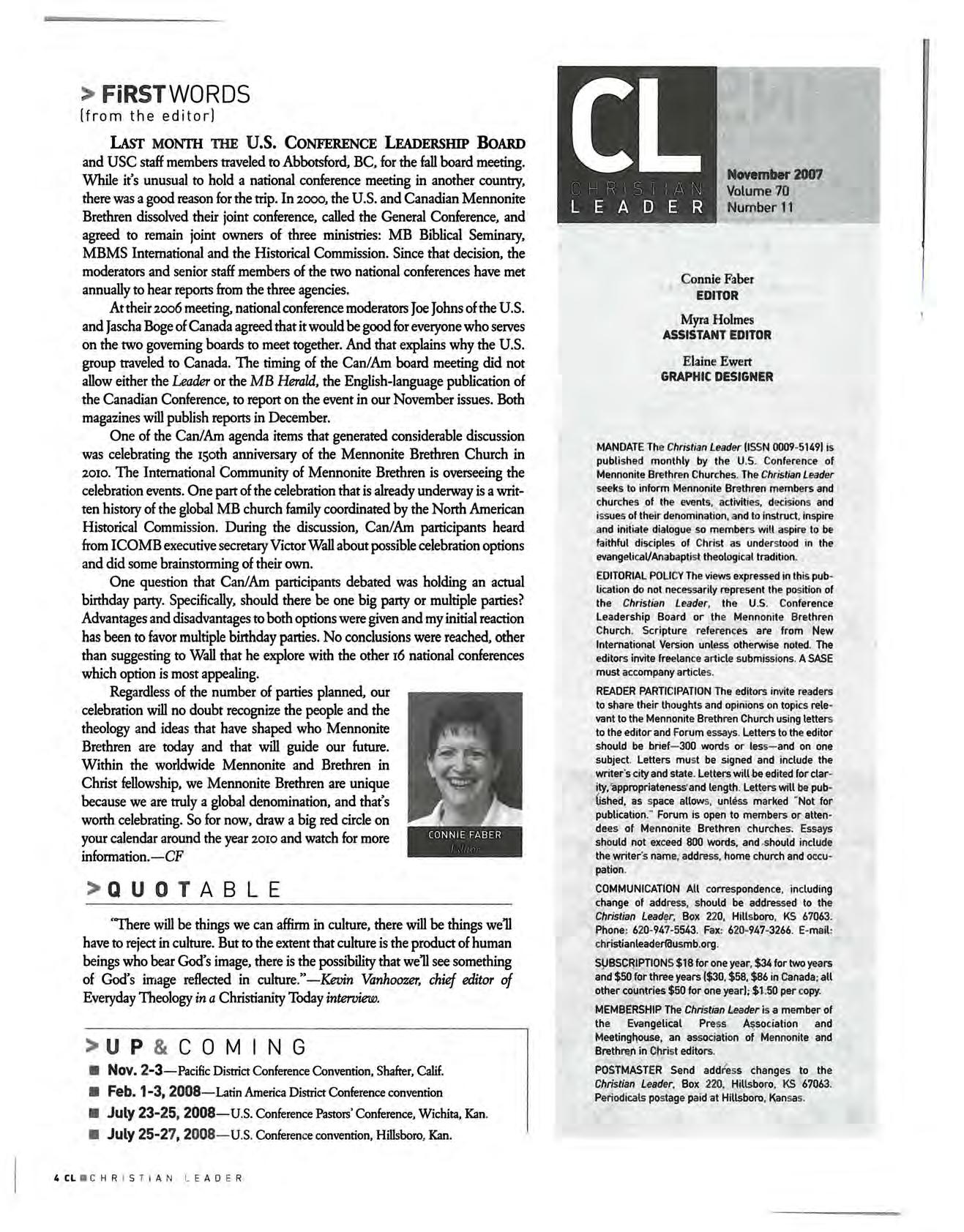
Connie Faber EDITOR
Myra Holmes ASSISTANT EDITOR
Elaine Ewert GRAPHIC DESIGNER
MANDATE Th e Christia n Leader USSN 0009- 5149\ is publi s h ed monthly by the U S Conference o f Mennonite Brethren Churches The Christian Leader seeks to inform Mennonite Brethren members and churches of the events, activi t ies, decis ions and i ssues of their denomination, and to instruct, inspire an d initiate dialogue so members witt aspire to be fai thful disciples of Christ as understood in the evangelicaVAnabapti st theological tradition
EDITORIAL POLICY The views expressed in th is publication do not necessarily represent the position of the Christian Leader, the U S Conference Leadership Board or th e Mennoni te Brethren Church Scripture reierences are from New International Version unless otherwise noted The editors invite freelance article submissions A SASE must accompany article s.
READER PARTICIPATION The editors invite readers to share their thoughts and opinions on topics relevant to the Mennonite Brethren Church using letters to the editor and Forum essays Letters to the editor should be brief- 300 words or less-and on one subject. Letters mu st be signed and include the writer's city and state Letters wilthe edited for clarity, 'appropriateness' and length Letters will be pubUshed, as space altows , unless marked " Not for publication: Forum is open to members or attendees of Mennonite Brethren churches. Essays shOUld not exceed 800 words, and .should include the writer's name, address home church and occupation
COMMUNICAnDN AU correspondence including change of address, should be addressed to the Christian /.eadllr, Box 220, Hills boro , KS 61063 Phone : 620 -947-5543 Fax: 620- 947-3266 E- mail : ch ristianleaderfClusmb org
$18 for one year, $34 for two years and $50 for three years ($30 $58, $86 in Canada ; all other countries $50 for one year!; $1 50 per copy.
MEMBeRSHIP The Christian Leader i s a member of the Evangelical Pre ss and Meetinghouse, an association of Mennonite and Brethrefl in OOri st editors
POSTMASTER Send addre ss changes to the Christian L-eader Sox 220, Hillsboro KS 67063 Pe r'iodicals postage paid at Hitl$boro, Kansas
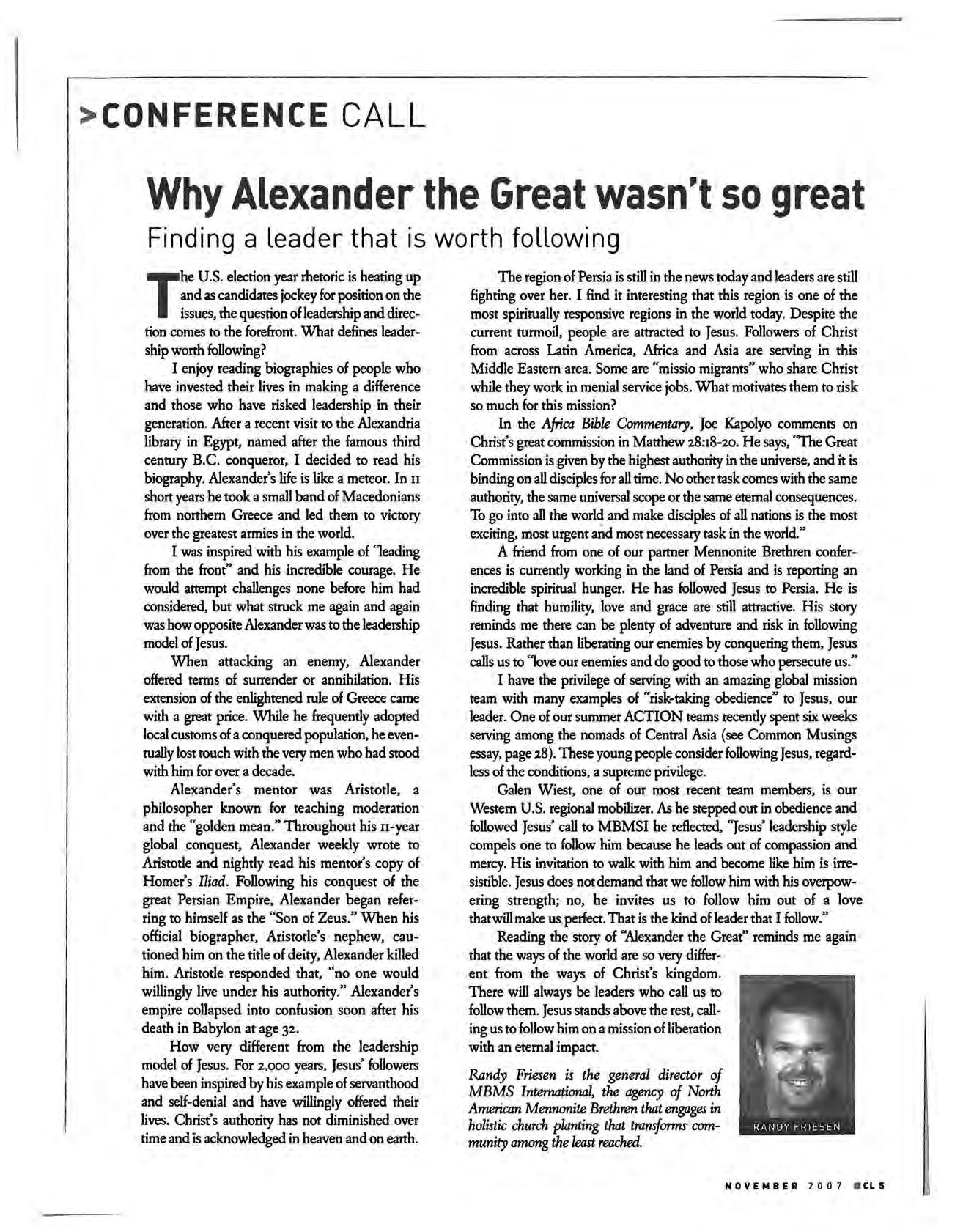
The u.s. election year rhetoric is heating up and as candidates jockey for position on the issues, the question ofleadership and direction comes to the forefront. What defines leadership worth following?
I enjoy reading biographies of people who have invested their lives in making a difference and those who have risked leadership in their generation. After a recent visit to the Alexandria library in Egypt, named after the famous third century B.C . conqueror, I decided to read his biography. Alexander's life is like a meteor. In II short years he took a small band of Macedonians from northern Greece and led them to victory over the greatest armies in the world.
I was inspired with his example of 'leading from the front" and his incredible courage. He would attempt challenges none before him had considered, but what struck me again and again was how opposite Alexander was to the leadership model of Jesus.
When artacking an enemy, Alexander offered terms of surrender or annihilation. His extension of the enlightened rule of Greece came with a great price. While he frequently adopted local customs of a conquered population, he eventually lost touch with the very men who had stood with him for over a decade.
Alexander's mentor was Aristotle, a philosopher known for teaching moderation and the "golden mean. " Throughout his II-year global conquest, Alexander weekly wrote to Aristotle and nightly read his mentor's copy of Homer's Iliad Following his conquest of the great Persian Empire, Alexander began referring to himself as the "Son of Zeus " When his official biographer, Aristotle's nephew, cautioned him on the title of deity, Alexander killed him . Aristotle responded that, "no one would willingly live under his authority." Alexander's empire collapsed into confusion soon after his death in Babylon at age 32.
How very different from the leadership model of Jesus. For 2,000 years, Jesus' followers have been inspired by his example of servanthood and self-denial and have willingly offered their lives. Christ's authority has not diminished over time and is acknowledged in heaven and on earth.
The region of Persia is still in the news today and leaders are still fighting over her. I find it interesting that this region is one of the most spiritually responsive regions in the world today. Despite the current turmoil, people are attracted to Jesus. Followers of Christ from across Latin America, Africa and Asia are serving in this Middle Eastern area. Some are "missio migrants" who share Christ while they work in menial service jobs. What motivates them to risk so much for this mission?
In the Africa Bible Commentary, Joe Kapolyo comments on Christ's great commission in Marthew 28:18-20 He says, 'The Great Commission is given by the highest authority in the universe, and it is binding on all disciples for all time No other task comes with the same authority, the same universal scope or the same eternal consequences To go into all the world and make disciples of all nations is the most exciting, most urgent and most necessary task in the world."
A friend from one of our partner Mennonite Brethren conferences is currently working in the land of Persia and is reporting an incredible spiritual hunger. He has followed Jesus to Persia. He is finding that humility, love and grace are still attractive. His story reminds me there can be plenty of adventure and risk in following Jesus. Rather than liberating our enemies by conquering them, Jesus calls us to 'love our enemies and do good to those who persecute us."
I have the privilege of serving with an amazing global mission team with many examples of "risk-taking obedience" to Jesus, our leader. One of our summer ACTION teams recently spent six weeks serving among the nomads of Central Asia (see Common Musings essay, page 28). These young people consider following Jesus, regardless of the conditions, a supreme privilege.
Galen Wiest, one of our most recent team members, is our Western u.S. regional mobilizer. As he stepped out in obedience and followed Jesus' call to MBMSI he reflected, 'Jesus' leadership style compels one to follow him because he leads out of compassion and mercy. His invitation to walk with him and become like him is irresistible. Jesus does not demand that we follow him with his overpowering strength; no, he invites us to follow him out of a love that will make us perfect. That is the kind of leader that I follow."
Reading the story of the Great" reminds me again that the ways of the world are so very different from the ways of Christ's kingdom. There will always be leaders who call us to follow them. Jesus stands above the rest, calling us to follow him on a mission of liberation with an eternal impact.
Randy Friesen is the general director of MBMS International, the agency of North American Mennonite Brethren that engages in holistic church planting that transforms community among the least reached.
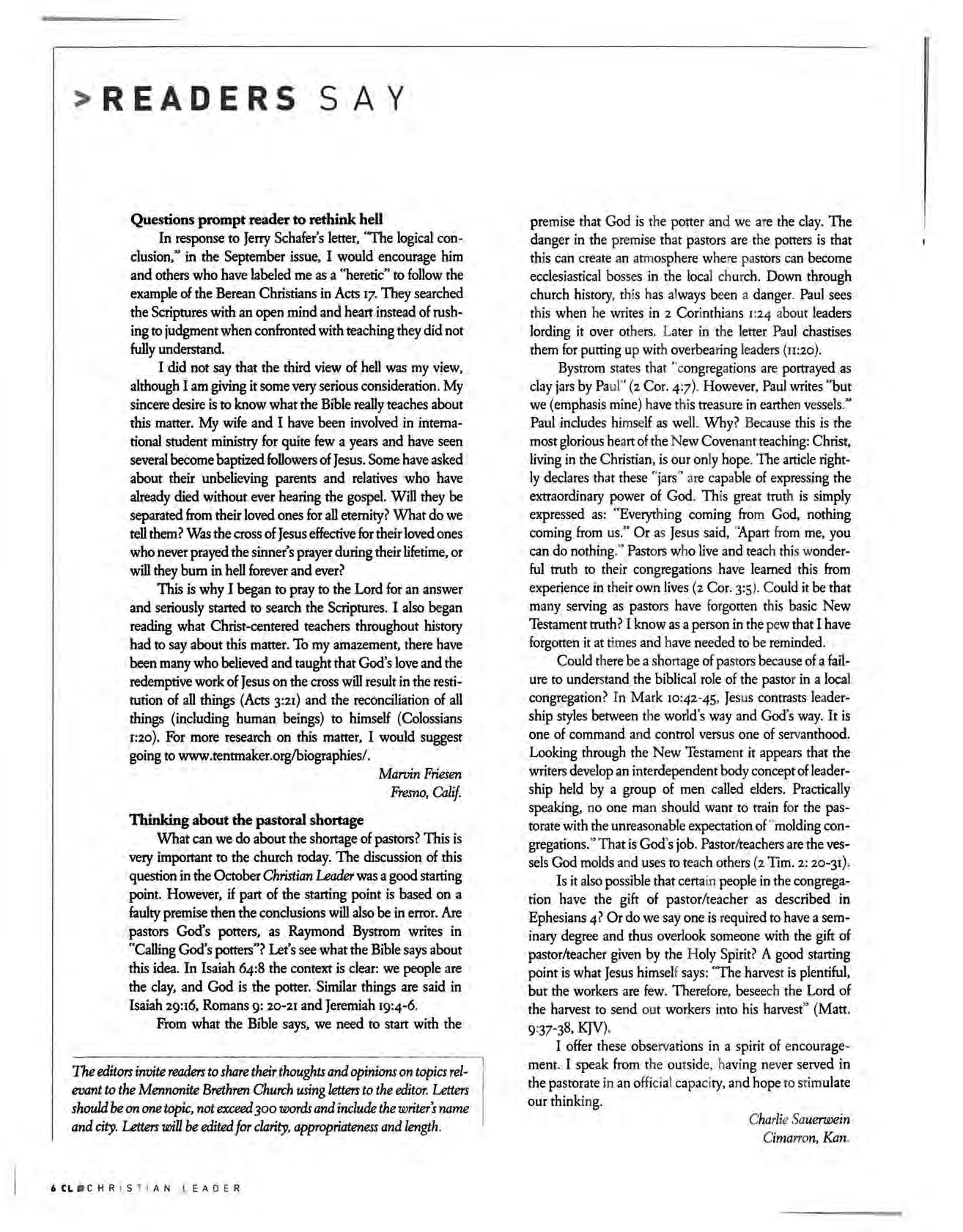
In response to Jerry Schafer's letter, 'The logical conclusion," in the September issue, I would encourage him and others who have labeled me as a "heretic" to follow the example of the Berean Christians in Acts 17. They searched the Scriptures with an open mind and heart instead of rushing to judgment when confronted with teaching they did not fully understand
I did not say that the third view of hell was my view, although I am giving it some very serious consideration. My sincere desire is to know what the Bible really teaches about this matter. My wife and I have been involved in international student ministry for quite few a years and have seen several become baptized followers of Jesus . Some have asked about their unbelieving parents and relatives who have already died without ever hearing the gospel. Will they be separated from their loved ones for all eternity? What do we tell them? Was the cross of Jesus effective for their loved ones who never prayed the sinner's prayer during their lifetime, or will they bum in hell forever and ever?
This is why I began to pray to the Lord for an answer and seriously started to search the Scriptures. I also began reading what Christ-centered teachers throughout history had to say about this matter. To my amazement, there have been many who believed and taught that God's love and the redemptive work of Jesus on the cross will result in the restitution of all things (Acts 3:21) and the reconciliation of all things (including human beings) to himself (Colossians 1:20). For more research on this matter, I would suggest going to www.tentmaker orglbiographies/.
Marvin Friesen Fresno, Calif
Thinking about the pastoral shortage
What can we do about the shortage of pastors? This is very important to the church today. The discussion of this question in the October Christian Leader was a good starting point. However, if part of the starting point is based on a faulty premise then the conclusions will also be in error. Are pastors God's potters, as Raymond Bystrom writes in "Calling God's potters"? Let's see what the Bible says about this idea. In Isaiah 64:8 the context is clear: we people are the clay, and God is the potter. Similar things are said in Isaiah 29:16, Romans 9: 20-21 and Jeremiah 19:4-6
From what the Bible says, we need to start with the
The editors invite readers to share their thoughts and opinions on topics relevant to the Mennonite Brethren Church using letters to the editor. Letters should be on one topic, not exceed 300 words and include the writer's name and city. Letters will be edited for clarity, appropriateness and length
pre mise that God is the potter an d we are the clay The danger in the prem ise th at pastors are the potters is that th is can create an atmosphere where pastors can become eccles iastical bosses in the local ch urch. Down through church history, th is has al ways been a dan ger. Paul sees this when he writes in 2 Corinthi an s 1:24 about leaders lording it over others La ter in the letter Pa ul chastises them for putting up with overbea rin g leaders (n:20).
Bystrom states that "congregations are portrayed as clay jars by Pa ul" (2 Cor. 4 :7) However, Paul writes "but we (emphasis mine) have thi s treas ure in earthen vessels ." Paul includes hi msel f as well . Why? Because this is the most glorious heart of the New Covena nt teaching: Christ, living in the C hristian, is our only hope The article rightly declares tha t these " jars " are cap able of expressing the extraordinary power of God. Th is great truth is simply expressed as: "Everything coming fro m God, nothing coming from us." Or as Jesus said, fr om me, you can do nothi ng." Pastors who live and teach thi s wonderful trut h to the ir con gregations have learned th is from experience in their own lives (2 Cor 3:5 ) Could it be that ma ny serving as pastors have for gotten this basic New Testament truth? I know as a person in the pew that I have forgotten it at tim es and have needed to be reminded . Could there be a sho rtage of pastors because of a failure to unde rs tand the biblical role of the pastor in a local congregation? I n Ma rk 10:42-45 , Jes us contrasts leadership styles between the wo rld's way and God's way. It is one of command and control versus one of servanthood Looking through the New Testament it appears that the writers develop an interdependent body concept of leadership held by a group of men called elders. Practically speaking, no one ma n should want to train for the pastorate with the unreasonable expectation of "molding congregations. " Th at is God's job Pastor/teachers are the vessels God molds and uses to teac h othe rs (2 Tim. 2: 20-31).
Is it also possible that certa in people in the congregation have the gift of pastor/teacher as described in Ephesians 4? Or do we say one is required to have a seminary degree and thus overlook someone with the gift of pastor/teacher given by the H oly Spirit? A good starting point is what Jesus himself says: "The harvest is plentiful, but the workers are few. Therefore , beseech the Lord of the harvest to send ou t workers into his harvest" (Matt. 9 :37-38, KJV)·
I offer these obse rvations in a spirit of encou ragement I spe ak from the outsid e, hav ing never served in the pastorate in an off ici al ca pacity, and hope to stim ulate our think in g.
Cha rli e Sa uerwein Cima"o n. Kan .
students last year. The Wichita location offers a master's in business administration as well as degree-completion programs in business administration, Christian ministry and nursing.
Preliminary fall enrollment numbers are in for the Mennonite Brethren college and university in the U.S., with both reporting a decline in th e number of
traditional undergradu ate stu dents but growth in graduate and degree completion programs.
At Tabor College, the MB libe ral arts college, enrollment at the Hillsboro, Kan., campus after 20 days of classes stood at a full-time equiva lent of 457 students, compared to 480 last year. At the same time, enrollment at a second Tabor location in Wichita, Kan., showed a significant increase, with a full-ti me equivalent of 81 students, compared to 73
Enrollment at Fresno Pacific University, the MB university with a main campus in Fresno, Calif., and satellite campuses in Visalia, Bakersfield and North Fresno, Calif., reflected a similar trend. FPU reports 652 students in the degree-completion programs, a 32 percent increase over last year's 494. Graduate enrollment is up 9 percent, to 781 from 719. At the same time, traditional undergraduate enrollment as of the 16-dayofficial count dropped 5 percent to 944, compared to 998 last year.
FPU says the drop in undergraduate enrollment is in line with national trends. President D. Merrill Ewert says, 'We expected challenges with traditional undergraduate enrollment, due to a declining number of graduating high school seniors. Many colleges and universities are feeling the pinch, and we are working on new ways to address the issue."
At the same time, Ewert says the university is celebrating the growth in graduate and degree-completion programs. 'These people are crucial to the future of our region, which has a great need for the kind of professionally prepared and ethical leaders FPU is known for producing." he says.-TC, FPU
Vietn am's nation al Religi ous Affair s Committee presell ted a "Certificate fo r Religious Activities" to the Vietnam Mennonite C hurch in Ho C hi Minh C ity Oct. 2 in a ceremony to mark the oc casi on. The document recogni zes the church 's purpose to "worship the triu ne God and love all people accordi ng to the Word of the Lord in the Holy Bible, live the gospel, serve God, serve the country and th e people."
The cere mony mark ed a significant development in a process that ch urch pres ident Nguyen Qua ng Tru ng ha s pu rsued for two decades. Tru ng ha s bee n related to this church since 1965 Political developm ents after the 1975 revolution made it di ffi cult fo r the church to conti nue meeting Wh en gov-
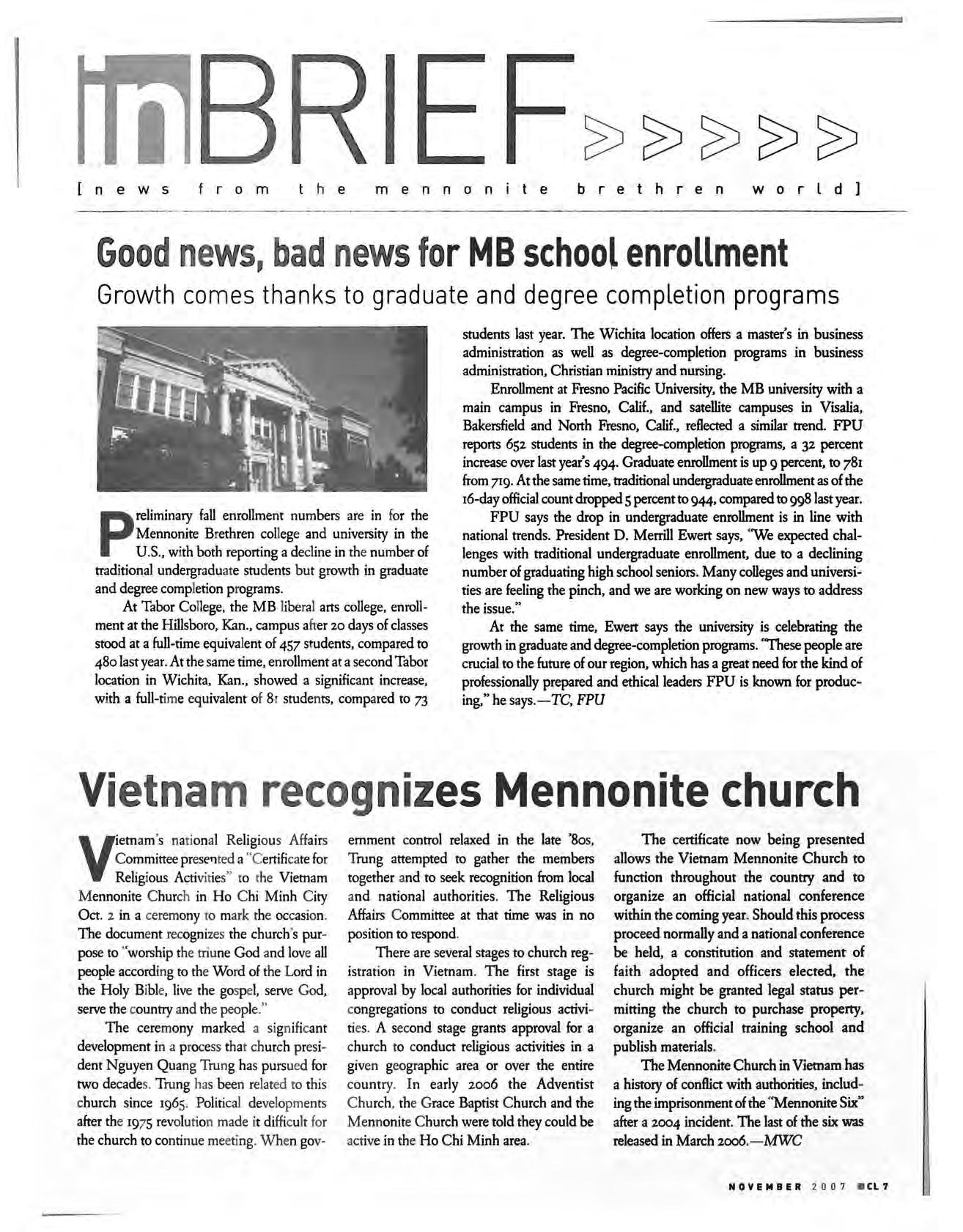
emment control relaxed in the late '80s, Trung attempted to gather the members together and to seek recognition from local and national authorities The Religious Affairs Committee at that time was in no position to respond
There are several stages to church registration in Vietnam The first stage is approval by local authorities for individual congregations to conduct religious activiti es A second stage grants approval for a church to conduct religious activities in a given geo graphic area or over the entire co unt ry . I n early 2006 the Adventist C hu rch , th e Grace Baptist Church and the Me nnonite C hurch were told they could be active in th e Ho Chi Minh area
The certificate now being presented allows the Vietnam Mennonite Church to function throughout the country and to organize an official national conference within the coming year. Should this process proceed normally and a national conference be held, a constitution and statement of faith adopted and officers elected. the church might be granted legal status permitting the church to purchase property, organize an official training school and publish materials .
The Mennonite Church in Vietnam has a history of conflict with authorities, including the imprisonment of the "Mennonite Six" after a 2004 incident. The last of the six was released in March 2006 .- MWC
S· ix missionary training candidates. including three Americans. and 17
TREK team members are currently preparing for assignments with MBMS International. The 23 missionaries are training to go to Burkina Faso. Germany. Mexico. Panama and Thailand.
Participants in the Missionary Training Institute include Sandy Fender. of Rapid City. SD. who hopes to join the Hope 4 Thailand team in a hospitality capacity. overseeing the guestltraining house in North Thailand. Krista DeBoer. Chicago. m.. is hoping to join the MBMSI church-planting team in Burkino Faso. The assignment for Stacey Kuhns of Enid. Okla.• has not been finalized. Mark and Amy Loewen. Altona. Man.. and Erica Ray. Crane Valley. Sask.. are the other three missionary training candidates. MTI includes training modules taught by MBMSI staff and guests. mentoring. involvement in a church plant. seminary
studies and 13 weeks in a missionary training center.
TREK is a six- to lo-month crosscultural internship designed to serve as an entry point to longer term missionary service or significant home church service. The new TREK participants include Pratana Limngen. Angelica Born Amanda Reimer. Andrew Regehr. Chris Schindel, Fred Sutherland. Michelle Hood. Jillian Wiebe. Laura Achtymichuk. JohnMark Bergen. Fauna Acker. Natalie Foth. Nicole Penner. Kenton and Kidron Miller. Diana Price and Jonathan Harris.
MBMSI has also recently hired Al Stobbe as the missionary coordinator on the Global Program Team. Stobbe and his wife Karen served with MBMSI as missionaries in Austria from 1990-1996 and most recently Al has been an associate pastor at Ross Road MB Church. Abbotsford, BC.-MBMSI e-newsletter
Arli Klassen has been chosen as the next executive director of Mennonite Central Committee. taking leadership of the organization's relief. development and peace-building work in more than 50 countries. Klassen comes to the position after serving for the past eight years as the executive director of MCC Ontario. She will be the first woman to serve as the executive director of MCC in the organization's 87-year history.
"I'm very excited for MCC with the hiring of ArIi." says Ron Dueck. MCC's board chair. "Her work in Ontario has shown her to be an excellent administrator. forging strong links with the churches and developing leadership in visioning and guiding MCC in its mission."
Klassen's appointment follows 16 years of service with MCC in Africa. the
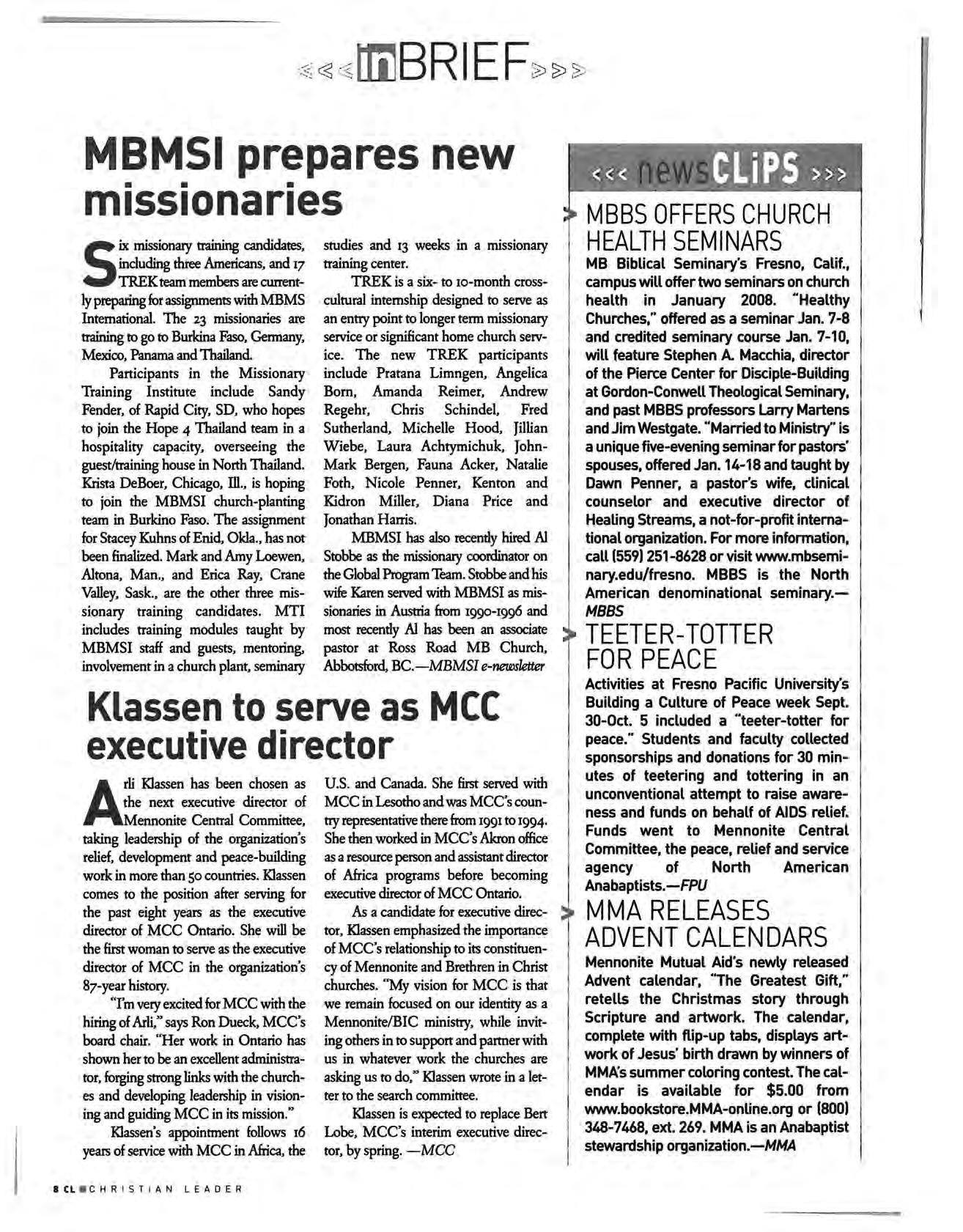
U.S and Canada. She first served with MCC in Lesotho and was MCC's country representative there from 1991 to 1994. She then worked in MCC's Akron office as a resource person and assistant director of Aftica programs before becoming executive director of MCC Ontario.
As a candidate for executive director. Klassen emphasized the importance of MCC's relationship to its constituency of Mennonite and Brethren in Christ churches. "My vision for MCC is that we remain focused on our identity as a MennoniteIBIC ministry. while inviting others in to support and partner with us in whatever work the churches are asking us to do." Klassen wrote in a letter to the search committee.
Klassen is expected to replace Bert Lobe. MCC's interim executive director. by spring. -MCC
MB Biblical Seminary's Fresno, Calif., campus will offer two seminars on church health in January 2008. "Healthy Churches," offered as a seminar Jan. 7-8 and credited seminary course Jan. 7-10, will feature Stephen A. Macchia, director of the Pierce Center for Disciple-Building at Gordon-Conwell Theological Seminary, and past MBBS professors Larry Martens and Jim Westgate. "Married to Ministry" is a unique five-evening seminar for pastors' spouses, offered Jan. 14-18 and taught by Dawn Penner, a pastor's wife, clinical counselor and executive director of Healing Streams, a not-for-profit international organization. For more information, call (559) 251-8628 or visit www.mbseminary.edu/fresno. MBBS is the North American denominational seminary.14885
Activities at Fresno Pacific University's Building a Culture of Peace week Sept. 5 included a "teeter-totter for peace." Students and faculty collected sponsorships and donations for 30 minutes of teetering and tottering in an unconventional attempt to raise awareness and funds on behalf of AIDS relief. Funds went to Mennonite Central Committee, the peace, relief and service agency of North American Anabaptists.-FPU
Mennonite Mutual Aid's newly released Advent calendar, "The Greatest Gift," retells the Christmas story through Scripture and artwork. The calendar, complete with flip-up tabs, displays artwork of Jesus' birth drawn by winners of MMA's summer coloring contest. The calendar is available for $5.00 from www.bookstore.MMA-online.org or (800) 348-7468, ext. 269. MMA is an Anabaptist stewardship organization.-MMA
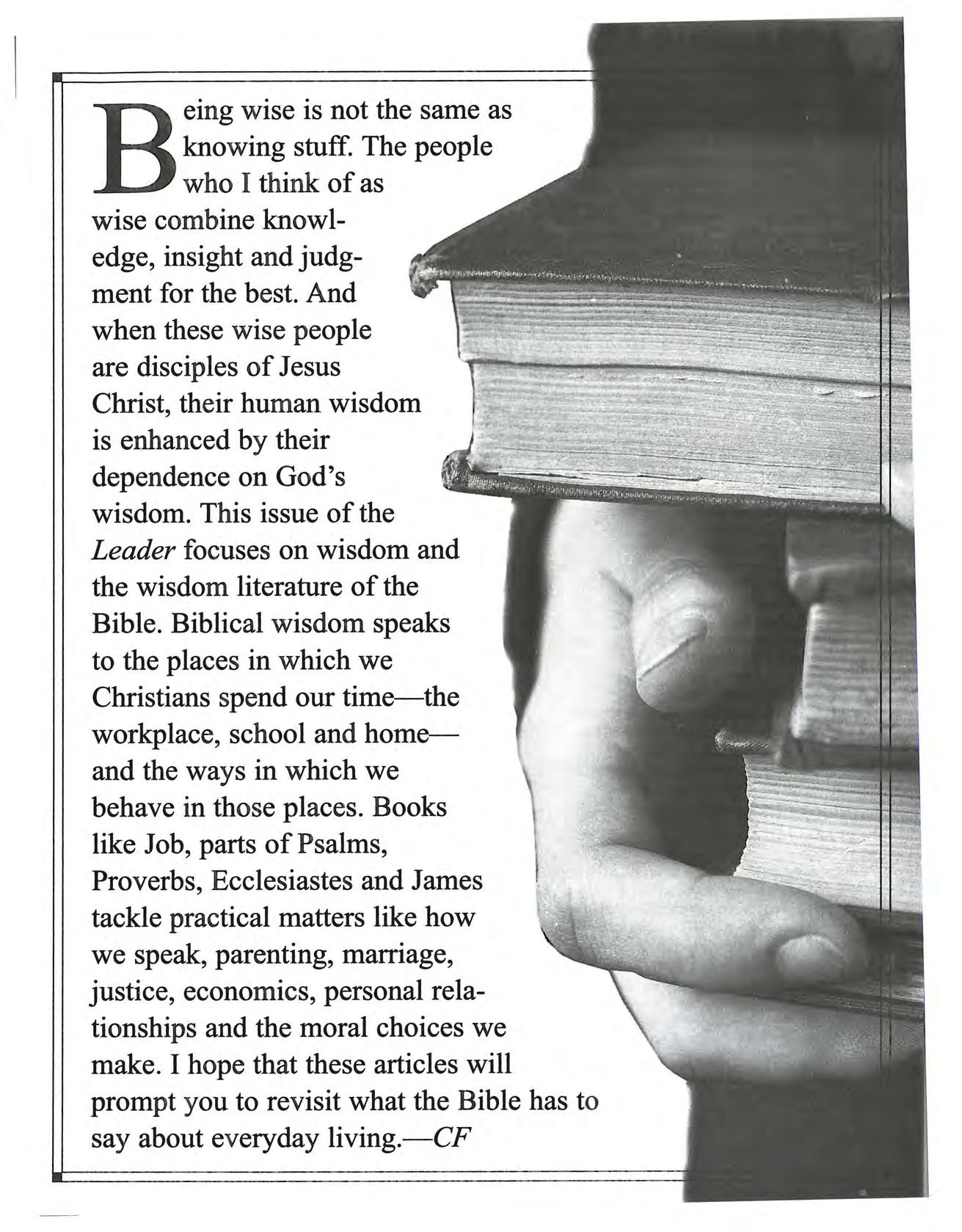
Being wise is not the same as knowing stuff. The people who I think of as wise combine knowledge, insight and judgment for the best. And when these wise people are disciples of Jesus Christ, their human wisdom is enhanced by their dependence on God's wisdom. This issue of the Leader focuses on wisdom and the wisdom literature of the Bible. Biblical wisdom speaks to the places in which we Christians spend our time-the workplace, school and homeand the ways in which we behave in those places. Books like Job, parts of Psalms, Proverbs, Ecclesiastes and James tackle practical matters like how we speak, parenting, marriage, justice, economics, personal relationships and the moral choices we make. I hope that these articles will prompt you to revisit what the Bible has t o say about everyday living.-CF
<;<;Therefore everyone who hears these words of mine and puts them into practice is like a wise man who built his house on the rock. The rain came down, the streams rose, and the winds blew and beat against that house; yet it did not fall, because it had its foundation on the rock. But everyone who hears th ese words of mine and does not put them into practice is like a foolish man who built his house on sand. The rain came down, the streams rose, and th e winds blew and beat against that house, and it fell with a great crash" (Matt. 7:24 - 27) .
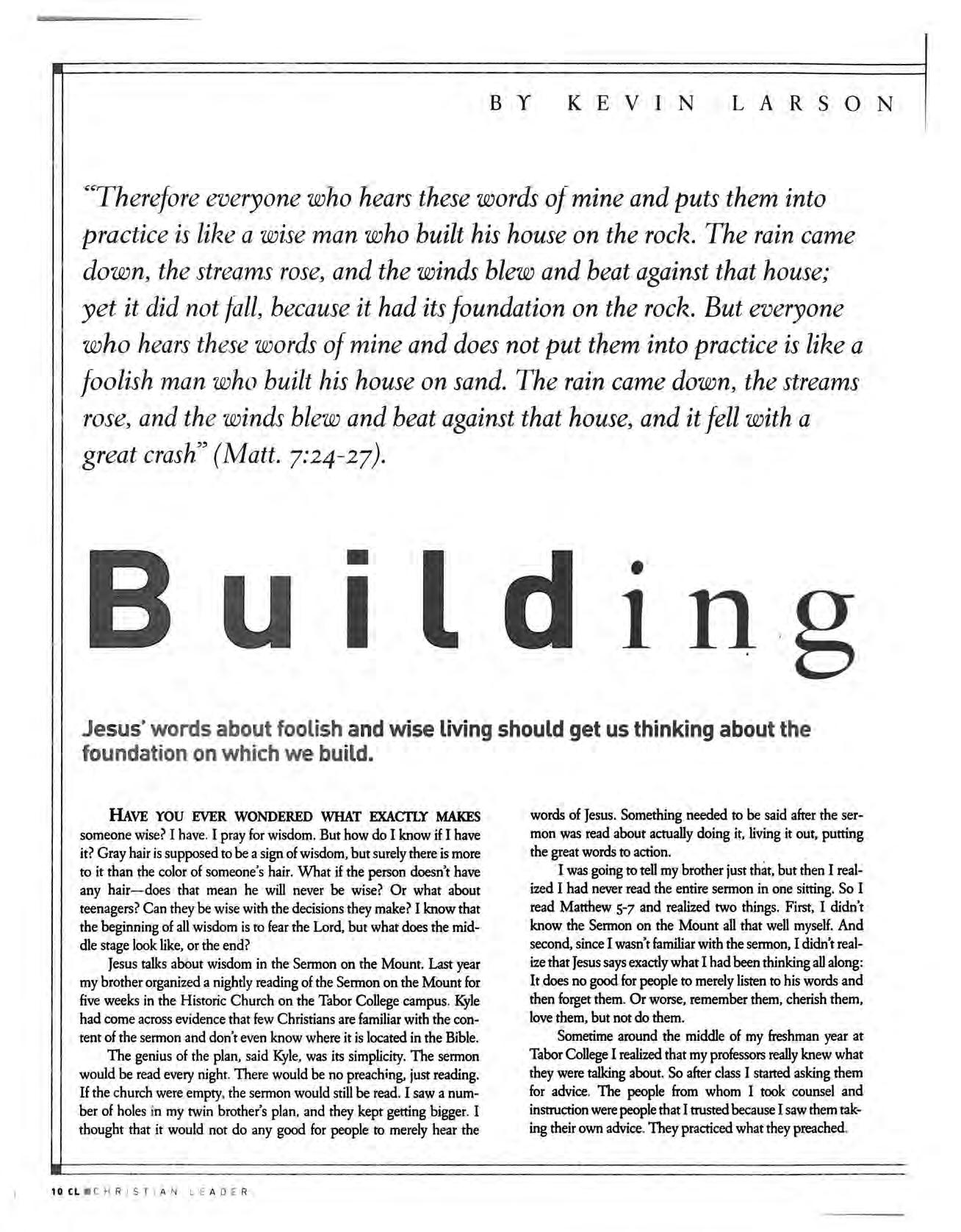
Je sus' words about fooli sh and wise living should get us thinking about the foundation on which we bu ild.
HAVE YOU EVER WONDERED WHAT EXAGnY MAKES someone wise? I have . I pray for wisdom. But how do I know if I have it? Gray hair is supposed to be a sign of wisdom, but surely there is more to it than the color of someone's hair. What if the person doesn't have any hair-does that mean he will never be wise? Or what about teenagers? Can they be wise with the decisions they make? I know that the beginning of all wisdom is to fear the Lord, but what does the middle stage look like, or the end?
Jesus talks about wisdom in the Sermon on the Mount. Last year my brother organized a nightly reading of the Sermon on the Mount for five weeks in the Historic Church on the Tabor College campus . Kyle had come across evidence that few Christians are familiar with the content of the sermon and don't even know where it is located in the Bible. The genius of the plan, said Kyle, was its simplicity. The sermon would be read every night There would be no preaching, just reading. If the church were empty, the sermon would still be read. I saw a number of holes in my twin brother's plan , and they kept getting bigger. I thought that it would not do any good for people to merely hear the
words of Jesus. Something needed to be said after the sermon was read about actually doing it, living it out, putting the great words to action.
I was going to tell my brother just that, but then I realized I had never read the entire sermon in one sitting. So I read Matthew 5-7 and realized two things. First, I didn't know the Sermon on the Mount all that well myself. And second, since I wasn't familiar with the sermon, I didn't realize that Jesus says exactly what I had been thinking all along: It does no good for people to merely listen to his words and then forget them Or worse, remember them, cherish them, love them, but not do them.
Sometime around the middle of my freshman year at Tabor College I realized that my professors really knew what they were talking about. So after class I started asking them for advice The people ftom whom I took counsel and instruction were people that I trusted because I saw them taking their own advice . They practiced what they preached.
I thought I had discovered how to become wise: choose humility and ask others for wisdom . While I still think asking is a big part of becoming wise, there is also some foolishness in that thinking. I will not be wise merely because I ask for advice and listen to it. I need to follow the advice I am given.
Jesus concludes the Sermon on the Mount with a story (Matt. 7:2427) that challenges his listeners to be doers, not just hearers, of his words. Jesus says, "Picture this: You've got two guys and they are both building houses. The guys look pretty much the same and even the houses look pretty much the same But one of the guys is a fool and the other guy is wise."
So what made the one a fool? It wasn't the appearance of his house. A fool can build a grand house because a fool is not necessarily stupid. The two houses do not represent good and bad construction practices but wise and foolish choices of a site. The foolish man builds as well as the wise man but makes the incredible mistake of erecting his house on the sands of a wadi, the dry bed of a seasonal river.
When the rainy season arrives with its violent storms, a wild torrent rushes down the wadi from the hills and engulfs the house. The
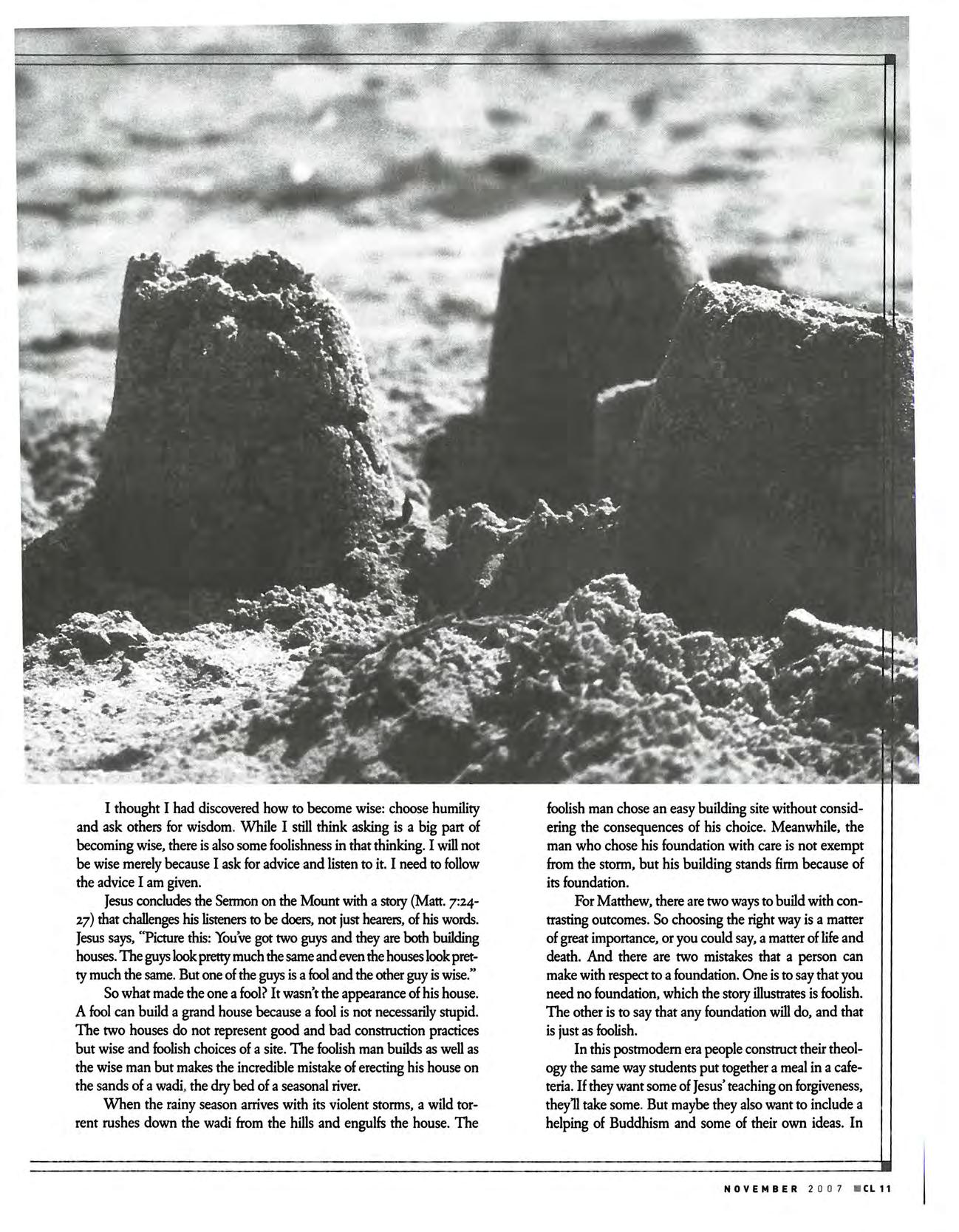
foolish man chose an easy building site without considering the consequences of his choice. Meanwhile, the man who chose his foundation with care is not exempt from the storm, but his building stands firm because of its foundation.
For Matthew, there are two ways to build with contrasting outcomes. So choosing the right way is a matter of great importance, or you could say, a matter of life and death. And there are two mistakes that a person can make with respect to a foundation. One is to say that you need no foundation, which the story illustrates is foolish. The other is to say that any foundation will do, and that is just as foolish.
In this posrmodem era people construct their theology the same way students put together a meal in a cafeteria. If they want some of Jesus' teaching on forgiveness, theyll take some But maybe they also want to include a helping of Buddhism and some of their own ideas. In
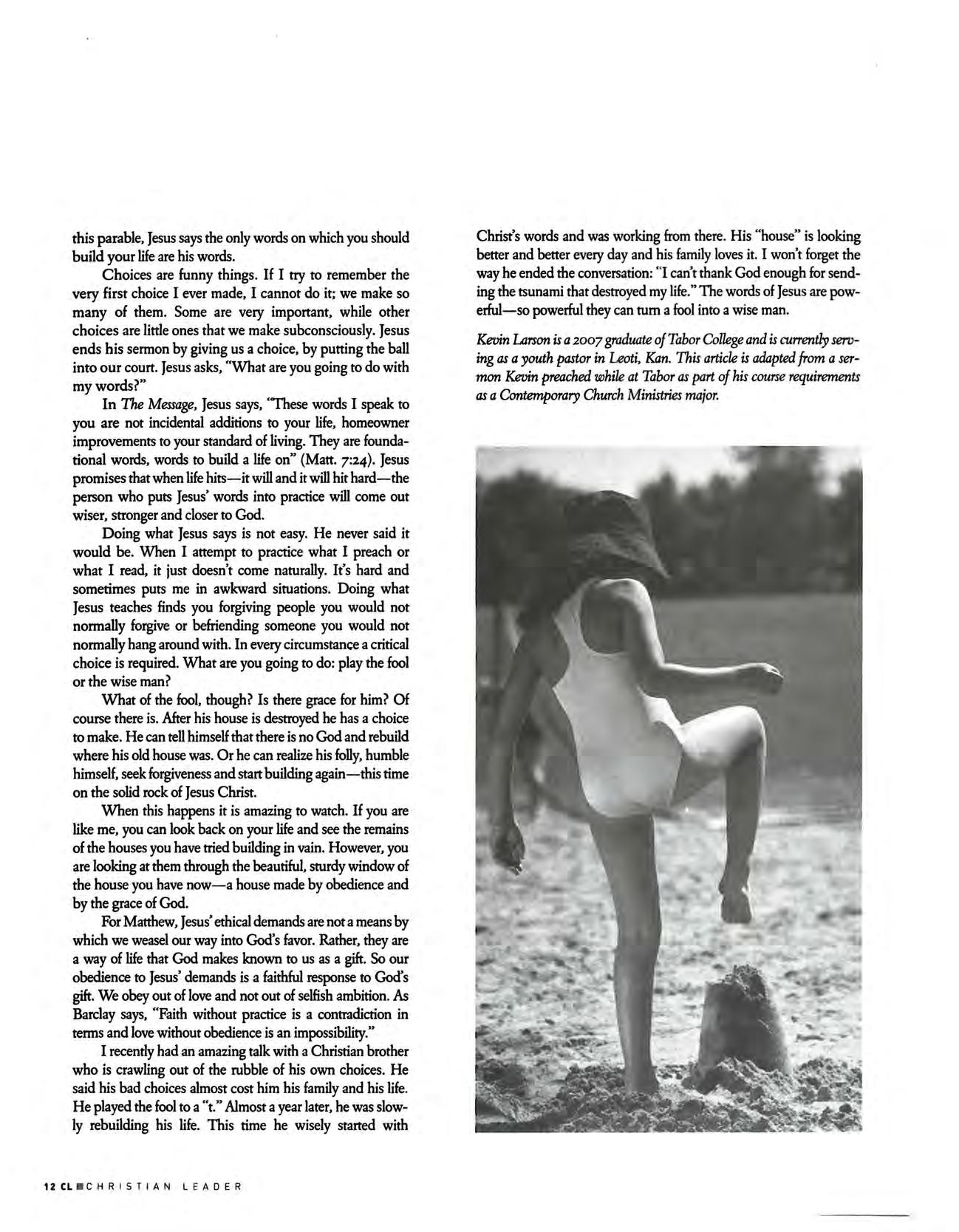
this parable, Jesus says the only words on which you should build your life are his words.
Choices are funny things. If I try to remember the very first choice I ever made, I cannot do it; we make so many of them. Some are very important, while other choices are little ones that we make subconsciously. Jesus ends his sermon by giving us a choice, by putting the ball into our coutt. Jesus asks, "What are you going to do with my words?"
In The Message, Jesus says, 'These words I speak to you are not incidental additions to your life, homeowner improvements to your standard of living. They are foundational words, words to build a life on" (Matt. 7:24). Jesus promises that when life hits-it will and it will hit hard-the person who puts Jesus' words into practice will come out wiser, stronger and closer to God.
Doing what Jesus says is not easy. He never said it would be. When I attempt to practice what I preach or what I read, it just doesn't come naturally. It's hard and sometimes puts me in awkward situations. Doing what Jesus teaches finds you forgiving people you would not normally forgive or befriending someone you would not normally hang around with. In every circumstance a critical choice is required. What are you going to do: play the fool or the wise man?
What of the fool, though? Is there grace for him? Of course there is. After his house is destroyed he has a choice to make. He can tell himself that there is no God and rebuild where his old house was. Or he can realize his folly, humble himself, seek forgiveness and start building again-this time on the solid rock of Jesus Christ.
When this happens it is amazing to watch. If you are like me, you can look back on your life and see the remains of the houses you have tried building in vain. However, you are looking at them through the beautiful, sturdy window of the house you have now-a house made by obedience and by the grace of God.
For Matthew, Jesus' ethical demands are not a means by which we weasel our way into God's favor. Rather, they are a way of life that God makes known to us as a gift. So our obedience to Jesus' demands is a faithful response to God's gift. We obey out of love and not out of selfish ambition As Barclay says, "Faith without practice is a contradiction in terms and love without obedience is an impossibility."
I recently had an amazing talk with a Christian brother who is crawling out of the rubble of his own choices. He said his bad choices almost cost him his family and his life He played the fool to a "t." Almost a year later, he was slowly rebuilding his life. This time he wisely started with
Christ's words and was working from there. His "house" is looking better and better every day and his family loves it. I won't forget the way he ended the conversation: "I can't thank God enough for sending the tsunami that destroyed my life " The words of Jesus are powerful-so powerful they can tum a fool into a wise man.
Kevin Larson is a 2007 graduate of Tabor College and is currently serving as a youth pastor in Leoti, Kan This article is adapted from a sermon Kevin preached while at Tabor as part of his course requirements as a Contemporary Church Ministries maioT.
Taking a closer look at wisdo m In t h e Bibl e
WISDOM PORTIONS IN THE BIBLE ARE among some of the most treasured Scriptures. Here are two examples:
''Trust in the LORD with an your heart and lean not on your own understanding; in an your ways submit to him, and he will make your paths straight" (Prov 3:5- 6)
"Blessed are those who do not walk in step with the wicked or stand in the way that sinners take or sit in the company of mockers, but who delight in the law of the LORD and meditate on his law day and night" (Ps. 1:1-2)
Yet believers often have a hard time understanding how wisdom, with its focus upon earthly, practical matters, fits in with the rest of the Bible . Like a persistent buzzing sound, it calls us to take a closer look.
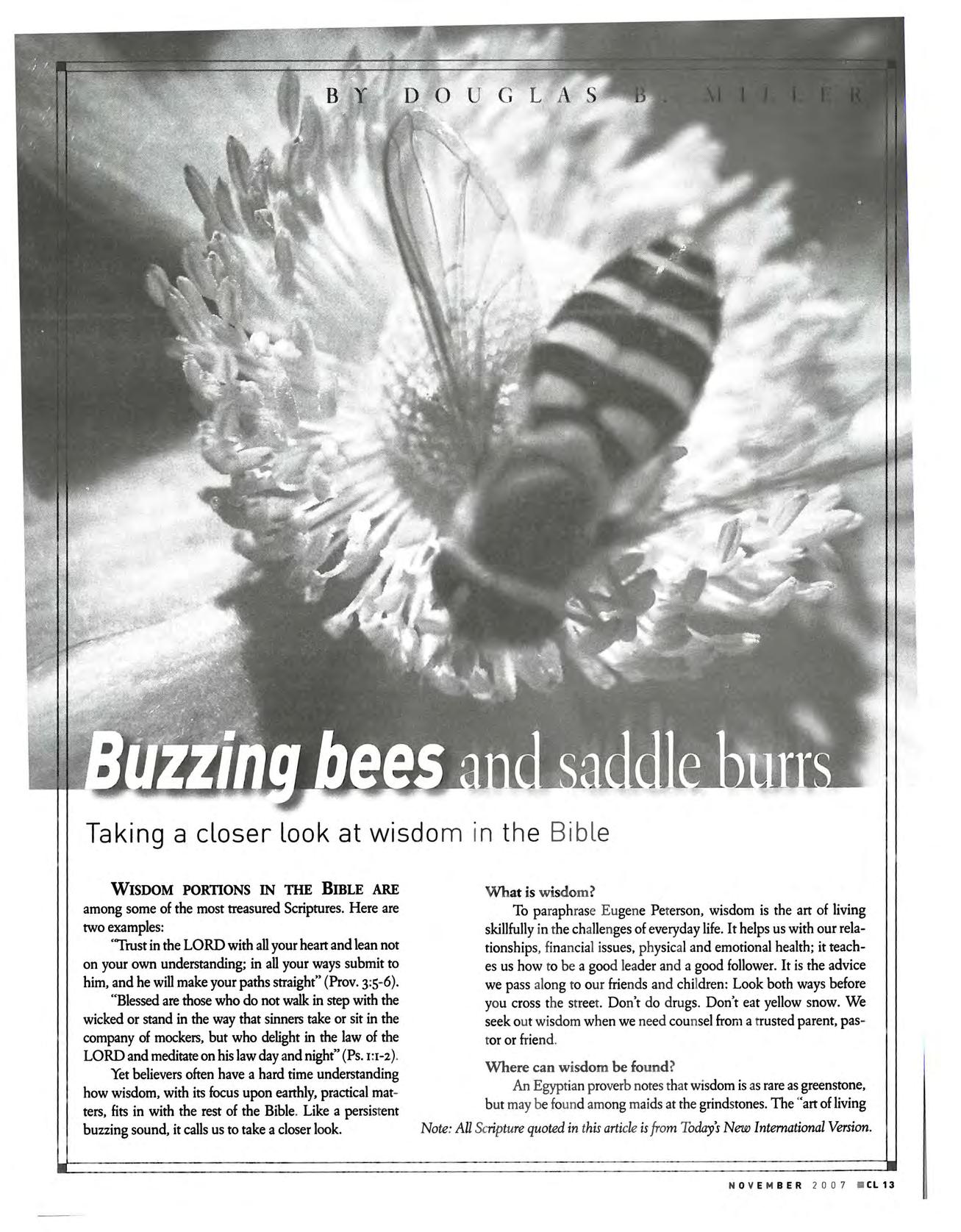
What is wisd om ?
To pa raph ras e Eu ge ne Peterson, wisdom is the art of living skillfully in the ch alle nges of everyday life. It helps us with our relationships, fi na ncia l issues , physic al and emotional health; it teaches us how to be a good leader and a good follower. It is the advice we pass al ong to our frie nd s and ch il dren : Look both ways before you cross the street Do n't do dru gs. Don 't eat yellow snow. We seek out wisdom when we need cou nsel from a trusted parent, pastor or fr ie nd .
Where can w isdom be found?
An Egyptian proverb notes that wi sdom is as rare as greenstone , b ut may be foun d among maids at the grindstones. The "art of living
Note : A ll Scri pture quo ted in this arti cle is fro m Today's New International Version .
skillfully" is found throughout the world. across time and culture. sometimes in the most unlikely places. Wisdom is often found in fables and proverbs passed along by our parents and grandparents: Look before you leap. A stitch in time saves nine. Even a fish wouldn't get in trouble if it kept its mouth shut.
It showed up in a previous generation through Dale Carnegie books and Abigail Van Buren newspaper columns and more recently through Stephen Covey, financial seminars and talk shows. We pick it up on the playground. in novels. in the classroom and in the theater.
In the Bible. wisdom is found in the books of Job. Proverbs and Ecclesiastes. as well as in several psalms (such as Psalms I. 19 and 119) and in the apocryphal books of Sirach and the Wisdom of Solomon. What is the Bible's wisdom like?
Wisdom takes shape in several familiar forms. such as the twoline or four-line proverb (especially in Proverbs 10-29). but also in longer poems such as Proverbs 8.
Wisdom is paradoxical:
Do not answer fools according to their folly, or you yourself will be just like them. Answer fools according to their folly, or they will be wise in their own eyes (Prov. 26:4-5)
Wisdom is humorous:
As a door turns on its hinges, so a sluggard turns on the bed (Prov. 26:14).
Wisdom reveals the complexities of life: Lazy hands make for poverty. but diligent hands bring wealth (Prov. 10:4). And yet.
Better to be lowly in spirit along with the oppressed than to share plunder with the proud (Prov. 16:19).
And.
The righteous care about justice for the poor. but the wicked have no such concern (Prov. 29:7).
A significant portion of the Bible's wisdom is of the "recipe" type : the book of Proverbs presents the virtues and values which are the prime ingredients for a wise life. especially that "the fear of the LORD is the beginning of wisdom" (Prov 9:10; cf. 1:7; 15:33; Ps. m:IO; Job 28:28). And yet the pursuit of wisdom also requires wrestling with the bizarre. the puzzling and the inexplicable. In that regard. the Bible contains "existential" wisdom in the books of Job and Ecclesiastes that ask why the recipe doesn't always seem to work.
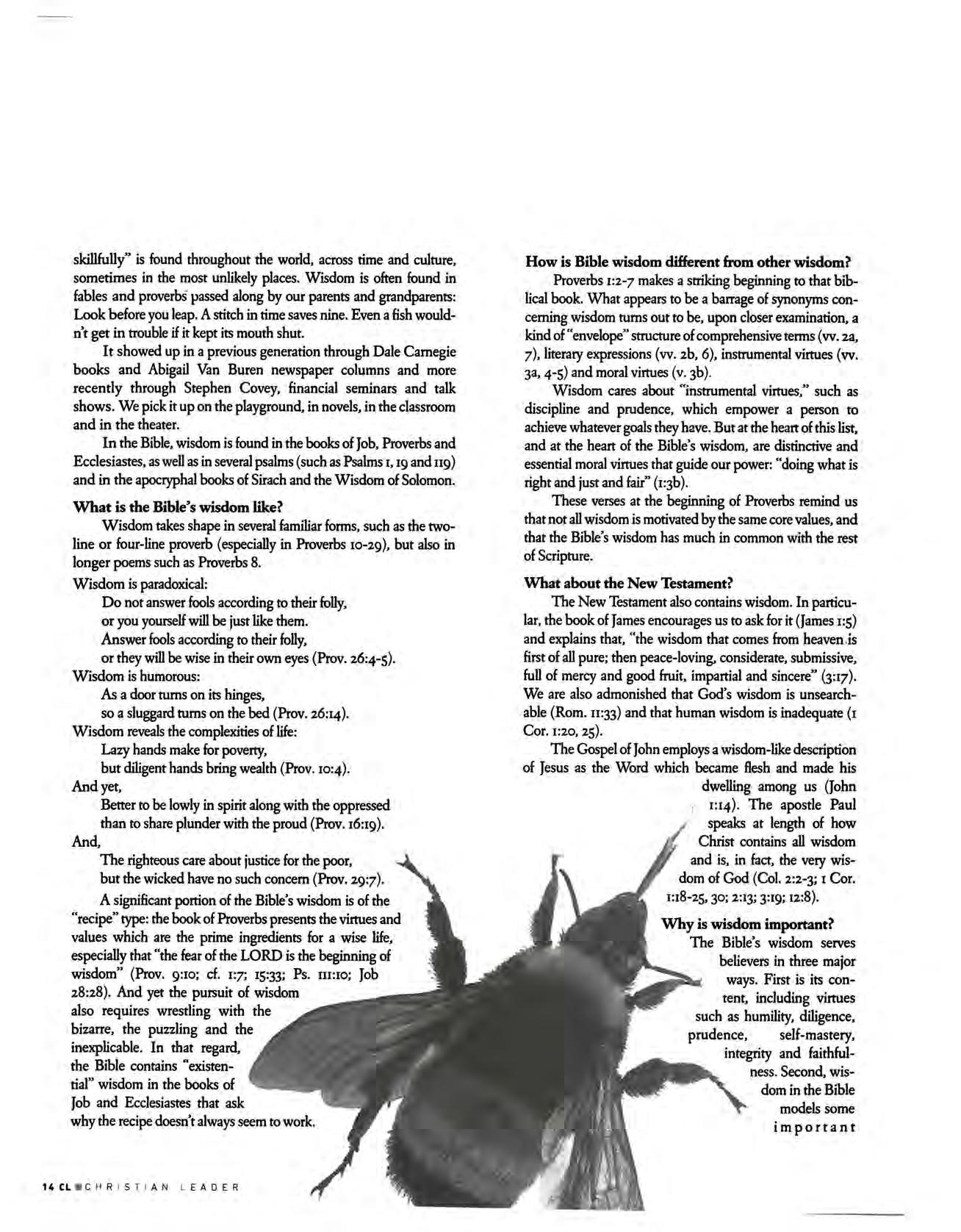
How is Bible wisdom different from other wisdom?
Proverbs 1:2-7 makes a striking beginning to that biblical book. What appears to be a barrage of synonyms concerning wisdom turns out to be. upon closer examination. a kind of "envelope" structure of comprehensive terms (w. 2a. 7). literary expressions (w. 2b. 6). instrumental virtues (w. 3a. 4-5) and moral virtues (v 3b)
Wisdom cares about "instrumental virtues." such as discipline and prudence which empower a person to achieve whatever goals they have. But at the heart of this list, and at the heart of the Bible's wisdom. are distinctive and essential moral virtues that guide our power: "doing what is right and just and fair" (1:3b).
These verses at the beginning of Proverbs remind us that not all wisdom is motivated by the same core values, and that the Bible's wisdom has much in common with the rest of Scripture.
What about the New Testament?
The New Testament also contains wisdom. In particular. the book of James encourages us to ask for it (James 1:5) and explains that. "the wisdom that comes from heaven.is first of all pure; then peace-loving. considerate. submissive. full of mercy and good fruit. impartial and sincere" (3=17) . We are also admonished that God's wisdom is unsearchable (Rom. 11:33) and that human wisdom is inadequate (I Cor. 1:20. 25).
The Gospel of John employs a wisdom-like description of Jesus as the Word which became flesh and made his dwelling among us (John , 1:14). The apostle Paul speaks at length of how Christ contains all wisdom and is. in fact. the very wisdom of God (Col. 2:2-3; 1 Cor. 1:18-25,30; 2:13; 3:19; 12:8).
Why is wisdom important?
The Bible's wisdom serves believers in three major ways. First is its content. including virtues such as humility. diligence. prudence. self-mastery. integrity and faithfulness Second. wisdom in the Bible models some important
things for us. Job shows us how we might struggle with God during times of pain and confusion, and Ecclesiastes demonstrates how to relate to those in such circumstances. ' A section of the book of Proverbs (22:17-24:34) has much in common with an earlier Egyptian collection of sayings, suggesting how to appropriate the insights of others through the filter of God's truth.
Finally, although the Bible's wisdom writings are similar in several ways to other parts of the Bible, they have their own special emphases, which make an important and distinc- (' tive contribution.
They emphasize the goodness and value of human beings.
They affirm that doubt and lament are common in the life of faith and help us know how to respond.
Because of the common ground they share with wisdom elsewhere, they provide for a kind of "wisdom evangelism," starting points for conversation with persons of other faiths or of no faith at all.
In the church, wisdom helps inform the pastoral counseling role, administration, financial concems and other pragmatic functions, reminding us how important it is for God's will to be done on earth as it is in heaven (Matr. 6:10).
And the wisdom writings invite us to encounter God-and be accountable to God-in the ordinary, everyday world: "Out in the open wisdom calls aloud, she raises her voice in the public square" (PrOV.I:20).
How can wisdom help us better understand the Bible?
For the reasons described above, wisdom is a kind of "bee in the bonnet" of the Bible-a treasure of helpful ideas eager to be used. Yet wisdom is also a kind of "burr in the saddle," something which doesn't seem to fit and can be annoying.
Whenever I hear someone atrempt to characterize or summarize the Bible in a short statement, I find myself asking, "Does that work for the whole Bible? Does that apply to Job, Proverbs and Ecclesiastes?" Here are a few:
"The Bible is the account of God's covenant relationships." But the wisdom writings don't talk about God's covenants.
'The Bible is the account of God's mighty acts of salvation." But wisdom isn't concemed with big miracles and understands that God's revelation can come through ongoing everyday events.
'The Bible is about doing the right thing." But wisdom appeals to the human desire for well-being more than it appeals to what is right or wrong.
'The Bible is the story of God's people." But most wisdom doesn't come in a story, and wisdom applies to all people.
For these reasons, some have taken a very negative view of the books of Proverbs, Job and Ecclesiastes: 'The Bible's wisdom writings are basically pagan, not worthy to be called inspired." Yet these books are part of what the people of God have always treasured as
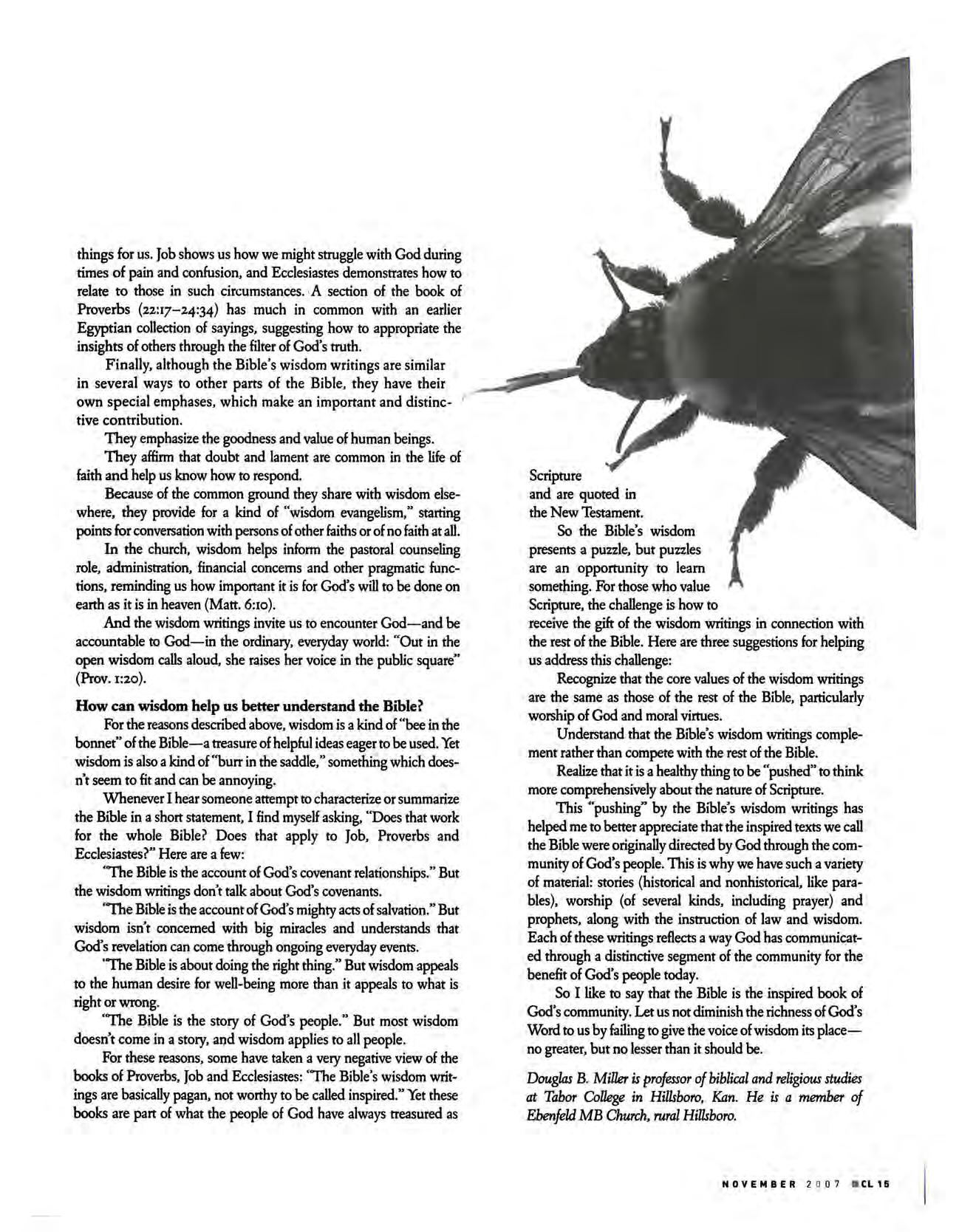
Scripture and are quoted in the New Testament.
So the Bible's wisdom presents a puzzle, but puzzles are an opportunity to learn something. For those who value Scripture, the challenge is how to receive the gift of the wisdom writings in connection with the rest of the Bible. Here are three suggestions for helping us address this challenge:
Recognize that the core values of the wisdom writings are the same as those of the rest of the Bible, particularly worship of God and moral virtues.
Understand that the Bible's wisdom writings complement rather than compete with the rest of the Bible.
Realize that it is a healthy thing to be "pushed" to think more comprehensively about the nature of Scripture.
This "pushing" by the Bible's wisdom writings has helped me to better appreciate that the inspired texts we call the Bible were originally directed by God through the community of God's people. This is why we have such a variety of material: stories (historical and nonhistorical, like parables), worship (of several kinds, including prayer) and prophets, along with the instruction of law and wisdom. Each of these writings reflects a way God has communicated through a distinctive segment of the community for the benefit of God's people today.
So I like to say that the Bible is the inspired book of God's community. Let us not diminish the richness of God's Word to us by failing to give the voice of wisdom its placeno greater, but no lesser than it should be.
Douglas B. Miller is professor of biblical and religious studies at Tabor College in Hillsboro, Kan. He is a member of Ebenfeld MB Church, rural Hillsboro.
JAMES IS A RATH ER UNUSUAL BOOK IN THE Christian canon, isn 't it ? What other book in the New Testament can matc h James for its powerful, authoritative moral d irection? When Paul write s to his churches he occasionally employs a tone of aut hority, but he never match es the level at wh ich Ja mes simply assumes his own auth ority. When James tells his audience to do something, he sounds almost as if he believes himself to be the direct channel from God to his readers .
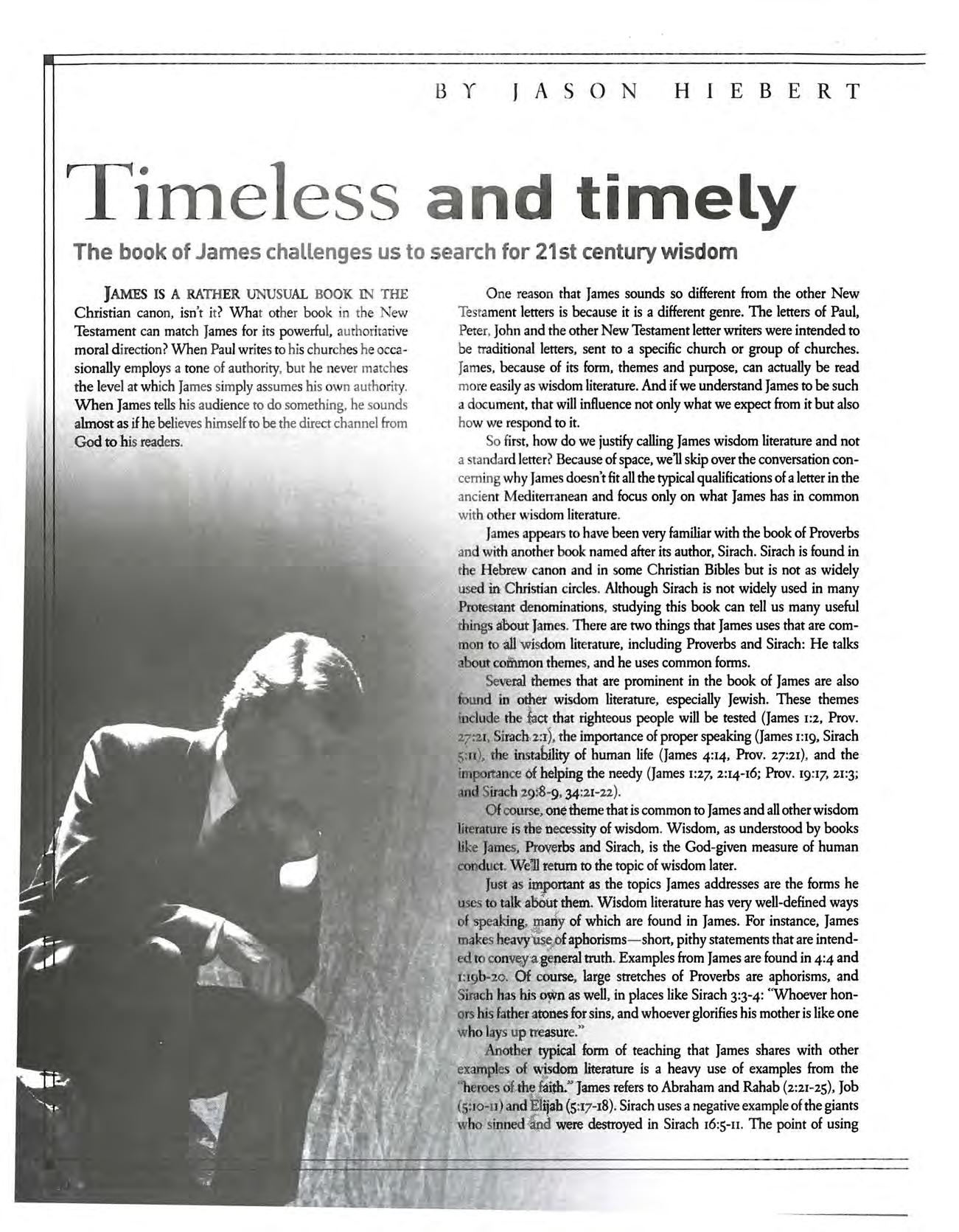
O ne reason that James sounds so different from the other New Testament letters is because it is a different genre. The letters of Paul, Pete r, John and the other New Testament letter writers were intended to be traditional letters, sent to a specific church or group of churches. James, because of its form, themes and purpose, can actually be read more easily as wisdom literature. And if we understand James to be such a doc ument, that will influence not only what we expect from it but also how we respond to it.
So first, how do we justify calling James wisdom literature and not a standa rd letter? Because of space, well skip over the conversation concern ing why James doesn't fit all the typical qualifications of a letter in the anci ent Mediterranean and focus only on what James has in common with oth er wi sdom literature . James appears to have been very familiar with the book of Proverbs and with anoth er book named after its author, Sirach. Sirach is found in the Hebrew canon and in some Christian Bibles but is not as widely used in C hristian circles Although Sirach is not widely used in many ProtestarJt denominations , studying this book can tell us many useful things ibout James There are two things that James uses that are common to all Wisdom literature, including Proverbs and Sirach: He talks abQut themes , and he uses common forms. themes that are prominent in the book of James are also found, i n other wisdom literature, especially Jewish. These themes include the lact that righteous people will be tested (James 1:2, Provo 2.7:2.1, Sjra ch2:t), the impottance of proper speaking (James 1:19, Sirach 5:11), tl1e instability of human life (James 4:14, ProVo 27:21) , and the importance 6f helping the needy (James 1:27, 2:14-16; Prov. 19:17, 21:3; and Sirach 29ZS-9, 34 :21-22).
Of course, one theme that is common to James and all other wisdom literature is the necessity of wisdom Wisdom, as understood by books like James, Prowrbs and Sirach, is the God-given measure of human conduct. wem retum to the topic of wisdom later.
Just as> itnportant as the topics James addresses are the forms he uses to talk abOut them Wisdom literature has very well-defined ways of speaking, j!ariY of which are found in James. For instance, James pithy statements that are intended to convwa :gepe:raJ truth. Examples from James are found in 4:4 and :191>-20. Of, course, large stretches of Proverbs are aphorisms, and Siracb has his as well , in places like Sirach B-4: "Whoever honors his fa ther atones for sins, and whoever glorifies his mother is like one who lays up treasure."
AhOther typical form of teaching that James shares with other examples of . om literature is a heavy use of examples from the '1letoes'o\ » James refers to Abraham and Rahab (2:21 - 25), Job an · b (5:17-18) Sirach uses a negative example of the giants no sinned were destroyed in Sirach 16:5-11. The point of using
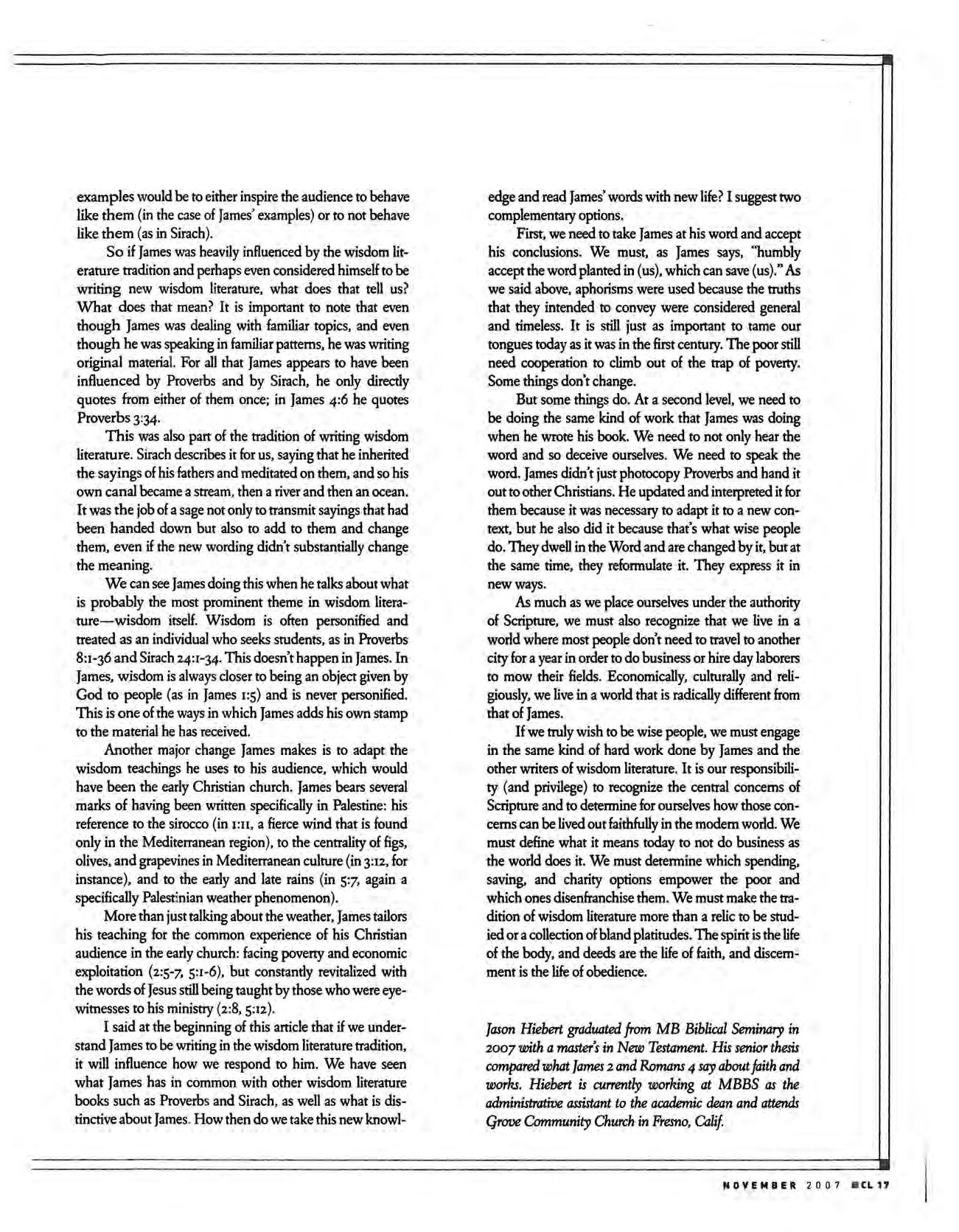
examples would be to either inspire the audience to behave like them (in the case of James' examples) or to not behave like them (as in Sirach).
So if James was heavily influenced by the wisdom literature tradition and perhaps even considered himself to be writing new wisdom literature, what does that tell us? What does that mean? It is important to note that even though James was dealing with familiar topics, and even though he was speaking in familiar patterns, he was writing original material. For all that James appears to have been influenced by Prove rbs and by Sirach, he only directly quotes from either of them once; in James 4:6 he quotes Proverbs 3:34.
This was also part of the tradition of writing wisdom literature. Sirach describes it for us, saying that he inherited the sayings of his fathers and meditated on them, and so his own canal became a stream, then a river and then an ocean. It was the job of a sage not only to transmit sayings that had been handed down but also to add to them and change them, even if the new wording didn't substantially change the meaning.
We can see James doing this when he talks about what is probably the most prominent theme in wisdom literature-wisdom itself. Wisdom is often personified and treated as an individual who seeks students, as in Proverbs 8:1-36 and Sirach 24:1-34. This doesn't happen in James. In James, wisdom is always closer to being an object given by God to people (as in James 1:5) and is never personified. This is one of the ways in which James adds his own stamp to the material he has received.
Another major change James makes is to adapt the wisdom teachings he uses to his audience, which would have been the early Christian church. James bears several marks of having been written specifically in Palestine: his reference to the sirocco (in I:1I, a fierce wind that is found only in the Mediterranean region), to the centrality of figs, olives, and grapevines in Mediterranean culture (in 3:12, for instance), and to the early and late rains (in 5:7, again a specifically Palesti nian weather phenomenon).
More than just talking about the weather, James tailors his teaching for the common experience of his Christian audience in the early church: facing poverty and economic exploitation (2:5-7, 5:1-6), but constantly revitalized with the words of Jesus still being taught by those who were eyewitnesses to his ministry (2 :8, 5:12).
I said at the beginning of this article that if we understand James to be writing in the wisdom literature tradition, it will influence how we respond to him. We have seen what James has in common with other wisdom literature books such as Proverbs and Sirach, as well as what is distinctive about James How then do we take this new knowl -
edge and read James' words with new life? I suggest two complementary options.
First, we need to take James at his word and accept his conclusions. We must, as James says, "humbly acceptthe word planted in (us), which can save (us)." As we said above, aphorisms were used because the truths that they intended to convey were considered general and timeless. It is still just as important to tame our tongues today as it was in the first century. The poor still need cooperation to climb out of the trap of poverty. Some things don't change.
But some things do. At a second level, we need to be doing the same kind of work that James was doing when he wrote his book. We need to not only hear the word and so deceive ourselves. We need to speak the word. James didn't just photocopy Proverbs and hand it out to other Christians. He updated and interpreted it for them because it was necessary to adapt it to a new context, but he also did it because that's what wise people do. They dwell in the Word and are changed by it, but at the same time, they reformulate it. They express it in new ways.
As much as we place ourselves under the authority of Scripture, we must also recognize that we live in a world where most people don't need to travel to another city for a year in order to do business or hire day laborers to mow their fields. Economically, culturally and religiously, we live in a world that is radically different from that of James.
If we truly wish to be wise people, we must engage in the same kind of hard work done by James and the other writers of wisdom literature It is our responsibility (and privilege) to recognize the central concerns of Scripture and to determine for ourselves how those concerns can be lived out faithfully in the modem world. We must define what it means today to not do business as the world does it. We must determine which spending, saving. and charity options empower the poor and which ones disenfranchise them. We must make the tradition of wisdom literature more than a relic to be studied or a collection of bland platitudes. The spirit is the life of the body, and deeds are the life of faith, and discernment is the life of obedience.
Jason Hiebert graduated from MB Biblical Seminary in 2007 with a master's in New Testament. His senior thesis compared what James 2 and Romans 4 say about faith and works. Hiebert is currently working at MBBS as the administrative assistant to the academic dean and attends Grove Community Church in Fresno, Calif.
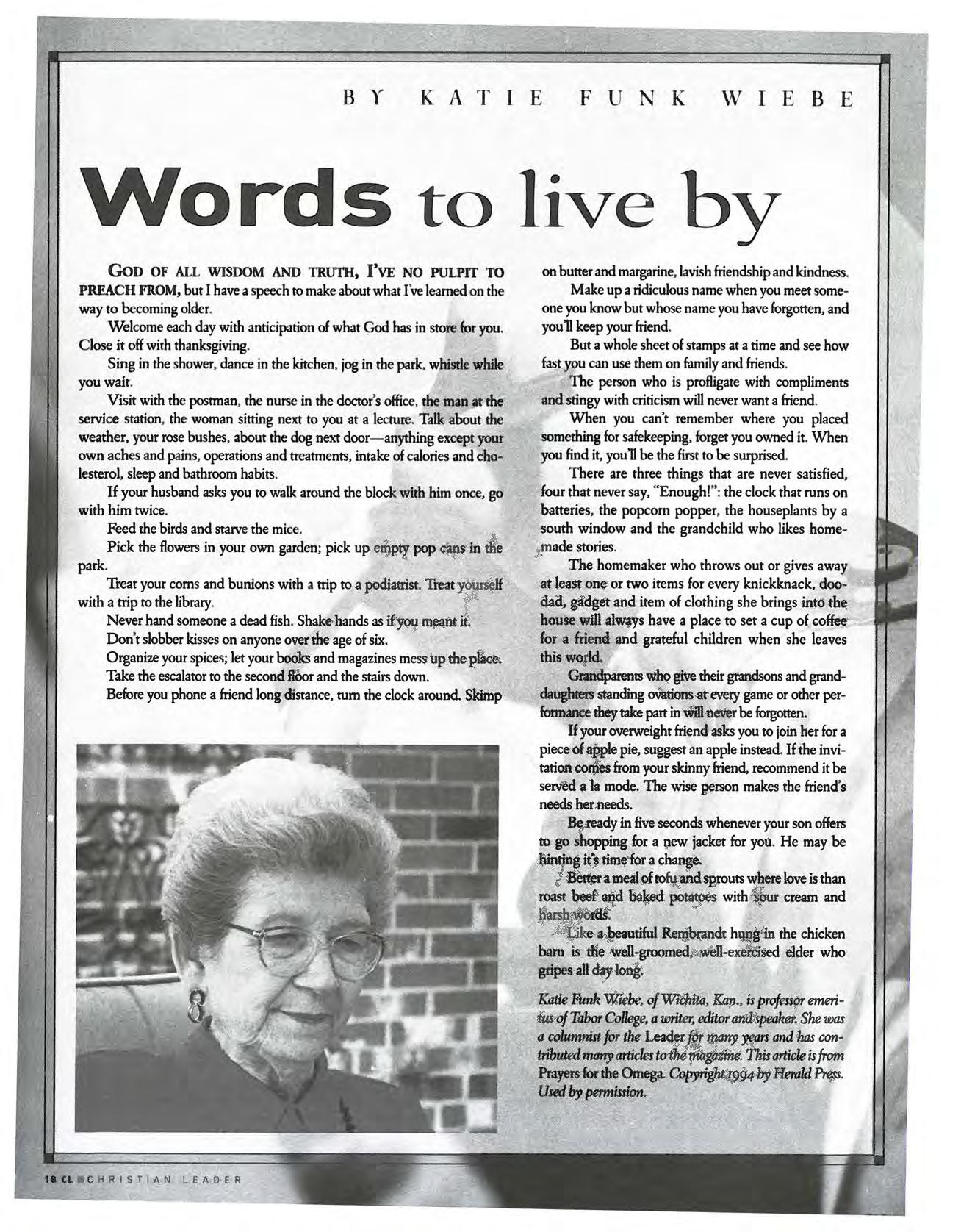
GoD OF ALL WISDOM AND TRUTII, I'VE NO PULPIT TO on butter and margarine, lavish friendship and kindness . PREACH FROM, but I have a speech to make about what I've learned on the
Make up a ridiculous name when you meet someway to becoming older one you know but whose name you have forgotten, and
Welcome each day with anticipation of what God has in store for you . youll keep your friend . Close it off with thanksgiving
But a whole sheet of stamps at a time and see how
Sing in the shower, dance in the kitchen , jog in the park, whistle while can use them on family and friends . you wait. [
lThe person who is profligate with compliments
Visit with the posttnan, the nurse in the doctor's office, the man at the . arid stingy with criticism will never want a friend . service station, the woman sitting next to you at a lecture TaIltllDout the
When you can't remember where you placed weather, your rose bushes, about the dog next door- anything except for safekeeping. forget you owned it When own aches and pains, operations and tteattnenrs, intake of calories and coo- . you find it, youll be the first to be surprised lesterol. sleep and bathroom habits
There are three things that are never satisfied,
If your husband asks you to walk around the block with him once, go f four that never say, "Enoughl ": the clock that runs on with him twice • batteries, the popcorn popper, the houseplants by a
Feed the birds and starve the mice " " south window and the grandchild who likes home-
Pick the flowers in your own garden; pick up in tie A ,.made stories park " '"
The homemaker who throws out or gives away
Treat your corns and bunions with a trip to a: piXUatrist. 11 at least one' or two items for every knickknack, doo} 1ill with a trip to the library. daa and item of clothing she brings into
Never hand someone a dead fish Shak.hands as ityoy it, wiR have a place to set a cup of coffee
Don't slobber kisses on anyone overtbe age of six. . for amen(1 and grateful children when she leaves
Organize your spice!;; let your bpoks and magazines mess up this wotld.
Take the escalator to the second fU)or and the stairs down. . rs gi,ve their grandsons and grandBefore you phone a friend long distance, tum the clock around. Skimp '7 1 standing game or other perComiiiJ<i part in be forgotten.
If your overweight friena asks you to join her for a piece of -.PIlle pie, suggest an apple instead. If the invitation from your skinny friend, recommend it be se1'V&i a 1a mode. The wise person makes the friend's needs her.needs.
Your Mennonite Brethren Who What Where Ill When Iil WhY IiI How
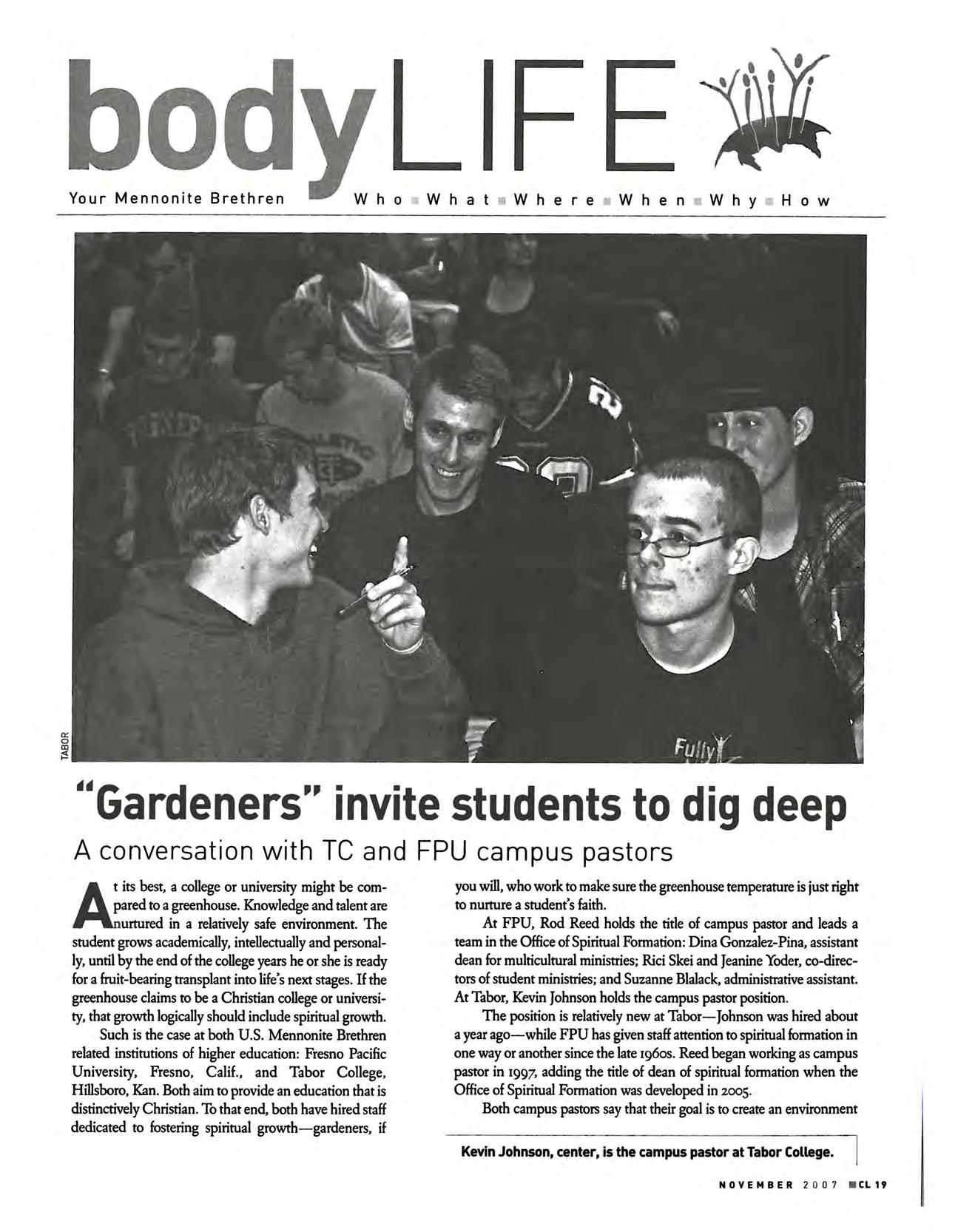
best, a college or university might be compared to a greenhouse. Knowledge and talent are urtured in a relatively safe environment. The student grows academically. intellectually and personally. until by the end of the college years he or she is ready for a fruit-bearing transplant into life's next stages. If the greenhouse claims to be a Christian college or university. that growth logically should include spiritual growth. Such is the case at both U.S. Mennonite Brethren related institutions of higher education: Fresno Pacific University. Fresno. Calif.. and Tabor College, Hillsboro, Kan. Both aim to provide an education that is distinctively Christian. To that end, both have hired staff dedicated to fostering spiritual growth - gardeners, if
you will. who work to make sure the greenhouse temperature is just right to nurture a student's faith.
At FPU, Rod Reed holds the title of campus pastor and leads a team in the Office of Spiritual Formation: Dina Gonzalez- Pina, assistant dean for multicultural ministries; Rici Skei and Jeanine Yoder, co-directors of student ministries; and Suzanne Blalack, administrative assistant. At Tabor, Kevin Johnson holds the campus pastor position
The position is relatively new at Tabor-Johnson was hired about a year ago-while FPU has given staff attention to spiritual formation in one way or another since the late 1960s. Reed began working as campus pastor in 1997, adding the title of dean of spiritual formation when the Office of Spiritual Formation was developed in 2005
Both campus pastors say that their goal is to create an environment
Kevin Johnson, center, is the campus pastor at Tabor College.
on campus that fosters healthy spiritual formation. The Leader recently conducted an e-mail conversation with both Reed and Johnson to understand just how they hope to do that and how families and congregations can help. Following are excerpts from that conversation.
CL: What does a typical day or week include for you?
RR: My job description calls for me to lead the process of spiritual fonnation for the FPU campus. I typically see my main responsibilities in four categories: regular preaching and administration of our chapel and convocation program; pastoral coun seling and conversation with students, faculty and staff; ministry team leadership; and administrative leadership/representation within the university.
K.J: My primary responsibility is to develop Tabor's new chapel program. Our desire is to create an environment on campus that facilitates spiritual formation.
CL: As you've served as campus pastor, what has been surprising? Challenging? A source of joy?
RR: One of the most important things I've realized over the years is that ministry in the university is very different than ministry in a church. Part of the educational mission of the un iversity is challenging the way students think. That means that we don't just affirm their faith, but we challenge it. We hope to help them develop a lifelong faith that will grow as they will and is strong enough for whatever they face along the way. My greatest joy comes when students see that their lives are integrated wholes in which their relationship with God permeates everything they do and are.
CL: When you say that part of your job. and that of the university, is to challenge students' faith how do you do that?
RR: One thing that we try to help students deal with is how to use doubt constructively. This is probably one of the most important things we do, and one that has changed over the years The postmodem context encourages doubt, especially as it relates to truth claims of the church.
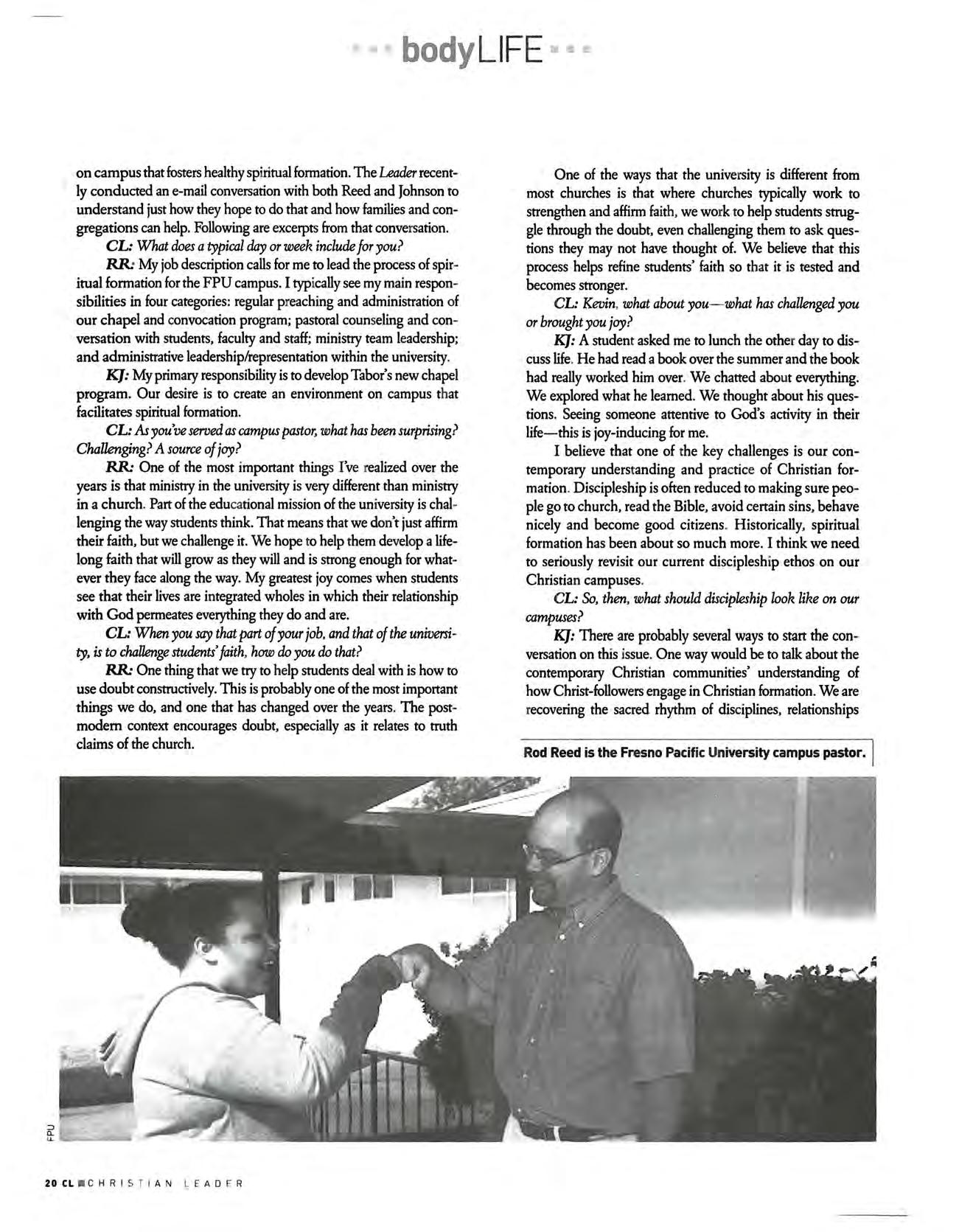
One of the ways that the unive rsity is different from most churches is that where churches typically work to strengthen and affirm faith, we work to help students struggle through the doubt, even challenging them to ask questions they may not have thought of. We believe that this process helps refine students' faith so th at it is tested and becomes stronger.
CL: Kevin what about you - what has challenged you or brought you joy?
KJ: A student asked me to lunch the other day to discuss life He had read a book over the summer and the book had really worked him over. We chatted abo ut everything. We explored what he learned. We thought about his questions. Seeing someone attentive to God's activity in their life-this is joy-inducing for me.
I believe that one of the key challenges is our contemporary unders tanding and pra ctic e of Christian formation Discipleship is often reduced to making sure people go to church, read the Bible, avoid certain sins, behave nicely and become good citizens . Historically, spiritual formation has been about so much more. I think we need to seriously revisit our current disciplesh ip ethos on our Christian campuses
CL: So. then, what should discipleship look like on our campuses?
KJ: There are probably several ways to start the conversation on this issue . One way would be to talk about the contemporary Christian communities' understanding of how Christ-followers engage in Christian formation We are recovering the sacred rhythm of disciplines, relationships
and experiences that have shaped Christ-followers over the centuries. It is possible that our current discipleship efforts are limited when we lean too heavily on programs and church services.
Another way that this question could be approached is to think about the question: What kind of people are we hoping to produce? My sense is that we might be more committed to creating nice, civilized, respectable people who are well liked (and, for some, who vote the right way) rather than nurturing intentional followers of Jesus. This, of course, affects discipleship.
CL: How well prepared are students for college and beyond? Do you see gaps in their maturity or growth that families and churches need to pay attention to before they even get to college?
RR: It is difficult to generalize about our students because of the wide range of backgrounds from which they come. Many are very well prepared, come from good schools and have a family history and support for higher education. Many, however, are not.
On the personal and spiritual side, many of our students come with very little biblical and theological depth of understanding, even those who come from strong church backgrounds. Many of our students have a history of faithfulness in church and a passion for God, but without strong foundations in what they believe and why. When struggles come-and they almost always do-it is easy for their faith to be shaken because they're not always sure about what their faith is based on. This is one of the reasons why we work very intentionally with students in the areas of questioning and doubt.
KJ: I cannot count the number of students who come to college with this picture that college is all about pulling pranks, staying up late and dating. When I ask them where they received such a vision for college they almost always refer to the multitude of "college prank stories" and such told by their youth leaders.
I think that the student suffers when they come to college with a limited vision for the learning and growth that could be experienced When a church or youth ministry prepares their youth well, everybody wins
The student wins. The college wins. The church community wins. If churches and youth ministries were to practice discipline in how they talk about college with their youth, this would be a tremendous gift.
CL: How can parents and congregations best support their students' faith development during the college years?
KJ: Encouragement. Prayer. Give them space to process what they are learning. Send reminders that they are not forgotten when they are away from home and church life-care packages, letters, e-mails Offer financial support-this is a significant stressor for students and when money shows up it's a real faith -lifter. Provide a forum for the student to share their college experience during a church service, youth group , prayer meeting or such.
RR: I would likewise encourage families and congregations to continue to pray for
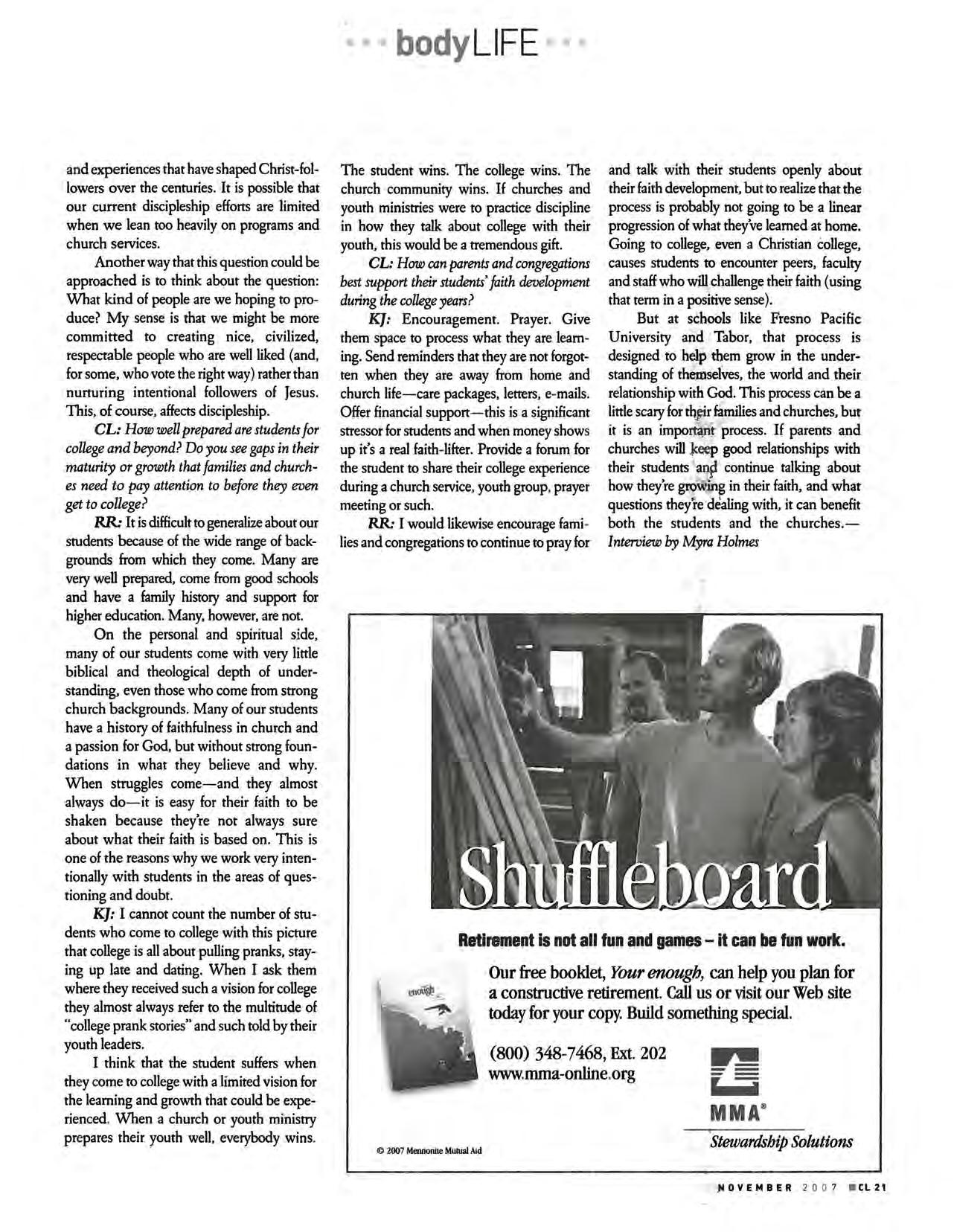
and talk with their students openly about their faith development, but to realize that the process is probably not going to be a linear progression of what they've learned at home. Going to college, even a Christian college, causes students to encounter peers, faculty and staff who will challenge their faith (using that term in a positive sense).
But at schools like Fresno Pacific University and Tabor, that process is designed to help them grow in the understanding of themselves, the world and their relationship with God. This process can be a little scary for th,Fir families and churches, but it is an importa# process. If parents and churches will l<eep good relationships with their students *arW continue talking about how they're gIQ\vin pin their faith, and what questions theyre dealing with, it can benefit both the students and the churches.Interview by Myra Holmes
The theme of the Io7th Nonh Carolina MB District Conference convention Sept. 28-29 in Lenoir, NC, struck a chord for members. The words of Philippians 3:13-14 decorated the walls and flashed on the projection screen " Press on toward the mark" was shouted out and became tangible
Celebrating 107 years comes with mixed emotions, says Chris Eidse, the NCDC youth pastor, in his convention repon to the Leader. 'There is a strong sense of pride in the remarkable heritage that members share. This district has victoriously navigated the rough southern waters of racial tensions and is a positive and rare example of multiracial worship, " says Eidse. "Our churches have a great reputation and are well known as predominantly African American churches that can really cross cultural barriers
and impact a diverse population ."
The district churches also share some concerns: Shouldn't there be more churches by now, or bigger churches? Shouldn't the issues that keep surfacing at business meetings have been resolved? "When our churches are tom between celebration and frustration, it is time to take on the challenge of the apostle Paul to 'Press on toward the mark,'" says Eidse
The encouragement to persevere came at a good time since the district's effons to build a multipurpose facility "has hit a few snags and is taking longer than anticipated," says E idse The district had hoped to hold the 2007 convention in the new building but unforeseen barriers made the challenge to press on an appropriate one The multipurpose facility in Lenoir will be used by the six Mennonite
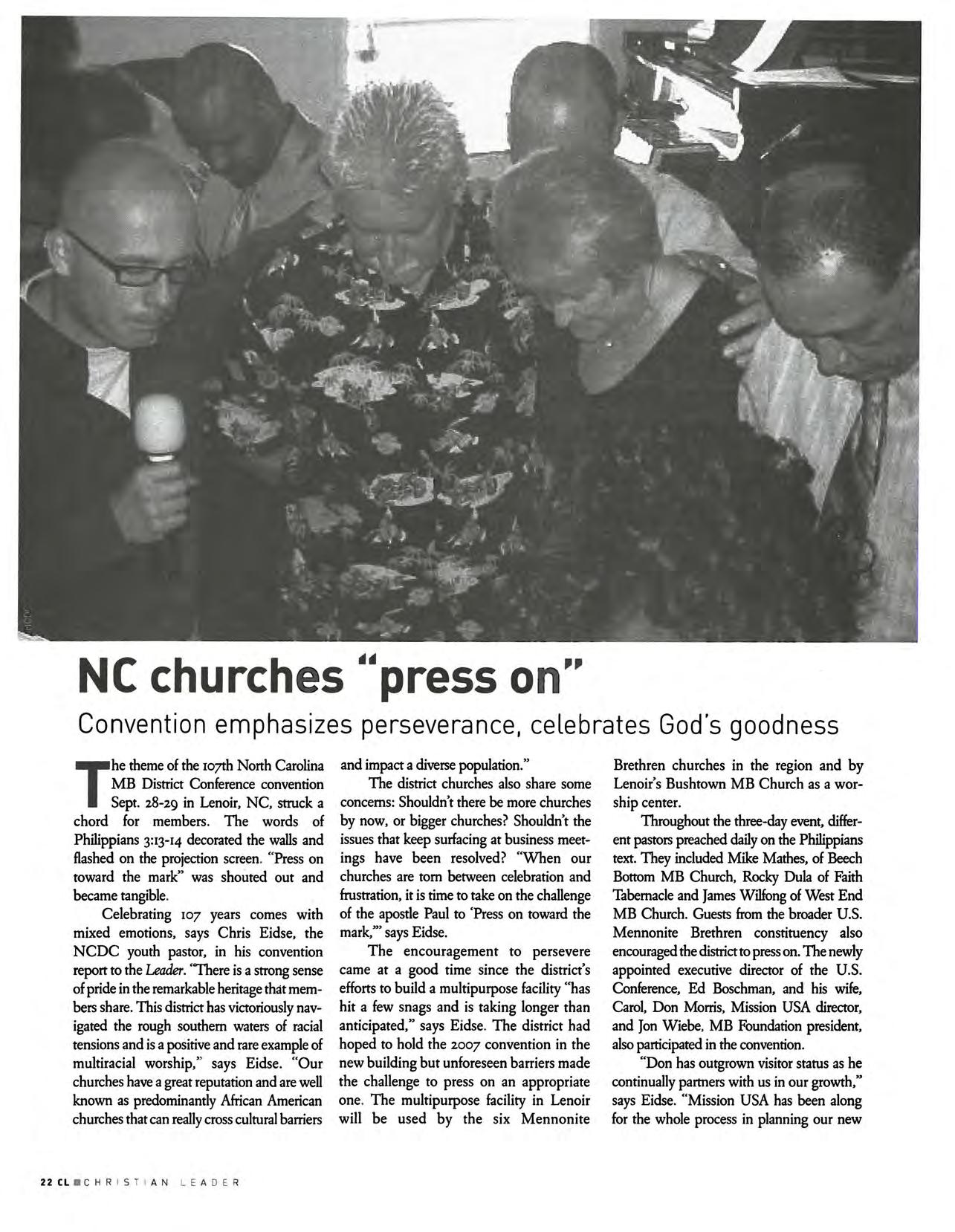
Brethren churches in the region and by Lenoir's Bushtown MB Church as a worship center.
Throughout the three-day event, different pastors preached daily Ort the Philippians text. They included Mike Mathes, of Beech Bottom MB Church, Rocky Dula of Faith Tabernacle and James Wilfong of West End MB Church. Guests from the broader U.S. Mennonite Brethren constituency also encouraged the district to press on. The newly appointed executive director of the U.S Conference, Ed Boschman, and his wife, Carol, Don Morris, Mission USA director, and Jon Wiebe, MB Foundation president, also panicipated in the convention.
"Don has outgrown visitor status as he continually panners with us in our growth," says Eidse. " Mission USA has been along for the whole process in planning our new
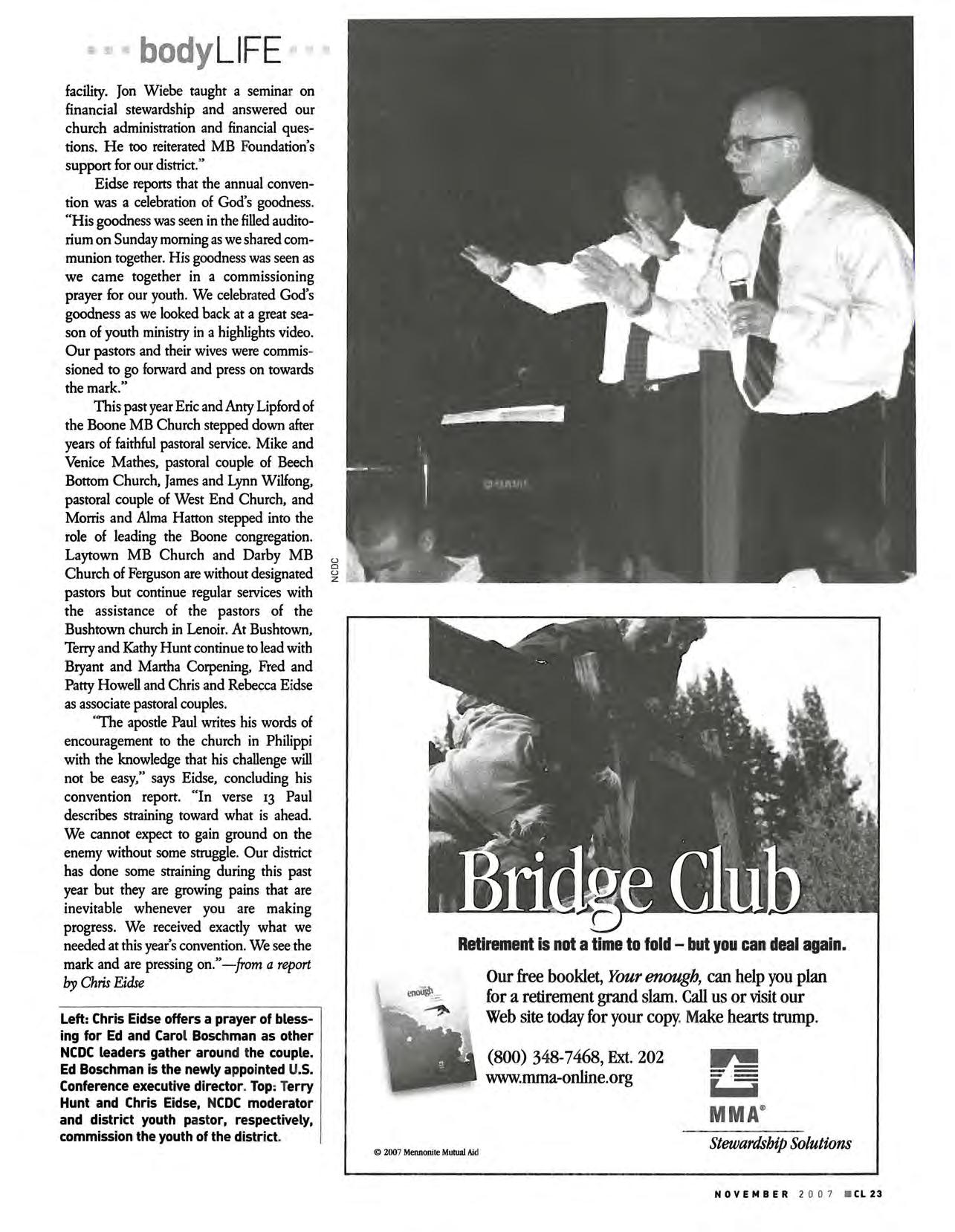
facility. Jon Wiebe taught a seminar on financial stewardship and answered our church administration and financial questions. He too reiterated MB Foundation's support for our district."
Eidse reports that the annual convention was a celebration of God's goodness "His goodness was seen in the filled auditorium on Sunday morning as we shared communion together. His goodness was seen as we came together in a commissioning prayer for our youth. We celebrated God's goodness as we looked back at a great season of youth ministry in a highlights video. Our pastors and their wives were commissioned to go forward and press on towards the mark."
This past year Eric and Anty Lipford of the Boone MB Church stepped down after years of faithful pastoral service. Mike and Venice Mathes, pastoral couple of Beech Bottom Church, James and Lynn Wilfong, pastoral couple of West End Church, and Morris and Alma Hatton stepped into the role of leading the Boone congregation. Laytown MB Church and Darby MB Church of Ferguson are without designated pastors but continue regular services with the assistance of the pastors of the Bushtown church in Lenoir. At Bushtown, Terry and Kathy Hunt continue to lead with Bryant and Martha Corpening, Fred and Patty Howell and Chris and Rebecca Eidse as associate pastoral couples.
'The apostle Paul writes his words of encouragement to the church in Philippi with the knowledge that his challenge will not be easy," says Eidse, concluding his convention report. "In verse 13 Paul describes straining toward what is ahead. We cannot expect to gain ground on the enemy without some struggle. Our district has done some straining during this past year but they are growing pains that are inevitable whenever you are making progress. We received exactly what we needed at this year's convention. We see the mark and are pressing on." -from a report by Chris
Eidse
Left: Chris Eidse offers a prayer of blessing for Ed and Carol Boschman as other NCDC leaders gather around the couple. Ed Boschman is the newly appointed u.s. Conference executive director Top: Terry Hunt and Chris Eidse, NCDC moderator and district youth pastor, respectively, commission the youth of the district
Only God can orch esttate a miracle at a TV studio that plays out more exciting box office hit," writes Karen Sanchez, member of MBMS International's Team 2000, in a recent prayer letter.
Team 2000 works under the Mennonite Brethren global mission agency in Chonburi, Thailand, where their ministry include s The Life Center church and two homes for HIV-positive orphans, called Abundant Life Home.
The miracle to which Sanchez refers begins with break dancing and ends with an amazing reunion. The team hired a break-dancing teacher for the boys at ALH last November. Recently the teacher managed to secure an audition for the boys on the popular Thai version of '1\merican Idol," a show called "Game Panaan." The boys passed the audition and were invited to a television studio, Studio 7, for a day of filming.
'We bought matching outfits and prayed and practiced our interviews, confident we were going to win the big one," Sanchez writes.
During the nervous wait at the studio, the boys' housemother, P' Ganiga, recalled that one of the boys, Mac, had an aunt who
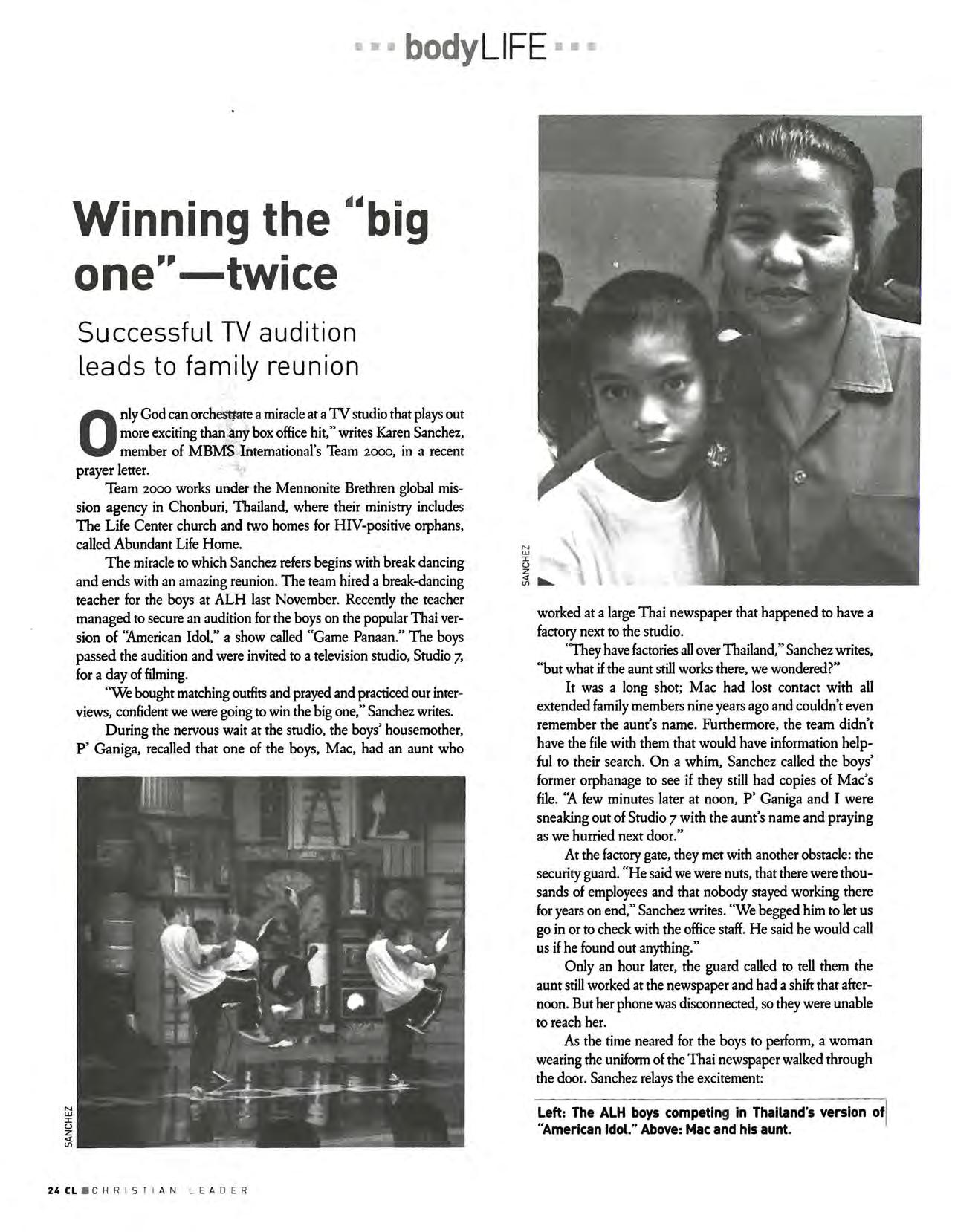
worked at a large Thai newspaper that happened to have a factory next to the studio.
'They have factories all over Thailand," Sanchez writes, "but what if the aunt still works there, we wondered?"
It was a long shot; Mac had lost contact with all extended family members nine years ago and couldn't even remember the aunt' s name. Furthermore, the team didn't have the file with them that would have information helpful to their search. On a whim, Sanchez called the boys' former orphanage to see if they still had copies of Mac's file. ''A few minutes later at noon, P' Ganiga and I were sneaking out of Studio 7 with the aunt's name and praying as we hurried next door."
At the factory gate, they met with another obstacle: the security guard "He said we were nuts, that there were thousands of employees and that nobody stayed working there for years on end," Sanchez writes. ' We begged him to let us go in or to check with the office staff. He said he would call us if he found out anything."
Only an hour later, the guard called to tell them the aunt still worked at the newspaper and had a shift that afternoon. But her phone was disconnected, so they were unable to reach her.
As the time neared for the boys to perform, a woman wearing the uniform of the Thai newspaper walked through the door Sanchez relays the excitement:
Left: The ALH boys competin g in Thailand's version of ''American Idol." Above: Mac and his aunt.
"P' Ganiga walked up to her and asked if she was related to Mac. The woman began to cry immediately and asked P' Ganiga if it was true - was Mac still alive? 'I thought he had died years ago for sure: she said. ' I never dared to hope that he would live.' P' Ganiga started to cry too and called me over. She introd u ced Mac's aunt and I started to cry too. We called Mac out of the makeup room , and with my arm around him, I explained to him that this woman was the aunt who had raised him when his parents died of AIDS, until Mac was five years old. Mac was smiling and speechless , and his aunt hugged him and cried and cried. Pretty soon the boys all gathered around and everyone wanted to know what was happening "
Mac's aunt said she had only come early for her shift because a rainstonn was coming. The boys were called on stage just before her shift began, so Mac's aunt was able to watch the boys perform and cheer for Mac. Sanchez says the ALH boys got a perfect score on their perfonnance and won a new computer for the ALH girls' home
The reunion between Mac and his aunt continued as she spent a weekend in Chonburi, and both Mac and P' Ganiga were able to talk with her about Jesus Sanchez links this reunion with Mac's commitment to be baptized in October: 'This day at Studio 7 profoundly impacted Mac and showed him how much God loved him."
Sanchez also says that the boys' appearance on the show opened opportunities for several conversations about the church and ALH home, "all to make God's name famou s in Thailand ." - from a report by Karen Sanchez
When Iran's President Mahmoud Ahmadinejad came to New York for the third time in three years in late September, he created quite a stir. Protesters gathered outside both the United Nations and C olumbia University, where he had speaking engagements. Many Americans took offense at his request to visit ground zero, a request den ied by local authorities. National media buzzed with questions and controversies.
Meanwhile, more than 100 religious leaders, including two Mennonite Brethren leaders, qu ietly met with Ahmadinejad in what at least one participant called a "conversation for peace."
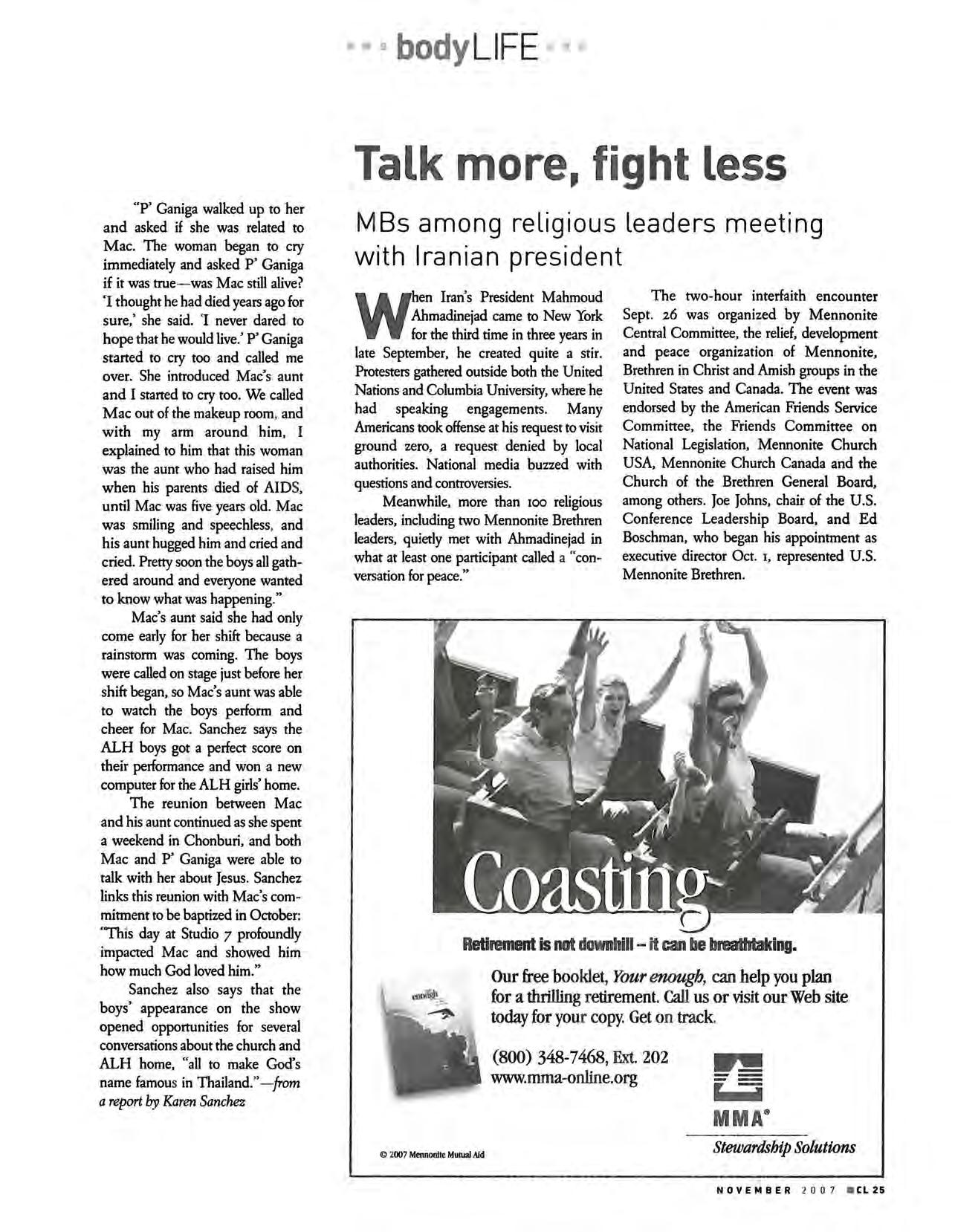
The two-hour interfaith encounter Sept. 26 was organized by Mennonite Central Committee, the relief. development and peace organization of Mennonite, Brethren in Christ and Amish groups in the United States and Canada. The event was endorsed by the American Friends Service Committee, the Friends Committee on National Legislation. Mennonite Church USA. Mennonite Church Canada and the Church of the Brethren General Board. among others. Joe Johns. chair of the U.S. Conference Leadership Board. and Ed Boschman. who began his appointment as executive director Oct. I. represented U.S. Mennonite Brethren.
This was the third in a series of interfaith conversations organized by M CC designed to establish dialogue between people of faith in the U.S. and the people and government of Iran. The discussions began with the Iranian President's visit to the U.N. in September of last year when 43 U.S. religious leaders met with him at his hotel. In February, 13 American religious leaders visited Iran where they met with a variety of governmental, academic and religious leaders.
MCC says that the ongoing dialogue emerges out of the concerns of U.S. religious leaders that the escalating political and economic confrontation between the U.S. and Iran could lead to war. They have called on the governments of Iran and the U.S. to establish direct, face-to-face diplomatic negotiations as one part of an effort to create a path to peace
In an interview with the Leader after the meeting, Boschman uses words like "interesting," "intriguing," "frustrating" and 'beady" to describe this most recent meeting. Amid significant security presence, Boschman and Johns literally had front-row seats for the discussions. Boschman calls it a "rare opportunity" to have such a chance to "connect with people who have the capacity to make a sig-
nificant difference on our planet."
After Ahmadinejad made his opening remarks, five panelists took part in a question-and-answer time Panelists included people from Quaker, Catholic and Evangelical groups Following this, Ahmadinejad also responded to a few questions submitted by the invited guests. The gathering closed with comments by Ahmadinejad and Bert Lobe, MCC interim executive director, who moderated the gathering.
Boschman says discussion covered a variety of topics, including some of Ahmadinejad's apparently contradictory statements and Israel's place in the world. He notes that he would have liked to see the discussions go deeper, to get to "nitty-gritty issues and questions" including controversial questions about Iran's political and military activity in the Middle East, as well as spirirual questions.
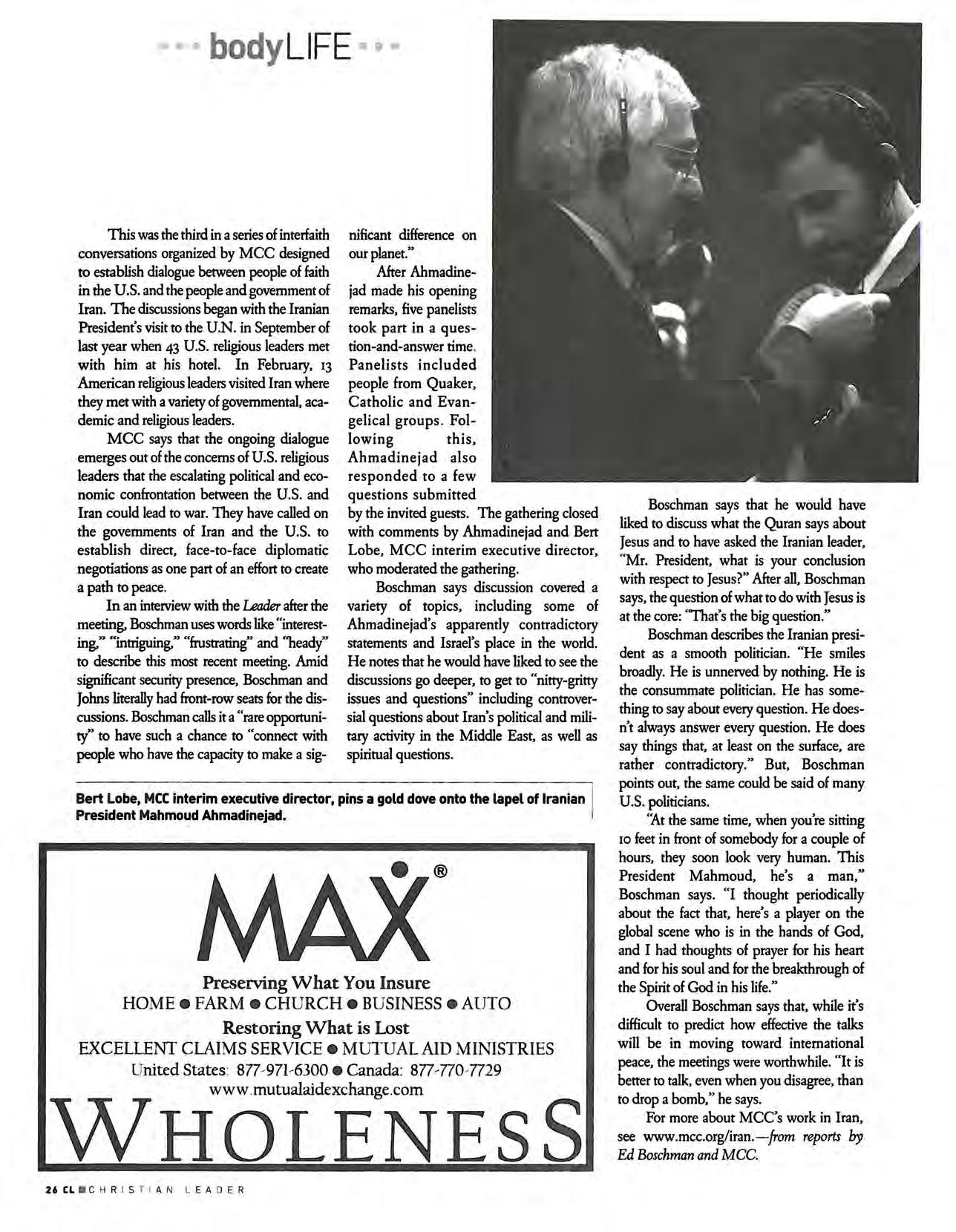
Boschman says that he would have liked to discuss what the Quran says about Jesus and to have asked the Iranian leader, "Mr. President, what is your conclusion with respect to Jesus?" After all, Boschman says, the question of what to do with Jesus is at the core: 'That's the big question."
Boschman describes the Iranian president as a smooth politician. "He smiles broadly. He is unnerved by nothing. He is the consummate politician. He has something to say about every question. He doesn't always answer every question. He does say things that, at least on the surface, are rather contradictory." But, Boschman points out, the same could be said of many U.S. politicians.
'1\.t the same time, when you're sitting 10 feet in front of somebody for a couple of hours, they soon look very human. This President Mahmoud, he's a man," Boschman says. "I thought periodically about the fact that, here's a player on the global scene who is in the hands of God, and I had thoughts of prayer for his heart and for his soul and for the breakthrough of the Spirit of God in his life."
Overall Boschman says that, while it's difficult to predict how effective the talks will be in moving toward international peace, the meetings were worthwhile. "It is better to talk, even when you disagree, than to drop a bomb," he says.
For more about MCC's work in Iran, see www mcc.org/iran. - from reports by Ed Boschman and Mec.
We welcome and appreciate your generous support of Mission USA.
Please send your donation to:
Mission USA U.S. Conference PO Box 220 Hillsboro, KS 67063
Note "Mission USA" on the memo line
To see more come to know HIM!
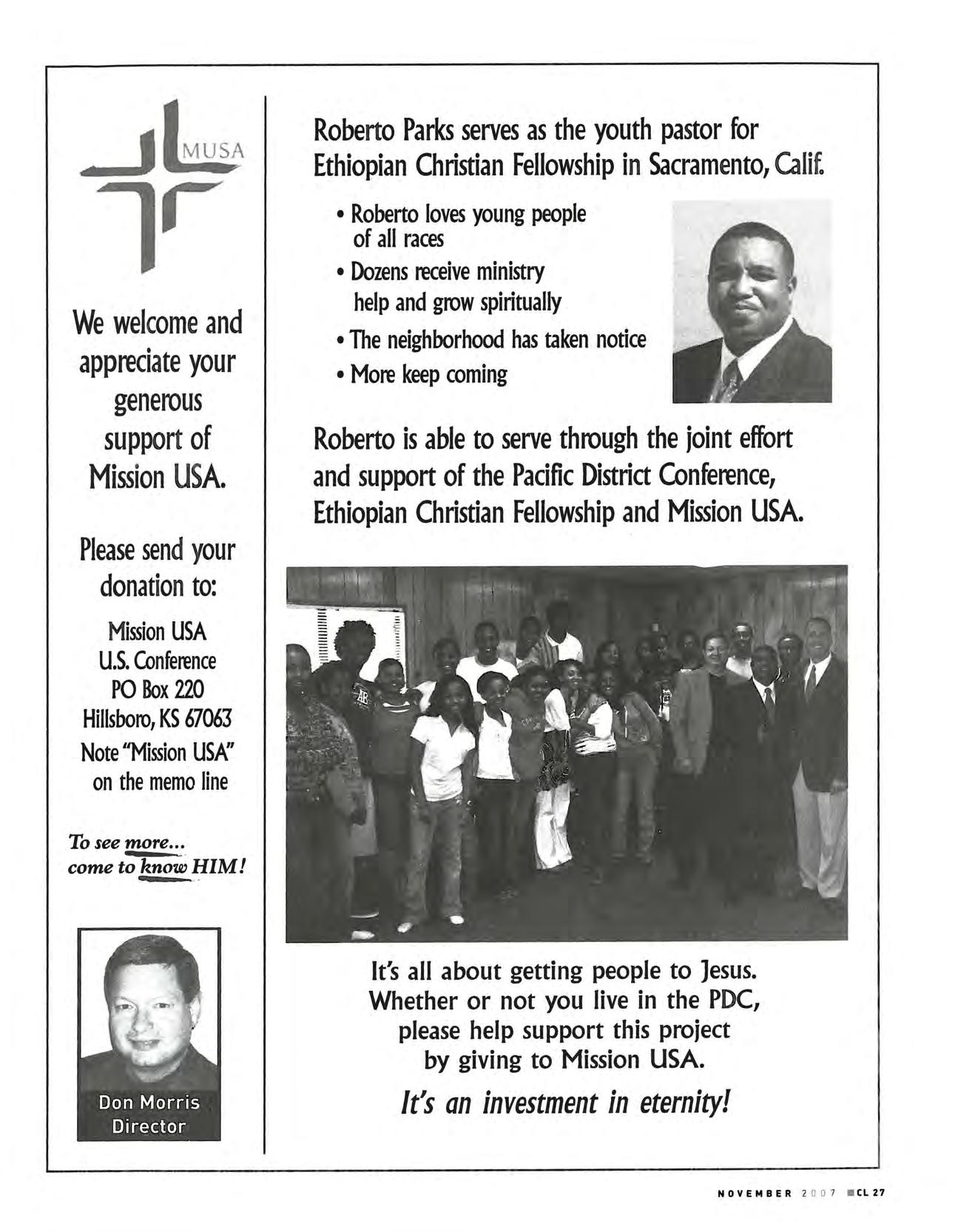
Roberto Parks serves as the youth pastor for Ethiopian Christian Fellowship in Sacramento, Calif.
• Roberto loves young people of all races
• Dozens receive ministry help and grow spiritually
• The neighborhood has taken notice
• More keep coming
Roberto is able to serve through the joint effort and support of the Pacific District Conference, Ethiopian Christian Fellowship and Mission USA.
It's all about getting people to Jesus. Whether or not you live in the POC, please help support this project by giving to Mission USA. It's an investment in eternity!
With our video gear stowed in our backpacks and a rising sense of anticipation that we were involved in the birth of something timely and strategic. my co-worker Andrew and I arrived in Central Asia. a land famed for its nomads. horsemanship and untamed harsh conditions . Socially and politically. Central Asia is in a post-Soviet era. with many of the same social problems of other post-Soviet nations; alcoholism. family breakdown. domestic violence and widespread poverty. just to name a few.
'This Central Asian country (unnamed for security reasons) was once one of the world's most restricted countries to the gospel and in 1989 had only four known
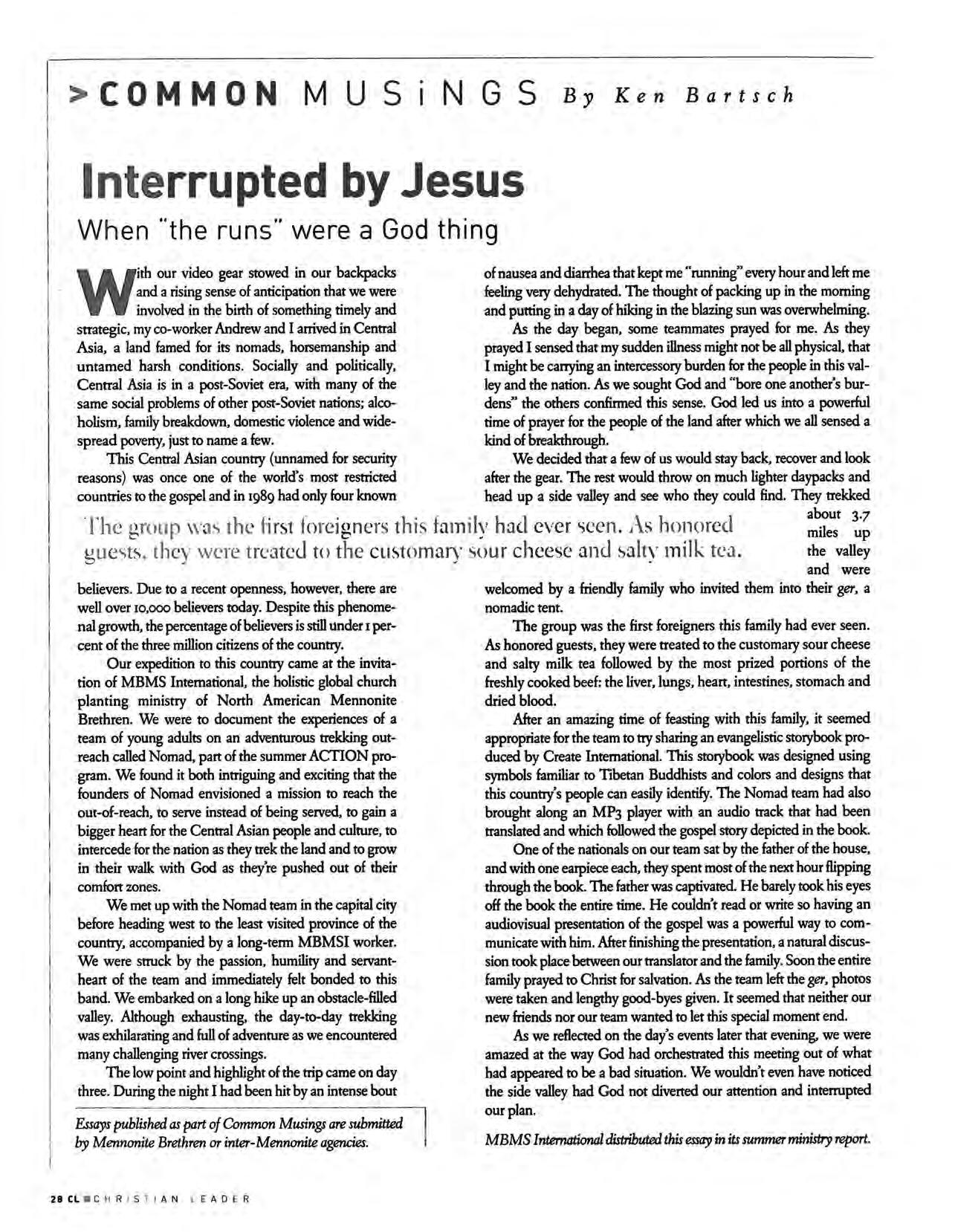
By Ken Bartsch
of nausea and diarrhea that kept me "running" every hour and left me feeling very dehydrated. The thought of packing up in the morning and purting in a day of hiking in the blazing sun was overwhelming.
As the day began, some teammates prayed for me. As they prayed I sensed that my sudden illness might not be all physical, that I might be carrying an intercessory burden for the people in this valley and the nation. As we sought God and "bore one another's burdens" the others confinned this sense. God led us into a powerful time of prayer for the people of the land after which we all sensed a kind of breakthrough.
We decided that a few of us would stay back, recover and look after the gear. The rest would throw on much lighter daypacks and head up a side valley and see who they could find. They trekked
1C group t e Irst orcl gners t IS mm y a( ever seen . i s <more( miles up guests, th ey were treated to the c ustomary sour cheese and salty milk tC\.1 . the valley and were
believers Due to a recent openness, however, there are well over 10,000 believers today. Despite this phenomenal growth, the percentage of believers is still under I percent of the three million citizens of the country.
Our expedition to this country came at the invitation of MBMS International, the holistic global church planting ministry of North American Mennonite Brethren. We were to document the experiences of a team of young adults on an adventurous trekking outreach called Nomad, part of the summer ACTION program. We found it both intriguing and exciting that the founders of Nomad envisioned a mission to reach the out-of-reach, to serve instead of being served, to gain a bigger heart for the Central Asian people and culture, to intercede for the nation as they trek the land and to grow in their walk with God as they're pushed out of their comfort zones.
We met up with the Nomad team in the capital city before heading west to the least visited province of the country, accompanied by a long-term MBMSI worker. We were struck by the passion, humility and servantheart of the team and immediately felt bonded to this band. We embarked on a long hike up an obstacle-filled valley. Although exhausting. the day-to-day trekking was exhilarating and full of adventure as we encountered many challenging river crossings.
The low point and highlight of the trip came on day three. During the night I had been hit by an intense bout
Essays published as part of Common Musings are submitted by Mennonite Brethren or inter-Mennonite agencies.
welcomed by a friendly family who invited them into their ger, a nomadic tent.
The group was the first foreigners this family had ever seen. As honored guests, they were treated to the customary sour cheese and salty milk tea followed by the most prized portions of the freshly cooked beef: the liver, lungs, heart, intestines, stomach and dried blood.
After an amazing time of feasting with this family, it seemed appropriate for the team to try sharing an evangelistic storybook produced by Create International. This storybook was designed using symbols familiar to Tibetan Buddhists and colors and designs that this country's people can easily identify. The Nomad team had also brought along an MP3 player with an audio track that had been translated and which followed the gospel story depicted in the book.
One of the nationals on our team sat by the father of the house, and with one earpiece each, they spent most of the next hour flipping through the book. The father was captivated. He barely took his eyes off the book the entire time. He couldn't read or write so having an audiovisual presentation of the gospel was a powerful way to communicate with him. After finishing the presentation, a natural discussion took place between our translator and the family. Soon the entire family prayed to Christ for salvation. As the team left the ger, photos were taken and lengthy good-byes given. It seemed that neither our new friends nor our team wanted to let this special moment end.
As we reflected on the day's events later that evening. we were amazed at the way God had orchestrated this meeting out of what had appeared to be a bad situation. We wouldn't even have noticed the side valley had God not diverted our attention and interrupted our plan.
MBMS International distributed this essay in its summer ministry report.
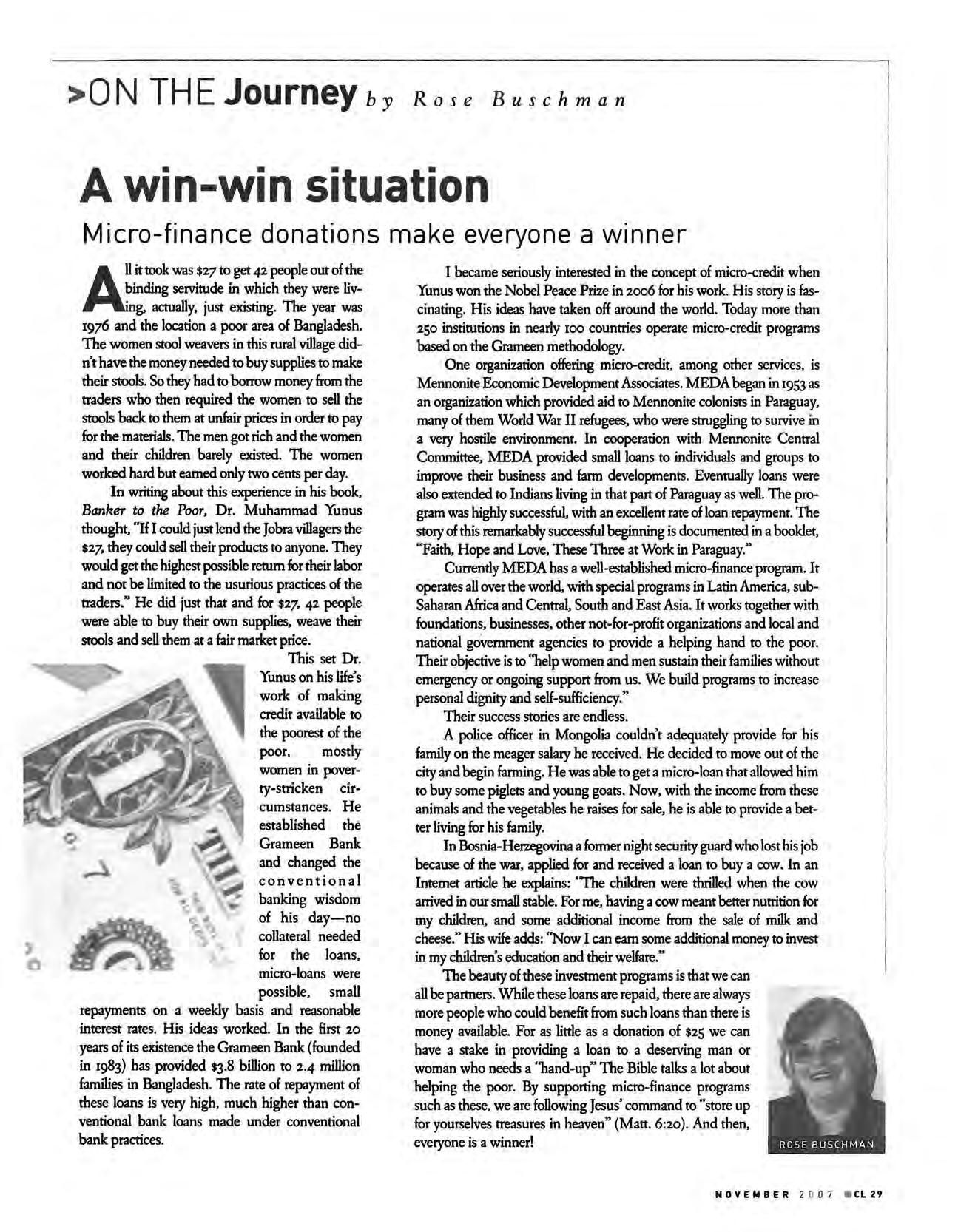
AJ.it took was $27 to get 42 people out of the binding servitude in which they were livg. actually, just existing. The year was 1976 and the location a poor area of Bangladesh. The women stool weavers in this rural village didn't have the money needed to buy supplies to make their stools. So they had to borrow money from the traders who then required the women to sell the stools back to them at unfair prices in order to pay for the materials. The men got rich and the women and their children barely existed. The women worked hard but earned only two cents per day
In writing about this experience in his book, Banker to the POOT, Dr. Muhammad Yunus thought, "If I could just lend the Jobra villagers the $2;7, they could sell their products to anyone. They would get the highest possible return for their labor and not be limited to the usurious practices of the traders." He did just that and for $27, 42 people were able to buy their own supplies, weave their stools and sell them at a fair market price.
This set Dr Yunus on his life's work of making credit available to the poorest of the poor, mostly women in poverty-stricken circumstances. He established the Grameen Bank and changed the conventional banking wisdom of his day-no I collateral needed for the loans, micro-loans were possible, small repayments on a weekly basis and reasonable interest rates. His ideas worked. In the first 20 years of its existence the Grameen Bank (founded in 1983) has provided $3.8 billion to 2.4 million families in Bangladesh. The rate of repayment of these loans is very high, much higher than conventional bank loans made under conventional bank practices.
I became seriously interested in the concept of micro-credit when Yunus won the Nobel Peace Prize in 2006 for his work. His story is fascinating. His ideas have taken off around the world. Today more than 250 institutions in nearly 100 countries operate micro-credit programs based on the Grameen methodology.
One organization offering micro-credit, among other services, is Mennonite Economic Development Associates. MEDA began in 1953 as an organization which provided aid to Mennonite colonists in Paraguay, many of them World War II refugees, who were struggling to survive in a very hostile environment. In cooperation with Mennonite Central Committee, MEDA provided small loans to individuals and groups to improve their business and farm developments. Eventually loans were also extended to Indians living in that part of Paraguay as well. The program was highly successful, with an excellent rate of loan repayment. The story of this remarkably successful beginning is documented in a booklet, "Faith, Hope and Love, These Three at Work in Paraguay."
Currendy MEDA has a well-established micro-finance program. It operates all over the world, with special programs in Latin America, subSaharan Africa and Central, South and East Asia. It works together with foundations, businesses, other not-for-profit organizations and local and national government agencies to provide a helping hand to the poor. Their objective is to 'belp women and men sustain their families without emergency or ongoing support from us. We build programs to increase personal dignity and self-sufficiency."
Their success stories are endless.
A police officer in Mongolia couldn't adequately provide for his family on the meager salary he received. He decided to move out of the city and begin farming. He was able to get a micro-loan that allowed him to buy some piglets and young goats. Now, with the income from these animals and the vegetables he raises for sale, he is able to provide a better living for his family.
In Bosnia-Herzegovina a former night security guard who lost his job because of the war, applied for and received a loan to buy a cow. In an Internet article he explains: 'The children were thrilled when the cow arrived in our small stable. For me, having a cow meant better nutrition for my children, and some additional income from the sale of milk and cheese." His wife adds: ''Now I can earn some additional money to invest in my children's education and their welfare."
The beauty of these investment programs is that we can all be partners. While these loans are repaid, there are always more people who could benefit from such loans than there is money available. For as little as a donation of $25 we can have a stake in providing a loan to a deserving man or woman who needs a 'band-up" The Bible talks a lot about helping the poor. By supporting micro-finance programs such as these, we are following Jesus' command to "store up for yourselves treasures in heaven" (Matt. 6 : 20). And then, everyone is a winner!
Hesston, Kan.-Katie Bair and Makaiya Russell were baptized Sept. 30. Stan and Jennifer Kroeker and Lisa Decker were received as members San Jose, CaUf. (Lincoln Glenl-Leonard and Jean Bartel. Elvira Neufeld and Margaret Wiebe were received as members Sept. 30
Cordell, Okla. (Biblel - Taylor Javorsky and Isaac Merkey were baptized Sept. 26
Olathe, Kan. (Community Biblel-Andrea Awad, Becky Koop. Beth Koop, Melissa Just, Michael Just, Vanessa Longstaff. Jesse Streiff, Alyssa Welborn, Raimund and Kris Guensche and Karl Franz were baptized Sept. 23 and received as members Sept. 30.
Dale and Elli Franz were baptized Sept. 23
Topeka, Kan. (Cornerstone Communityl-Janet Baxa was received as a member Sept. 23. Megan Barkman, Stephanie Kennedy and Kelsey Stanley were baptized and received as members May 6. Penelope Uhl and Travis Strong were received as members July 22.
Bakersfield, Calif. (Laurelglenl-Martha Kay Hilliard was baptized the weekend of Sept. 15-16
Lincoln, Neb. (First Slavicl-Four people were recently baptized and accepted as members of the church.
Fairview, Okla.-Brad and Vi Penner were received as new members Aug 21.
Papillon, Neb. (Shadow Lakel-Women held a "Wild West Great Adventure" fall retreat Nov. 2-3 Guest speaker Barbara Rightler, from Grace Church in Eden Prairie, Minn., was the speaker
Wichita, Kan. (Firstl-A fall block party Oct. 13 included a chili cook-off
Olathe, Kan. (Community Biblel-Men enjoyed a retreat Oct. 12-13
Rapid City, SD (Bible Fellowship)-A one-day men's retreat Oct. 13 included a skeet shoot, food and guest speaker Roger Laufers, a Bible teacher from Iowa. The theme for the day was "Finishing Strong ." Reedley, CaUf.-Senior adults shared displays about their hobbies Sept. 25
Minot, ND (Bible Fellowship)-A hayride was organized for Sept. 23. Women were invited to a salad supper Sept. 27.
Clovis, Calif. (College Communityl- The congregat ion gathered Oct. 28 for a Harvest Banquet that included the celebration of a new hymnal supplement, Sing the Story, a special giving project and a potluck
Weatherford, Okla. (Pine Acresl-Recent activities for men included a tailgate party Oct. 27 with a football focus and a golf tournament with 22 teams participating
Fresno, Calif. (Butler)-A women's retreat was planned for Oct. 5-7
Fresno, Calif. (North Fre snol -M en held a retreat Oct. 5-7
San Jose, Calif. (Lincoln Glenl - A " Decade Party " Sept. 28 celebrated church membe rs born in a year ending in seven
Sioux Falls, SD (Christ Comm unityl - A barbeque and hayride was sch eduled fo r Sept. 16
Draper, Utah (Sou t h Mounta in) - Women mee t twice a mon th for informal fello wsh ip at a local coffee shop.
Sanger, Calif. (Grace Communityl - Se nior adu lts held the ir monthly potluck Sept. 18, with the loca l chief of po li ce and fire chief as guest speakers.
San Jose, Calif. (Blossom Valleyl-Women meet Wednesday mornings for "Thank God It's Wednesday, " a time of encouragement. Members celeb rated the end of summer Sept. 9 with food and a jump house for children.
Manhattan, Kan. (Manhattan Mennonitel - College students were invited to a mea l at the pastors' home Sept. 9
Fairview, Okla -Women held a retreat Sept. 8-9 featuring a Beth Moore st udy and a wo men 's event Oct. 13 included a video study by Beth Moore , a light lunch and mu sic by " Forg iven " from Emmanuel Baptist Church in En id. The j unior and senior high youth prepa red and serve d break fast Oct. 14 to thank the congregation for the ir support
of 16 men and 12 women with Team UERY. a ministry of the Southern District Conference worked the week of Sept. 17 on construction of a social hall and gym at Post Oak MB Church, Indiahoma. Okla . Under the direction of Wayman Penner from Cordell. Okla the team completed drywall installation and taping which a previous U-SERV team had started in January. All drywall walls were textured ceiling joists were installed. and half of the
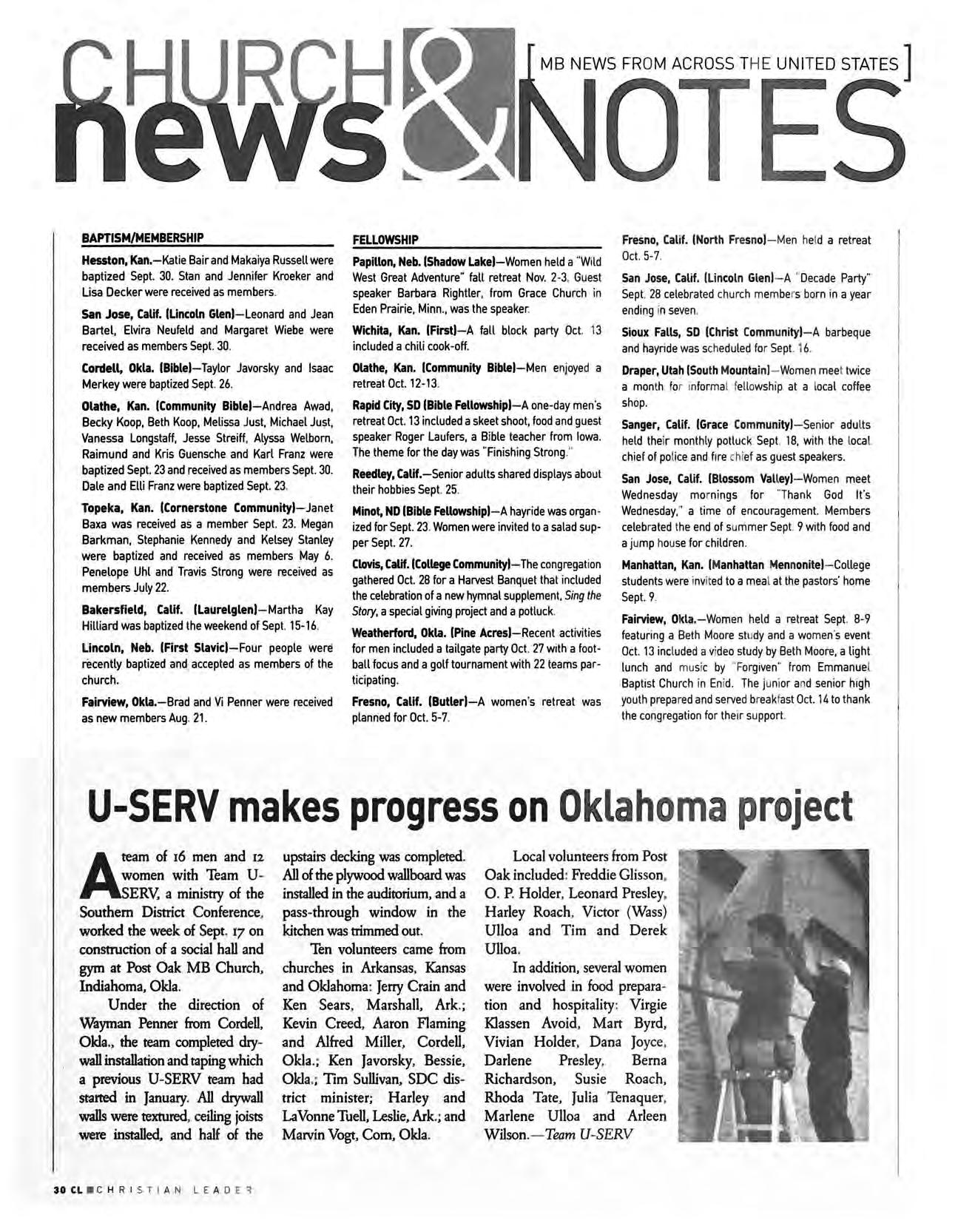
upstairs decking was completed All of the plywood wallboard was installed in the auditorium. and a pass -through window in the kitchen was trimmed out
Ten volunteers came from churches in Arkansas. Kansas and Oklahoma : Jerry Crain and Ken Sears. Marshall. Ark .; Kevin Creed Aaron Flaming and Alfred MiIler. Cordell. Okla .; Ken Javorsky. Bessie. Okla .; TIm Sullivan. SOC district minIster; Harley and LaVonne Tuell. Leslie. Ark.; and Marvin Vogt. Com Okla
Local volunteers from Post Oak included : Freddie Glis son O . P. Holder. Leonard Presley. Harley Roach . Victor (Wass) Ulloa and Tim and Derek Ulloa
In addition. several women were involved in food preparation and hospitality : Virgie Klassen Avoid Mart Byrd. Vivian Holder Dana Jo yce. Darlene Presley Bema Richard son. Susie Roa ch Rhoda Tate. Julia Tenaqu er. Marlene UlIoa and Arleen Wilson .-Team U - SERV
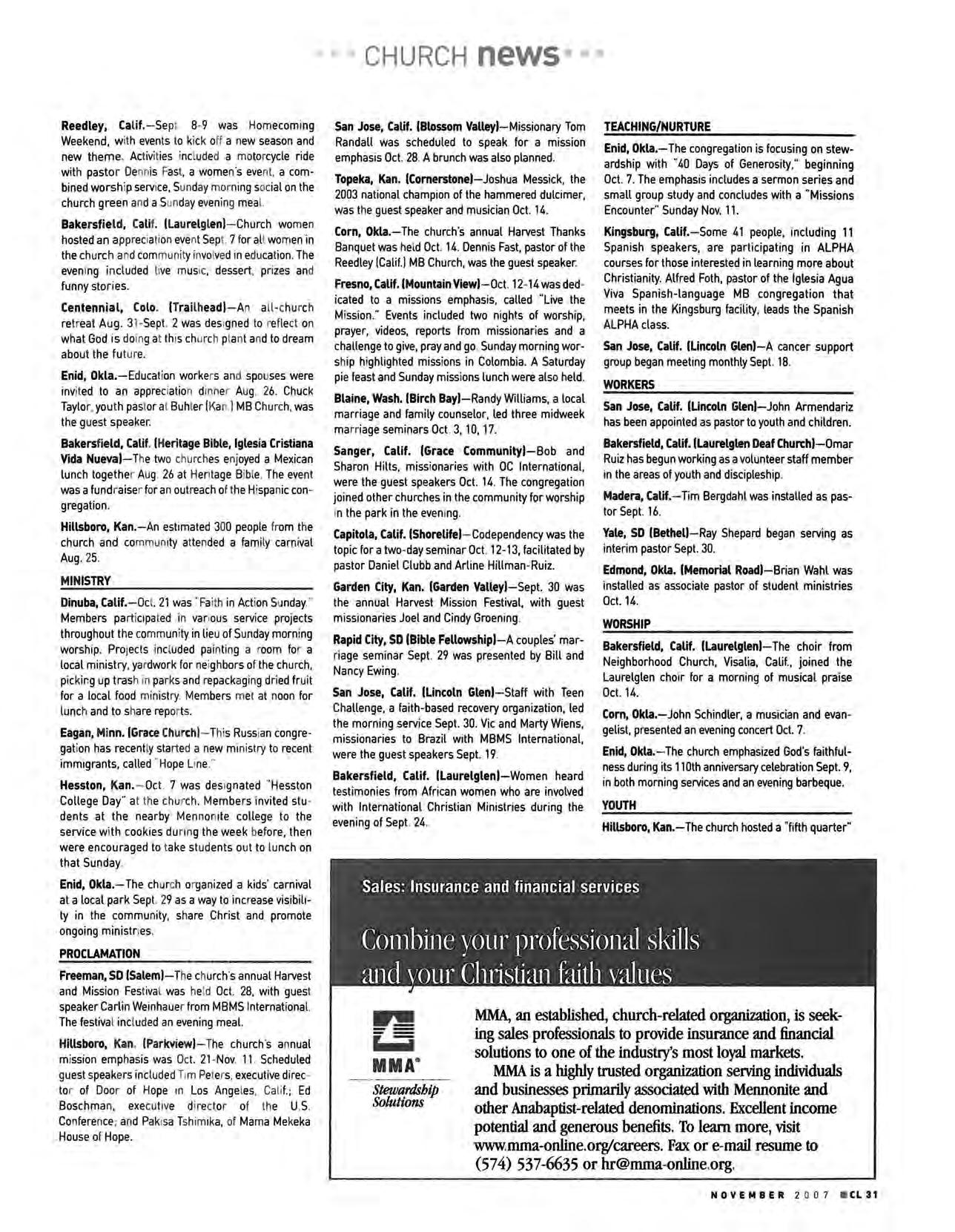
Reedley, Calif. - Se pt. 8- 9 was Homecom ing Weekend. wit h even ts to kick off a new season and new theme. Ac t ivit ies includ ed a mo to rcycle ride wit h pasto r Denn is Fast . a wome n' s eve nt. a combined worsh ip serv ice. Sunday morni ng social on the chu rch green and a Sunday even ing mea l.
Baker sfie ld , Calif (Laurel glen) - Church wo men hosted an apprec iati on eve nt Sep t. 7 for al l wo men in the chu rc h and com mun ity invo lved in edu ca tion The even ing in cl ud ed live mus ic dessert prizes an d funny stori es
Centenn i a l , Colo (Tra ilh ead)-A n all - church ret reat Aug. 31- Sept 2 was des igned to refl ect on what God i s doing at th is ch urch pl ant and to dream about the fu t ure
Enid, Okla.-E ducat ion worke r s and sp ou ses were invited to an apprec iatio n din ner Aug 26 Chuc k Taylo r you t h pas tor at Buh ler [Kan. 1MB Churc h was the guest speaker.
Bakersfi eld, Calif (Heritage Bible, Iglesi a Cristiana Vida Nueva)- The tw o church es enj oyed a Mexican lunch togethe r Aug 26 at Her itage Bibl e The eve nt was a fund r aise r for an out reach of t he Hispa nic congregation.
Hillsboro, Kan.-An estimated 300 people from the church and co mmuni ty att ended a fami ly carn ival Aug . 25
Dinuba, CaUf. -O ct. 21 was "Fait h in Act ion Sunday." Members pa rt icipa ted in var ious service projects throughout t he comm un ity in lie u oi Sunday morn ing worship. Proj ect s included pai nti ng a ro om fo r a local mi nist ry. yardwork for neighbo r s of the ch urch. pic king up tras h in pa r ks and repack agin g dri ed fr ui t for a local food min ist ry Members met at noon for l unch and to share rep orts
Eagan, Minn (Grace Church) - Thi s Russ ian congregat ion has recen tly sta rt ed a new mi ni stry to recent immigrants. called " Hope Lin e " Hesston, Kan. - Oc t. 7 was des ignated " Hesston College Day" at th e chu rch Members invited students at the nea r by Menn onite college to the service wi th cookies du r ing the week before. then were encouraged to t ake st ud ents out to lu nch on that Sunday
Enid, Okla.-The ch urch orga nized a kids' carnival at a local park Sept. 29 as a way to inc rease visibility in the commu nity, share Christ and promote ongoing ministries
Freeman, SD (Salem)- The church 's annual Harvest and Mission Fest iva l was hel d Oct. 28, with guest speaker Carlin We inhaue r from MBMS Internat iona l. The festiva l in cl uded an evening meal.
Hillsboro, Kan (Par kv iew) -The church 's annual missio n emphasis was Oc t. 21 - Nov 11 Scheduled gu est speak ers includ ed Tim Peters, executive directo r of Door of Hope in Los Ange l es Ca l if.; Ed Boschma n exe cutiv e direct or of th e U.s Co nfere nce ; and Pak isa Tshim ika, of Ma ma Me keka House of Hope
San Jose, Calif. (Blossom Valley)-Missionary Tom Randall was scheduled to speak for a mission emphasis Oct. 28 A brunch was also planned Topeka, Kan. (Comerstone)-Joshua Messick , the 2003 national champion of the hammered dulcimer. was the guest speaker and musician Oct. 14.
Corn, Okla.-The church's annual Harvest Thanks Banquet was he l d Oct. 14 Dennis Fast, pastor of the Reedley [Calif.J MB Chu rc h. was the guest speaker. Fresno, Calif. (Mountain View) - Oct. 12- 14 was dedicated to a missions emphasis , called " Live the Mission " Events included two nigh ts of worship. prayer, videos, reports from missionaries and a challenge to give. pray and go Sunday morning worship highlighted missions in Colombia A Saturday pie feast and Sunday missions lunch were also held Blaine, Wash. (Birch Bay)-Randy Williams. a local marriage and family counselor led three midweek ma rr iage seminars Oct. 3. 10. 17.
Sanger, Calif. (Grace Community)-Bob and Sharon Hilts. miss ionaries with DC International. were the guest speakers Oct. 14 The congregation joined other churches in the community for worship in the park in the even ing
Capitola, Calif. (Shorelife) - Codependency was the topic for a two - day seminar Oct 12-13, facilitated by pastor Daniel Clubb and Arline Hillman - Ruiz
Garden City, Kan. (Garden Valley)-Sept. 30 was the annual Harvest Mission Festival, with guest missionaries Joel and Cindy Groening
Rapid City, SD (Bible Fellowship)-A couples' marr iage seminar Sept. 29 was presented by Bill and Nancy Ewing
San Jose, Calif. (Lincoln Glen) - Staff with Teen Challenge, a faith-based recovery organization, led the morning service Sept. 30. Vic and Marty Wiens, missionaries to Brazil with MBMS International, were the guest speakers Sept. 19
Bakersfield, Calif. (Laurelglen)-Women heard testimonies from African women who are involved with International Christian Ministries during the evening of Sept. 24
Enid, Okla.-The congregation is focusing on stewardship with "40 Days of Generosity," beginning Oct. 7. The emphasis includes a sermon series and small group study and concludes with a "Missions Encounter" Sunday Nov. 11.
Kingsburg, Calif.-Some 41 people, including 11 Spanish speakers, are participating in ALPHA courses for those interested in learning more about Christianity Alfred Foth, pastor of the Iglesia Agua Viva Spanish-language MB congregation that meets in the Kingsburg facility , leads the Spanish ALPHA class.
San Jose, Calif. (Lincoln Glen)-A cancer support group began meeting monthly Sept. 18
San Jose, Calif. (Lincoln Glen)-John Armendariz has been appointed as pastor to youth and children.
Bakersfield, Calif. (Laurelglen Deaf Chul'th)-Omar Ruiz has begun working as a volunteer staff member in the areas of youth and discipleship
Madera, Calif. - Tim Bergdahl was installed as pastor Sept. 16
Yale, SD (Bethell-Ray Shepard began serving as interim pastor Sept. 30
Edmond, Okla. (Memorial Road)-Brian Wahl was installed as associate pastor of student ministries Oct. 14
Bakersfield, CaUf. (Laurelglen)- The choir from Neighborhood Church, Visalia, Calif , joined the Laurelglen cho ir for a morning of musical praise Oct. 14.
Corn, Okla.-John Schindler, a musician and evangelist, presented an evening concert Oct. 7
Enid, Okla. - The church emphasized God 's faithfulness during its 110th anniversary celebration Sept. 9, in both morning services and an evening barbeque.
Hillsboro, Kan.- The church hosted a "fifth quarter"
MMA, an established, church-related organization, is seeking sales professiOnals to provide insurance and financial solutions to one of the industry's most loyal markets.
MMA is a highly trusted organization serving individuals and businesses primarily associated with Mennonite and other Anabaptist-related denominations. Excellent income potential and generous benefits. To learn more, visit www mma-online.orglcareers. Fax or e-mail resume to (574) 537-6635 or hr@mma-online org
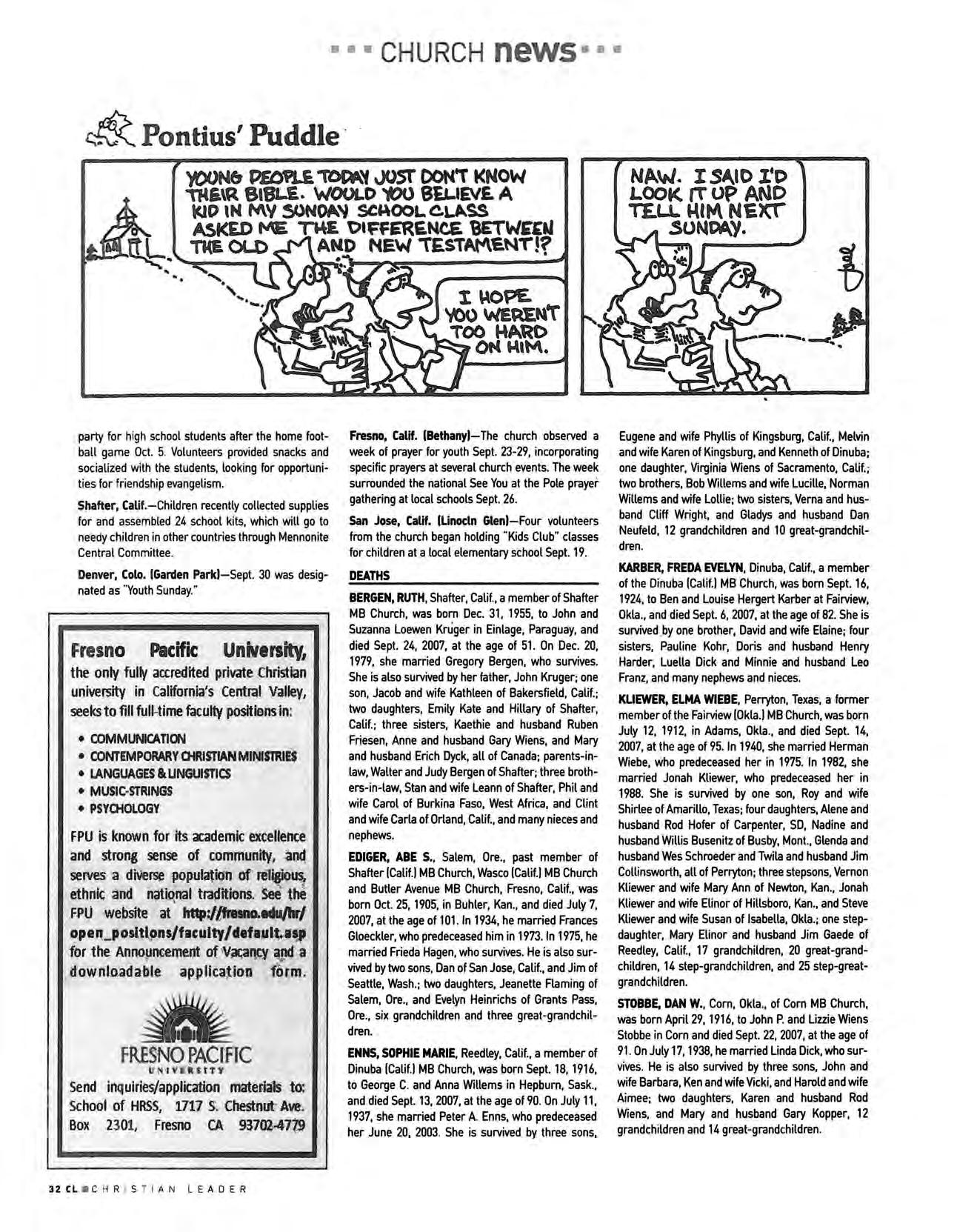
party for high schooL students afte r the home footbaLL game Oct. 5 VoLunteers provided snacks and socialized with the students, Look ing for opportunit ies for f riendship evangeLism
Shaft er, Ca Uf -ChiLdren recently collected suppLies for and assembLed 24 schooL kits, wh ich wiLL go to needy chiLdren in other coun tries through Mennonite CentraL Com mittee
Denve r , Colo. (Garden Parld-Sept. 30 was designated as "Youth Sunday."
Fresno Pacific University,
the only fully accredited private Christian in California's Central Valley, seeks to fill full -time faculty positiens in:
• COMMUNICATlOII
• CONTEMPORARY CHRlSrrAN MINISTRIE$
• LANGUAGES &UNGUlmcs
• MUSIC STRINGS
• PSYCHOLOGY
FPU is known for its academic extellente and strong sense of community, .100 serves a dl\1erse popul;Jtioll of ethnic and traditions.. see too FPU we bsite at htttnllfrewu./tw/ ' ·
for the AnnopnGemerrt of a downlD,adable fOrm .
FRESNO PACrFTC
UN1VllillstTY
Send inquiries/application Materials to:
School of HRSS, 1717 S. Chestnut Ave. Box 2301, Fresno CA
Fresno, Calif, (Bethany)- The church observed a week of prayer for youth Sept. 23-29, incorporating specific prayers at severaL church events The week surrounded the nationaL See You at the PoLe prayer gathering at LocaL schooLs Sept. 26.
San Jose, Calif, (Linocln Glen)-Four voLunteers from the church began hoLding "Kids CLub" classes for chiLdren at a LocaL eLementary schooL Sept. 19.
DEATHS
BERGEN, RUTH , Shafter, Calif , a member of Shafter MB Church , was born Dec 31, 1955, to John and Suzanna Loewen Kruger in EinLage, Paraguay, and died Sept. 24, 2007, at the age of 51. On Dec. 20, 1979, she married Gregory Bergen, who survives She is also survived by her father, John Kruger; one son, Jacob and wife Kathleen of Bakersfield, CaLif. ; two daughters, Emily Kate and Hillary of Shafter, Calif.; three sisters, Kaethie and husband Ruben Friesen, Anne and husband Gary Wiens, and Mary and husband Erich Dyck, aLL of Canada; parents-inlaw, Walter and Judy Bergen of Shafter; three brothers-in-law, Stan and wife Leann of Shafter, PhiL and wife CaroL of Burkina Faso, West Africa, and Clint and wife Carla of Orland , Calif., and many nieces and nephews.
EDIGER, ABE S., Salem, Ore , past member of Shafter (Calif.) MB Church, Wasco (Calif.! MB Church and Butler Avenue MB Church, Fresno, Calif., was born Oct. 25, 1905, in Buhler, Kan , and died July 7, 2007, at the age of 101.ln 1934, he married Frances GloeckLer, who predeceased him in 1973. In 1975, he married Frieda Hagen, who survives. He is also survived by two sons, Dan of San Jose, Calif., and Jim of Seattle, Wash.; two daughters, Jeanette Flaming of Salem, Ore. , and Evelyn Heinrichs of Grants Pass, Ore , six grandchildren and three great -grandchildren.
ENNS, SOPHIE MARIE, Reedley, Calif., a member of Dinuba (CaLif.! MB Church, was born Sept. 18, 1916, to George C and Anna Willems in Hepburn, Sask , and died Sept. 13, 2007, at the age of 90 On JuLy 11 , 1937, she married Peter A. Enns, who predeceased her June 20, 2003 She is survived by three sons,
NAW. I S"'O 1.'0 LOOK IT OP AND TEU. HIM N£XT' SONOAY·
Eugene and wife Phyllis of Kingsburg, Calif , Melvin and wife Karen of Kingsburg, and Kenneth of Dinuba; one daughter, Virginia Wiens of Sacramento, Calif.; two brothers, Bob Willems and wife Lucille, Norman Willems and wife LoLlie; two sisters, Verna and husband Cliff Wright, and Gladys and husband Dan Neufeld, 12 grandchildren and 10 great-grandchildren.
KAR BER, FREDA EVELYN, Dinuba, Calif , a member of the Dinuba (Calif.! MB Church, was born Sept. 16, 1924, to Ben and Louise Hergert Karber at Fairview, Okla., and died Sept. 6, 2007, at the age of 82. She is survived ,by one brother, David and wife Elaine; four sisters, Pauline Kohr, Doris and husband Henry Harder, Luella Dick and Minnie and husband Leo Franz, and many nephews and nieces.
KLIEWER, ELMA WIEBE, Perryton, Texas, a former member of the Fairview (Okla ) MB Church, was born July 12, 1912, in Adams, Okla , and died Sept. 14, 2007, at the age of 95. In 1940, she married Herman Wiebe, who predeceased her in 1975. In 1982, she married Jonah Kliewer, who predeceased her in 1988 She is survived by one son, Roy and wife Shirlee of Amarillo , Texas; four daughters, ALene and husband Rod Hofer of Carpenter, SO, Nadine and husband Willis Busenitz of Busby, Mon t. , Glenda and husband Wes Schroeder and Twila and husband Jim Collinsworth, all of Perryton; three stepsons , Vernon Kliewer and wife Mary Ann of Newton, Kan., Jonah Kliewer and wife ELinor of Hillsboro, Kan., and Steve Kliewer and wife Susan of Isabella, Okla.; one stepdaughter, Mary Elinor and husband Jim Gaede of Reedley, Calif., 17 grandchildren, 20 great -grandchildren, 14 step-grandchildren, and 25 step-greatgrandchildren.
STOBBE, DAN W., Corn, Okla , of Corn MB Church, was born April 29, 1916, to John P and Lizzie Wiens Stobbe in Corn and died Sept. 22, 2007, at the age of 91. On July 17,1938, he married Linda Dick, who survives He is also survived by three sons, John and wife Barbara, Ken and wife Vicki, and Harold and wife Aimee; two daughters, Karen and husband Rod Wiens, and Mary and husband Gary Kopper, 12 grandch ildren and 14 great-grand children
Lately I've been surprised by several pop songs that have made their way into 1V commercials. These are tunes by bands I thought would never allow their stuff to be used for peddling consumer products. I guess I shouldn't be surprised. A few months ago I heard one famous musician say that getting songs into 1V ads is no longer thought of as selling out.
Maybe it isn't considered selling out by some people, but I don't
\Ve
each W,lnt to b e known as unique dift er·-·
ent. But we als o w..lnt to fit in ;clnd be accepted .
how human beings are both "one" and "many." All of us are flawed and broken and come up short of God's perfection. All are accepted and loved by Jesus and can find healing and wholeness in his grace. At the same time we are each unique in our personalities and makeup and are uniquely talented for certain life callings and acts of selVice. We are each cherished as personal friends and followers of Jesus. like ,it. I realize rock groups are just trying to make music people like and thus don't mind making money. But most of the better bands used to frown upon the use of their songs for advertising. Not anymore. There are big profits to be found in commercial tie-ins It's anoth-
er sad reminder how thoroughly materialism has obliterated the competition for the minds and hearts of the American people.
But hey, it's just pop music. At times I probably get too serious about my musical tastes At least my wife thinks so. It annoys her when I wrinkle my nose as she flips to the oldies, er, I mean classic hits radio station. I don't blame her. When people are critical of the music I like it bugs me too.
I think I'm mellowing as the years go by, though. Some of the bands I used to trash when I was younger don't irritate me as much as they used to. And if someone's musical tastes are different than mine, who cares? It shouldn't divide us.
Coming from that perspective, it's interesting to watch my kids get in occasional arguments about music. It reminds me of my own teenage contentiousness. A while ago I witnessed one of these arguments and wondered if a fatherly lecture was in order. I decided not. Obviously kids these days can get into bad music that emphasizes all the wrong things. But as long as the content is decent, let 'em debate about songs and bands with their peers. Figuring out one's creative tastes is just a natural part of growing up.
One reason I had Strong musical opinions as a teen was pretty standard: I wanted to assert my individuality. It's part of the human dilemma. We each want to be known as unique and different. But we also want to fit in and be accepted. Though these urges are especially strong in young people, they are feelings all of us carry our entire lives.
The dilemma doesn't go away for people of faith. The Bible mentions both sides of the story. "I am fearfully and wonderfully made," says the psalmist, celebrating his uniquely created personality and attributes (139:14). ''You are all one in Christ Jesus," writes the apostle Paul, explaining how salvation erases the distinctions between nationalities, genders, classes and so on (Gal. 3:28).
I think we Christians generally understand
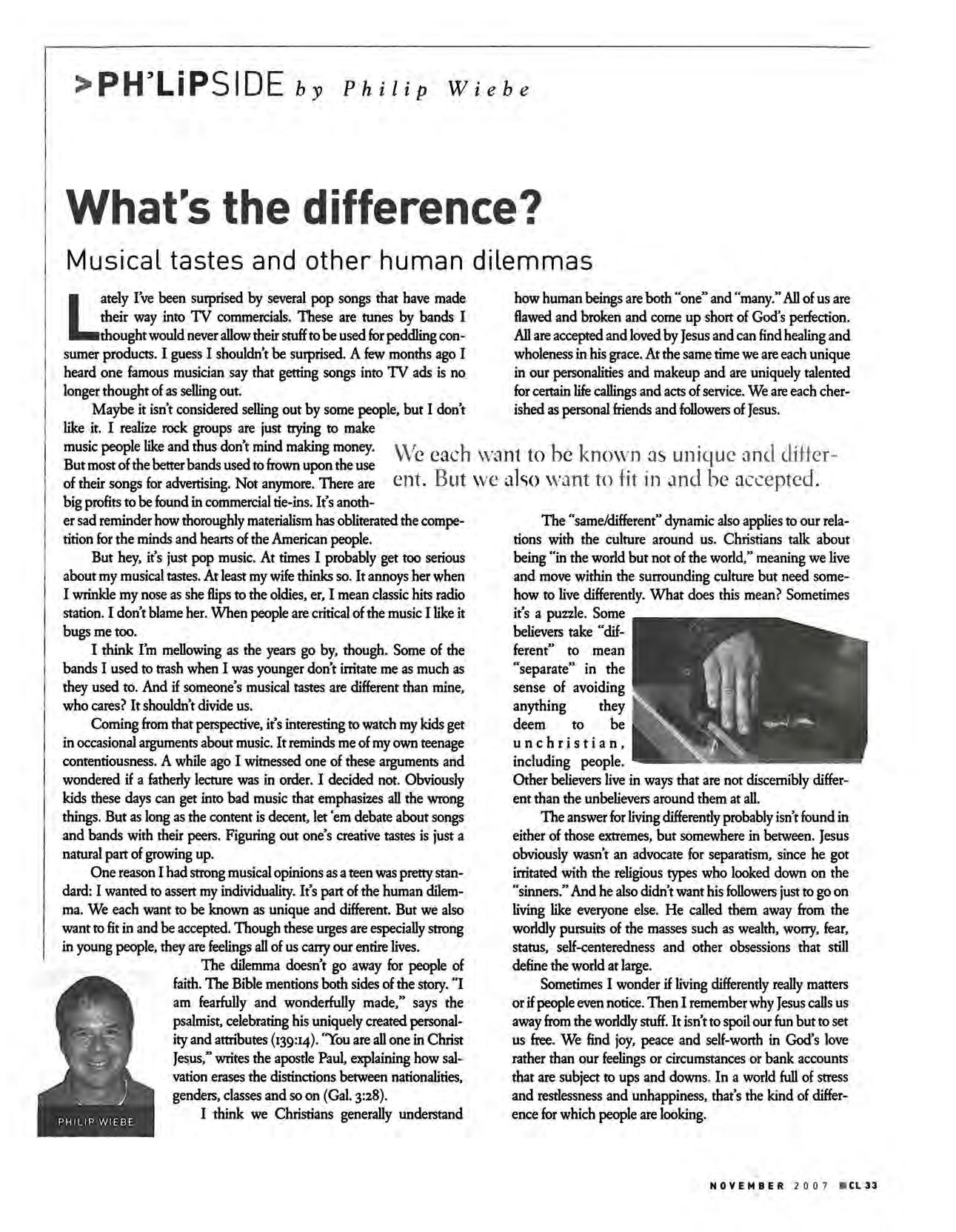
The "same/different" dynamic also applies to our relations with the culture around us. Christians talk about being "in the world but not of the world," meaning we live and move within the surrounding culture but need somehow to live differently. What does this mean? Sometimes it's a puzzle. Some believers take "different" to mean "separate" in the sense of avoiding anything they deem to be unchristian, including people.
Other believers live in ways that are not discernibly different than the unbelievers around them at all.
The answer for living differently probably isn't found in either of those extremes, but somewhere in between. Jesus obviously wasn't an advocate for separatism, since he got irritated with the religious types who looked down on the "sinners." And he also didn't want his followers just to go on living like everyone else. He called them away from the worldly pursuits of the masses such as wealth, worry, fear, status, self-centeredness and other obsessions that still define the world at large.
Sometimes I wonder if living differently really matters or if people even notice. Then I remember why Jesus calls us away from the worldly stuff. It isn't to spoil our fun but to set us free. We find joy, peace and self-worth in God's love rather than our feelings or circumstances or bank accounts that are subject to ups and downs . In a world full of sttess and restlessness and unhappiness, that's the kind of difference for which people are looking.
This month I intend to be thankful for nothing. I have to credit my pastor with this idea. In a Thanksgiving eve meditation more than a decade ago, he invited us to think about the many things that could go wrong, the things that could happen-but don't. Our pastor suggested that we thank God for the "nothings" in our lives.
At the time, my husband and I were relatively new parents and I found lots of things to worry about-a plethora of things that before I
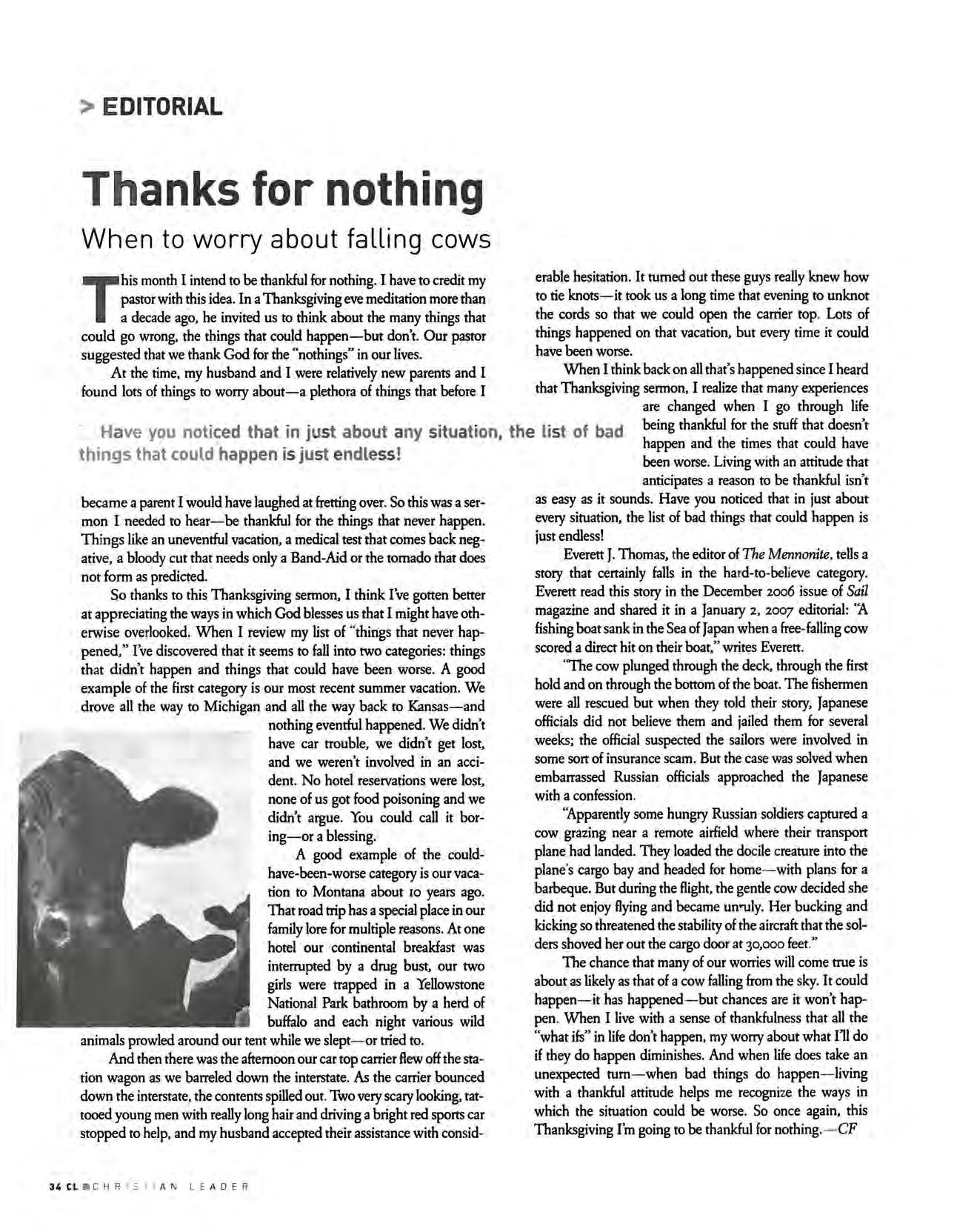
erable hesitation. It turned out these guys really knew how to tie knots-it took us a long time that evening to unknot the cords so that we could open the carrier top Lots of things happened on that vacation, but every time it could have been worse.
When I think back on all that's happened since I heard that Thanksgiving sermon, I realize that many experie nces are changed when I go through life
Have you not iced that in just about any sit uation, th e li st of bad things that could happen is ju st endless !
being thankful for the stuff that doesn't happen and the times that could have been worse. Living with an attitude that anticipates a reason to be thankful isn't became a parent I would have laughed at fretting over. So this was a sermon I needed to hear-be thankful for the things that never happen. Th ings like an uneventful vacation, a medical test that comes back negative, a bloody cut that needs only a Band-Aid or the tornado that does not form as predicted.
So thanks to this Thanksgiving sermon, I think I've gotten better at appreciating the ways in which God blesses us that I might have otherwise overlooked. When I review my list of "things that never happened," I've discovered that it seems to fall into two categories: things th at didn't happen and things that could have been worse. A good example of the first category is our most recent summer vacation. We drove all the way to Michigan and all the way back to Kansas-and nothing eventful happened. We didn't have car trouble, we didn't get lost, and we weren't involved in an accident. No hotel reservations were lost, none of us got food poisoning and we didn't argue. You could call it boring-or a blessing.
A good example of the couldhave-been-worse category is our vacation to Montana about 10 years ago. That road trip has a special place in our family lore for multiple reasons. At one hotel our continental breakfast was interrupted by a drug bust, our two girls were trapped in a Yellowstone National Park bathroom by a herd of buffalo and each night various wild animals prowled around our tent while we slept- or tried to.
And then there was the afternoon our car top carrier flew off the station wagon as we barreled down the interstate. As the carrier bounced down the interstate, the contents spilled out. Two very scary looking, tattooed young men with really long hair and driving a bright red sports car stopped to help, and my husband accepted their assistance with consid -
as easy as it sounds. Have you noticed that in just about every situation, the list of bad things that could happen is just endless!
Everett J. Thomas, the editor of The Mennonite , tells a story that certainly falls in the ha rd-to -believe category. Everett read this story in the December 2006 issue of Sail magazine and shared it in a January 2, 2007 editorial: "A fishing boat sank in the Sea of Japan when a free -falling cow scored a direct hit on their boat," writes Everett.
'The cow plunged through the deck, through the first hold and on through the bottom of the boat. The fishermen were all rescued but when they told their story, Japanese officials did not believe them and jailed them for several weeks; the official suspected the sailors were involved in some sort of insurance scam. But the case was solved when embarrassed Russian officials approached the Japanese with a confession
'i\pparently some hungry Russian soldiers captured a cow grazing near a remote airfield where their transport plane had landed. They loaded the docile creature into the plane's cargo bay and headed for home - with plans for a barbeque. But during the flight, the gentle cow decided she did not enjoy flying and became unmly. Her bucking and kicking so threatened the stability of the aircraft that the solders shoved her out the cargo door at 30,000 feet ."
The chance that many of our worries will come true is about as likely as that of a cow falling ftom the sky. It could happen-it has happened - but chances are it won't happen When I live with a sense of thankfulness that all the "what ifs" in life don't happen, my worry about what 111 do if they do happen diminishes. And when life does take an unexpected tum - when bad things do happen - living with a thankful attitude helps me recognize the ways in which the situation could be worse. So on ce again, this Thanksgiving I'm going to be thankful for nothing. - CF
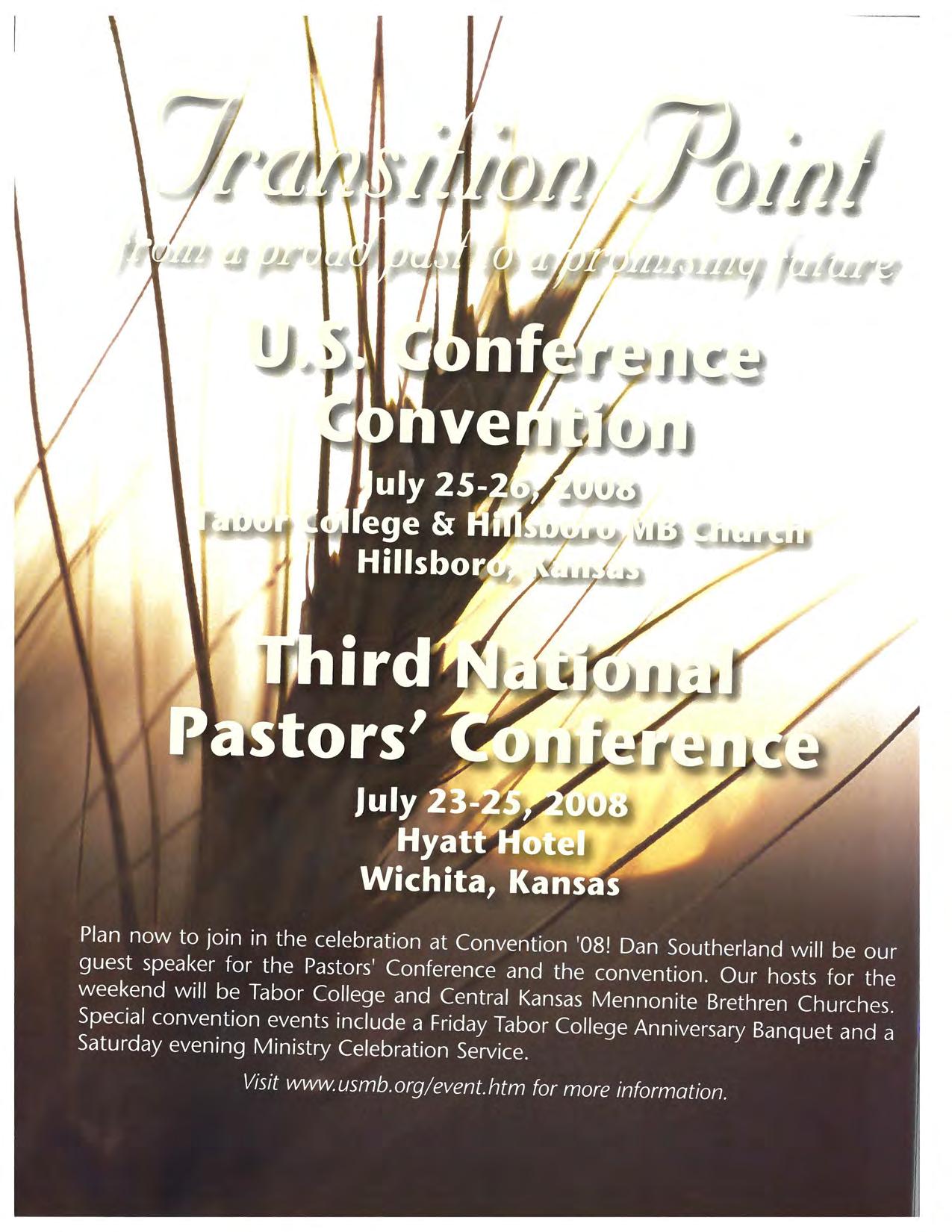
Be a part of o ver 700 investors who have joined together to integrate their spiritual values with their invesnnent decisions. They earn a competitive return on their funds while allowing their funds to be loaned out to churches for ministry expansion. This reinvestment of funds is then transformed into changed lives as local churches are equipped and energized to make disciples!

So, we invite you to consider investing with MB Loan Fund. It's a decision that will transform many lives and directly impact the Kingdom. Contact us today for more information.
www.mbfoundation.com info@mbfoundation.com 800 - 551 - 1547